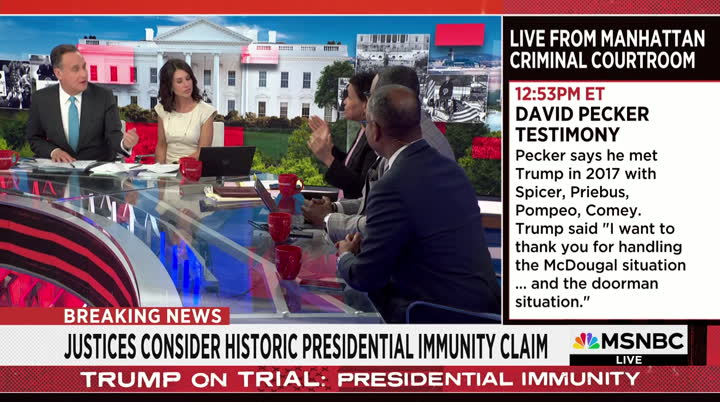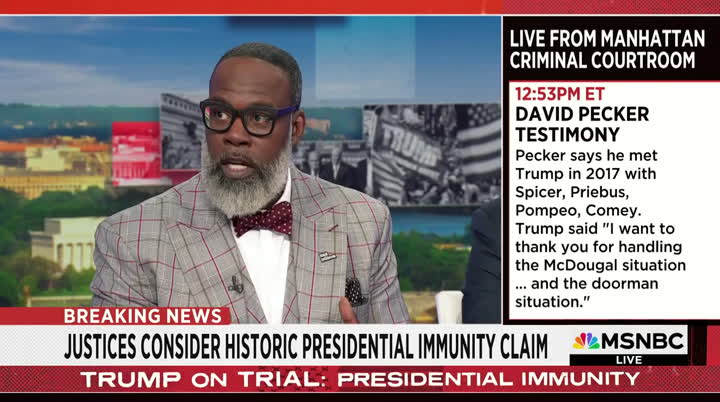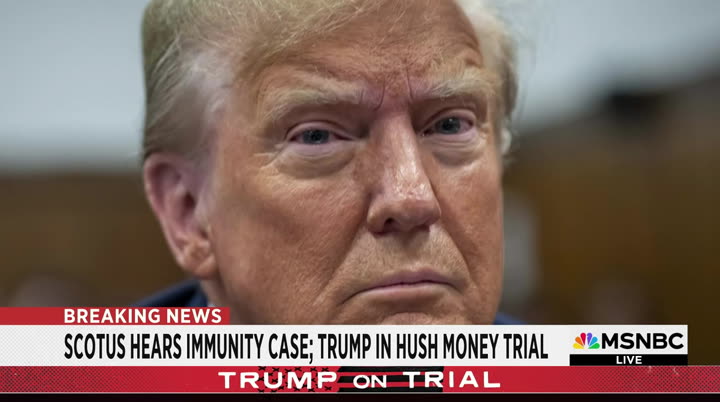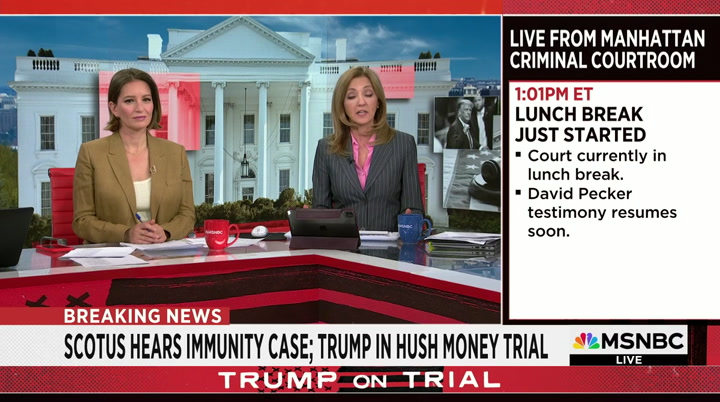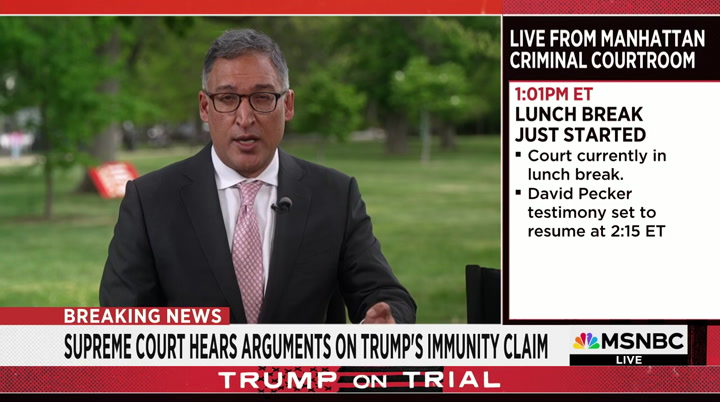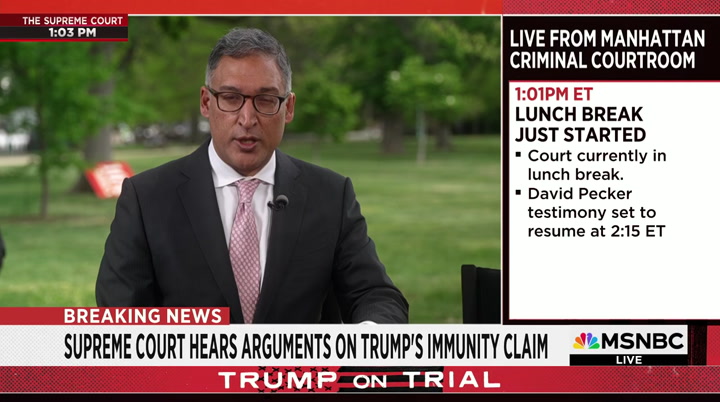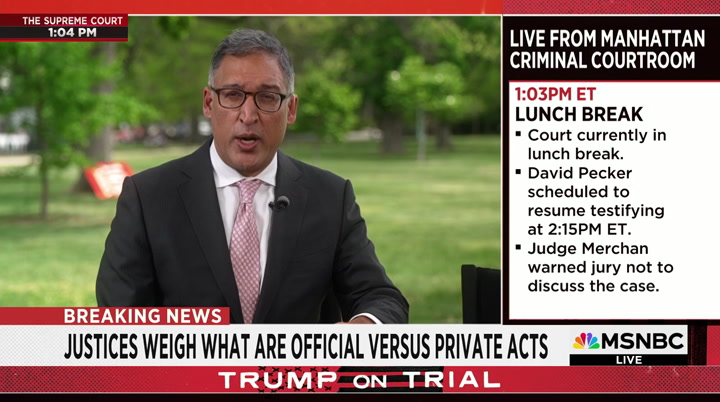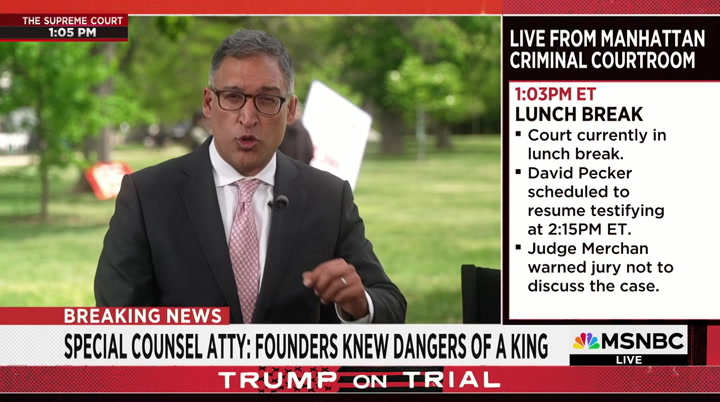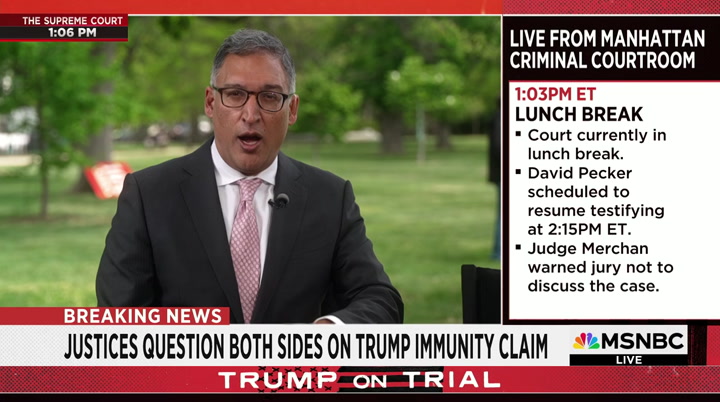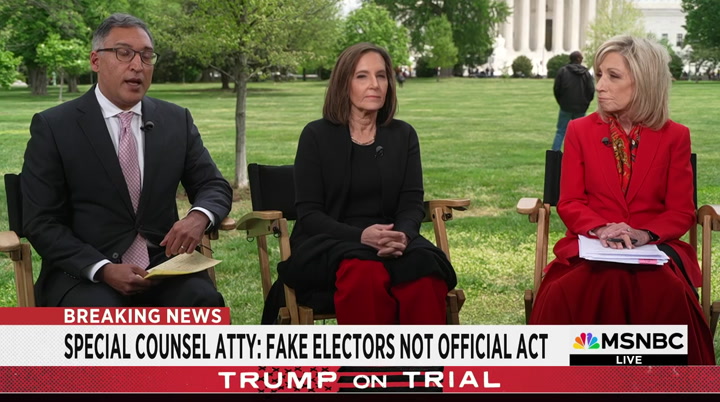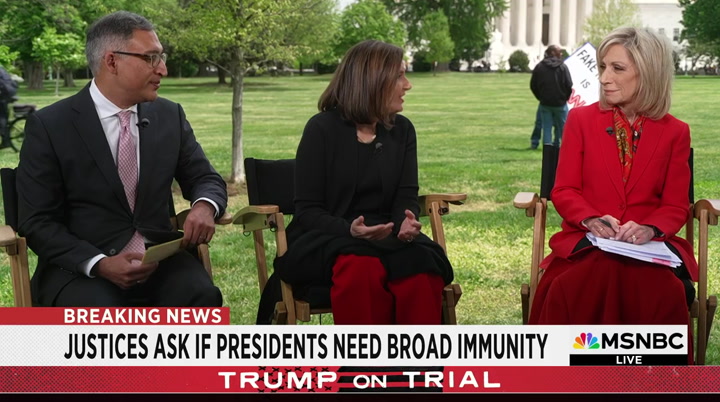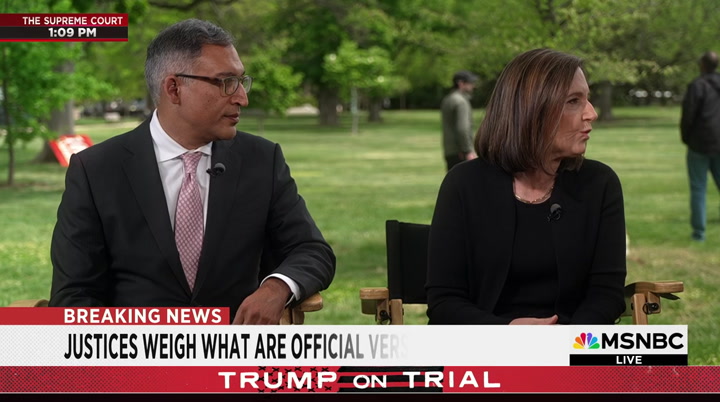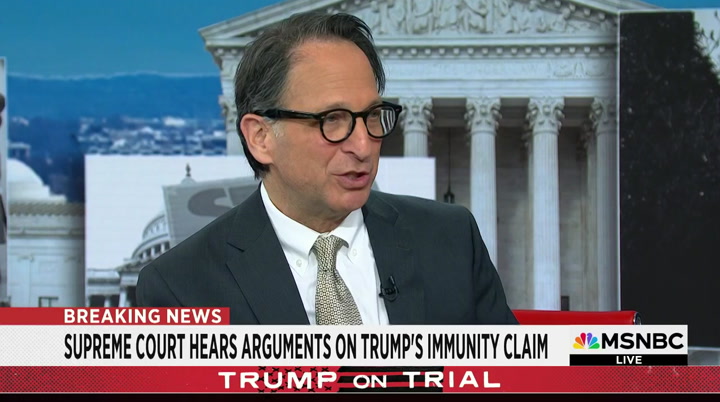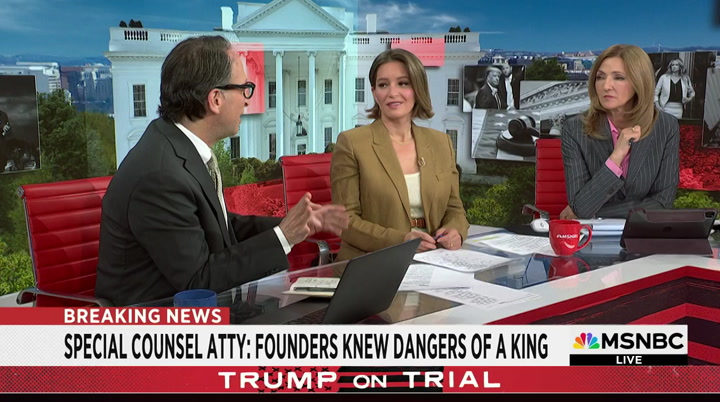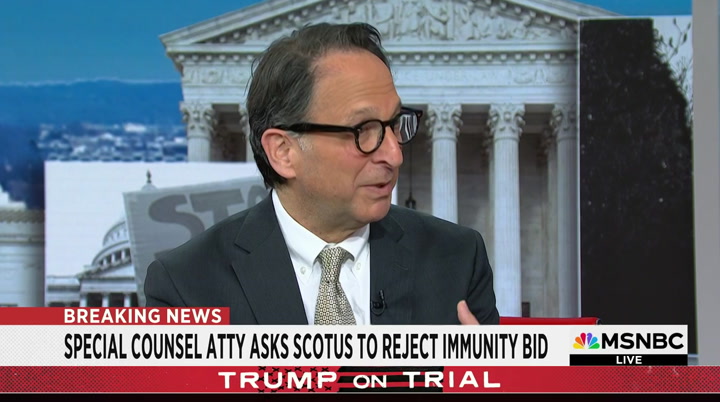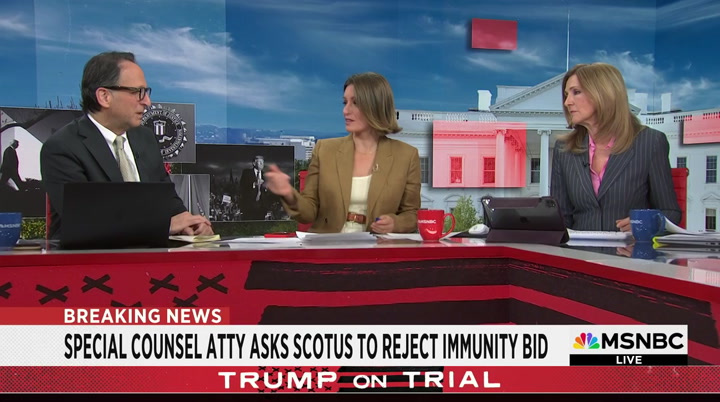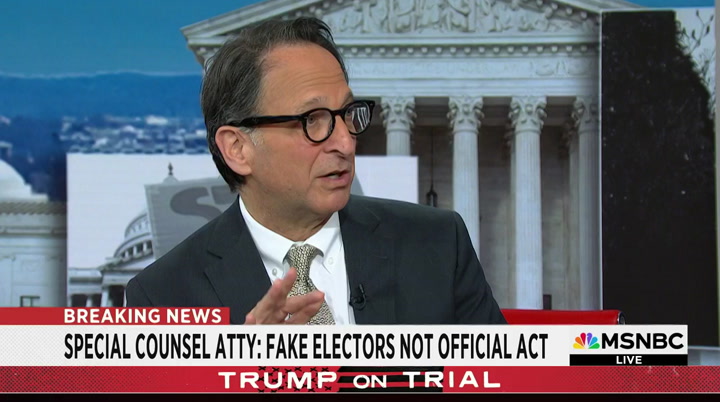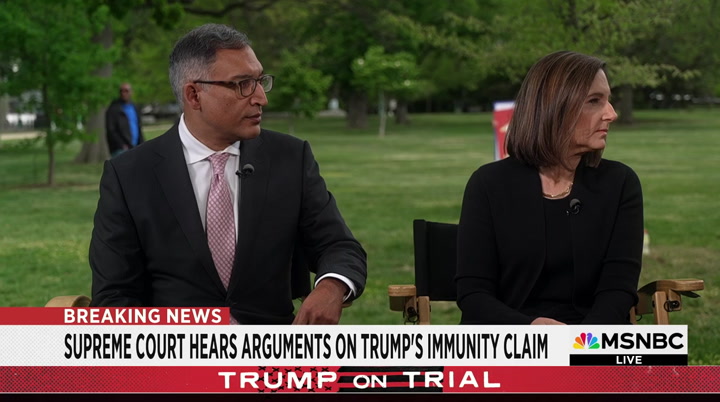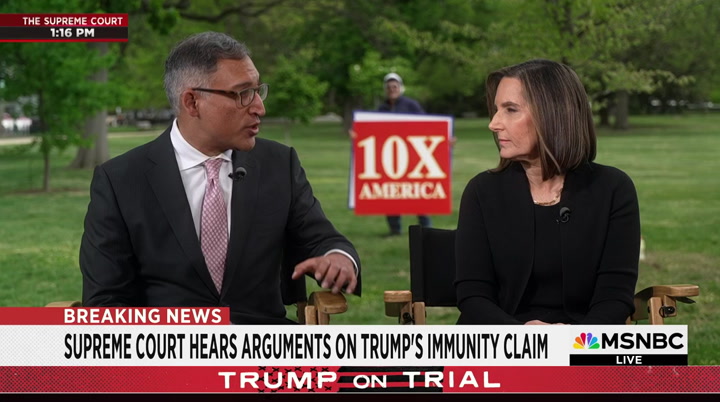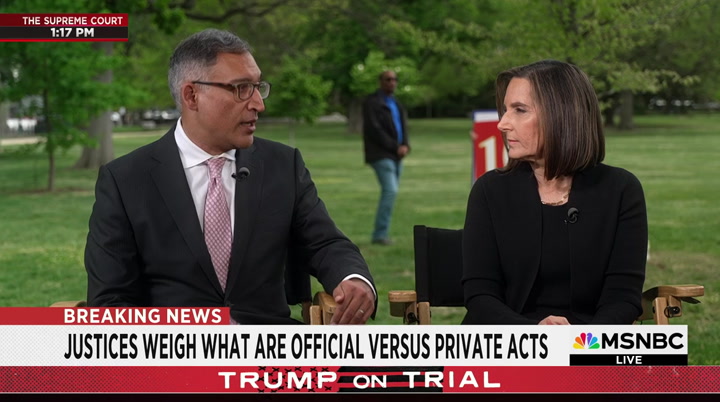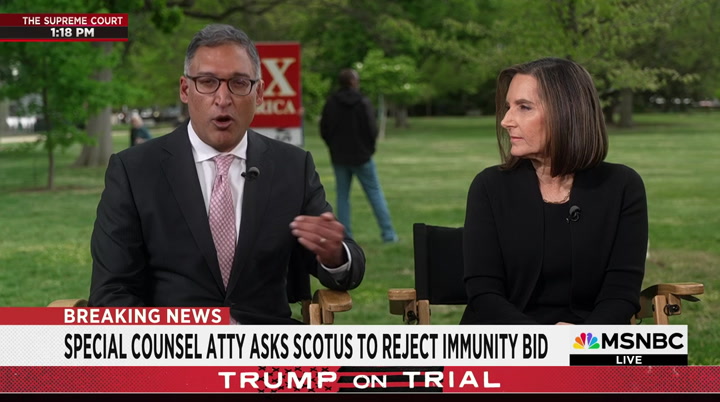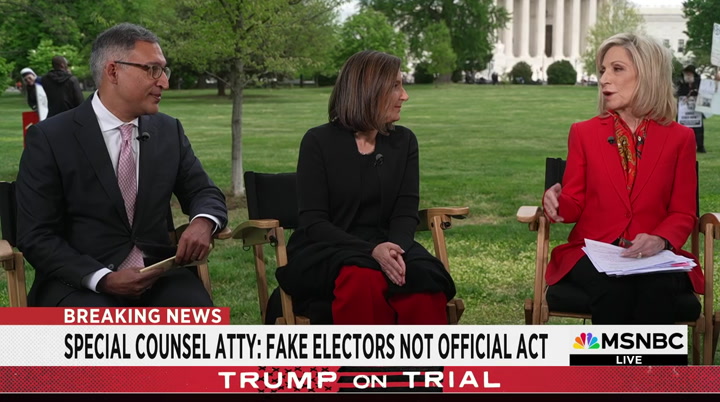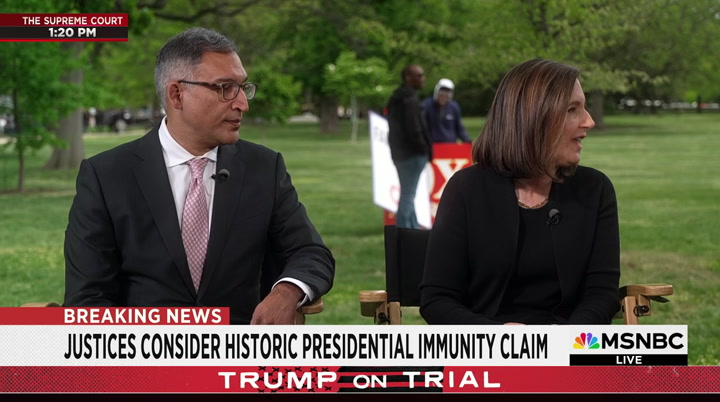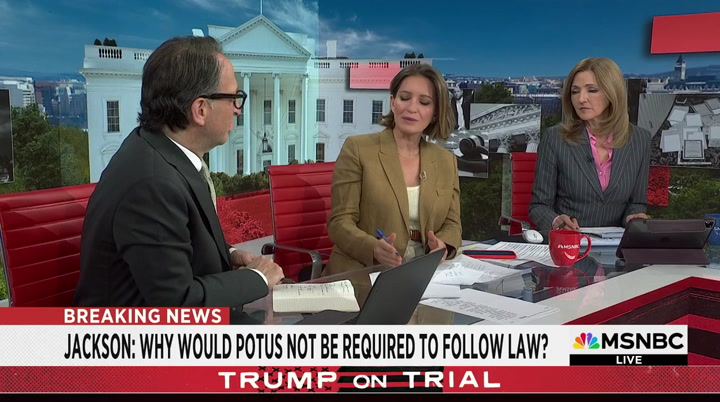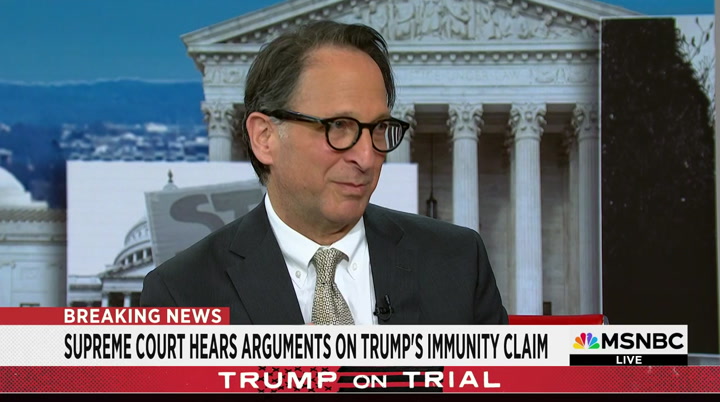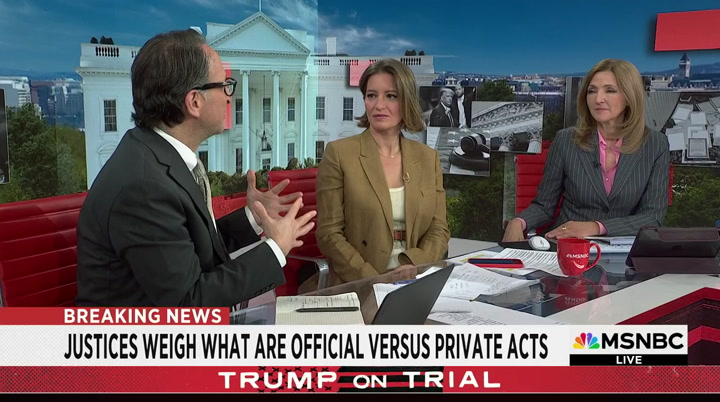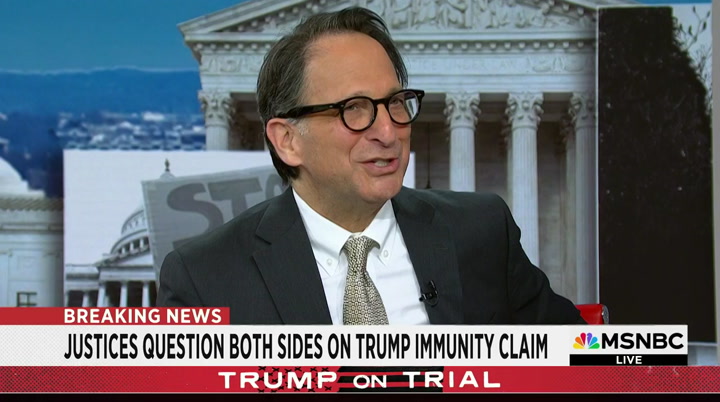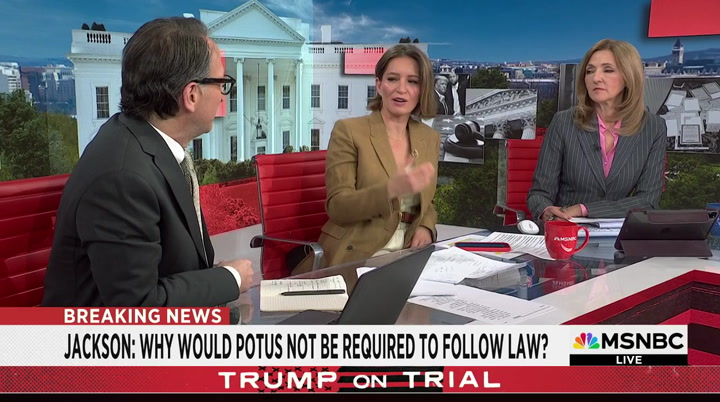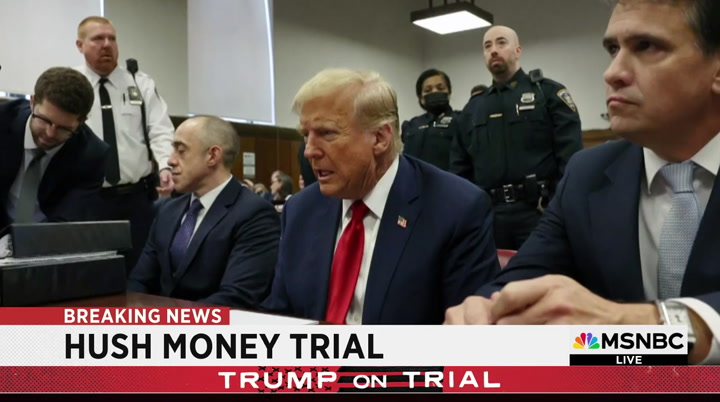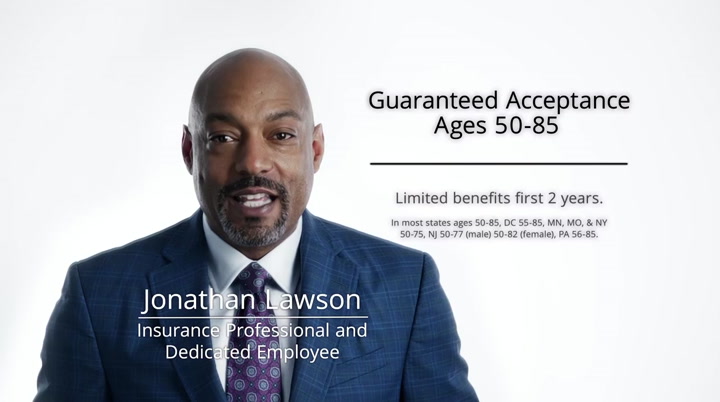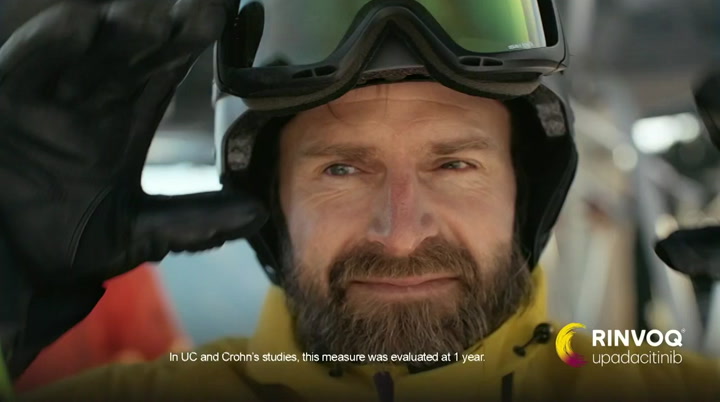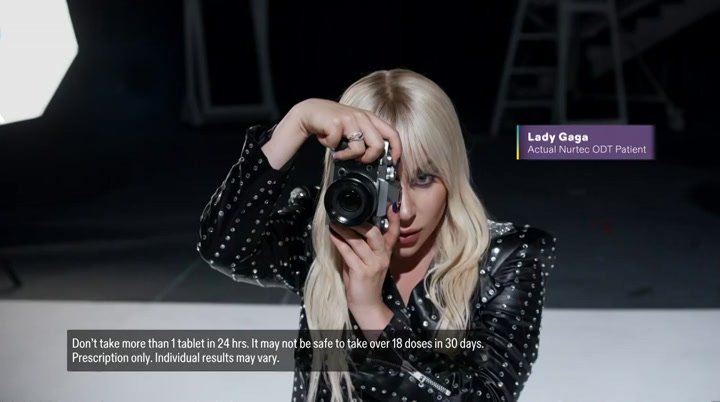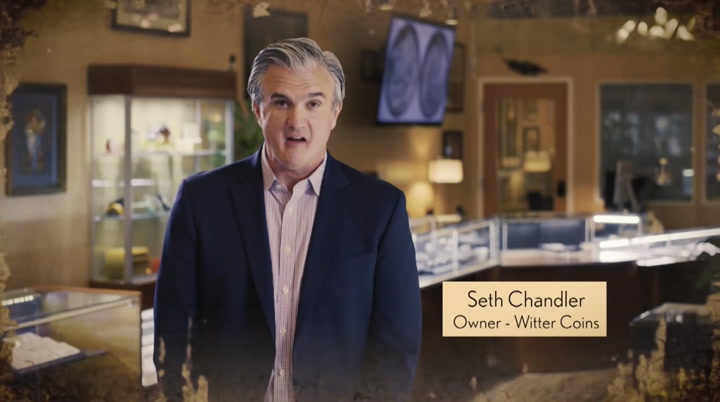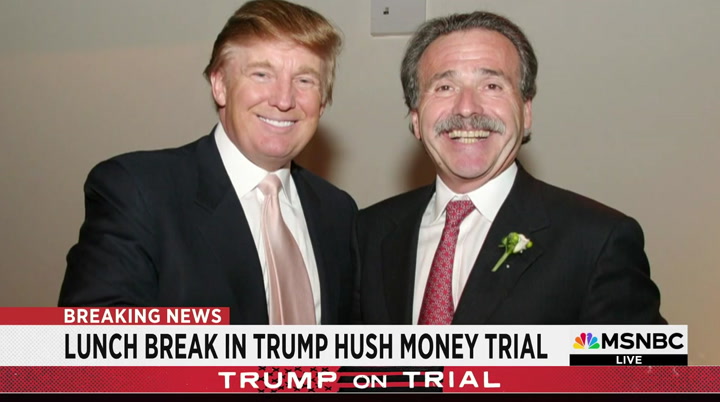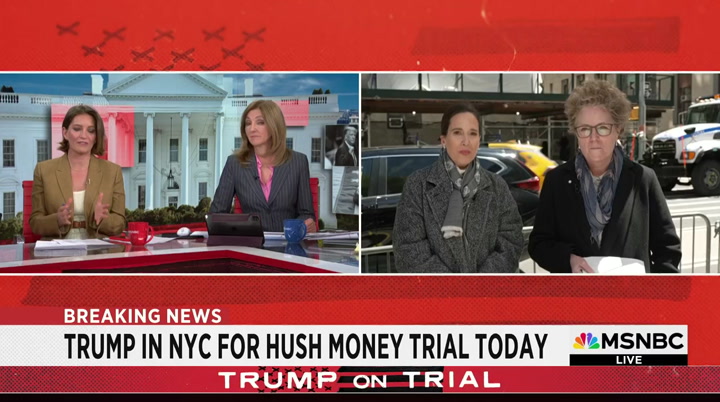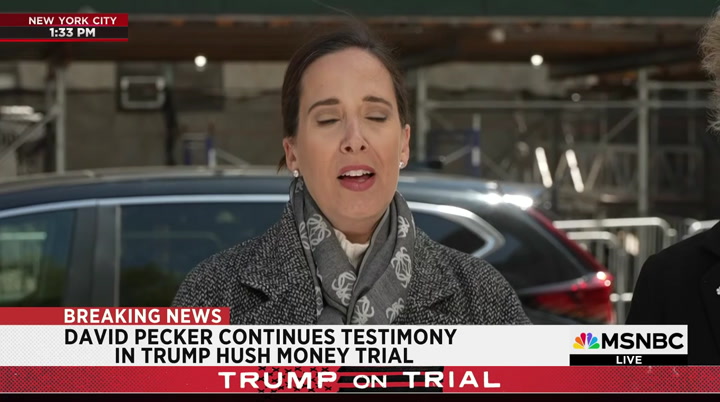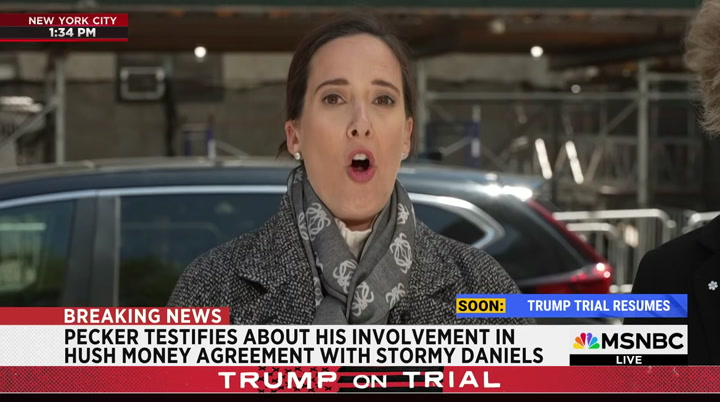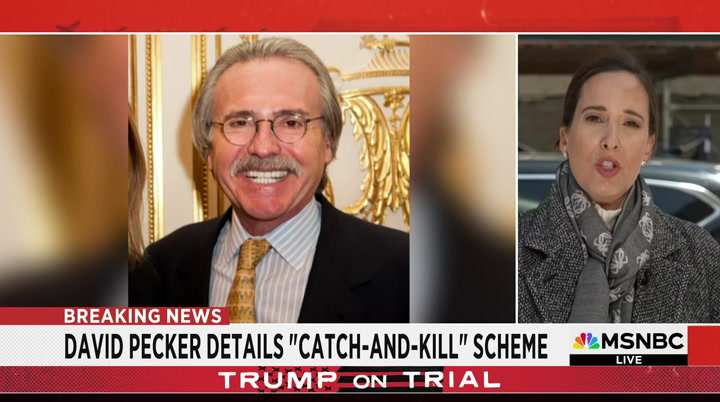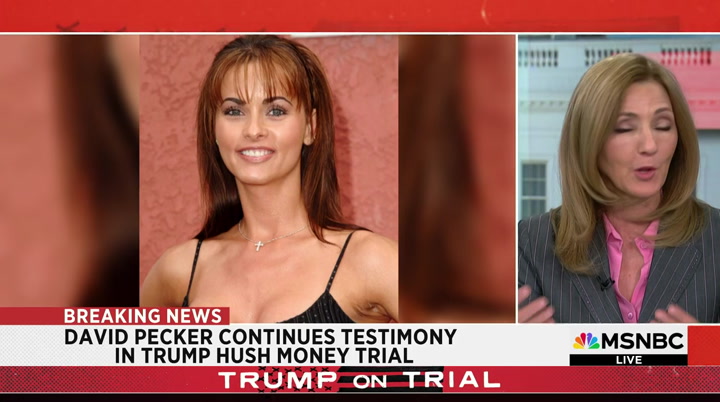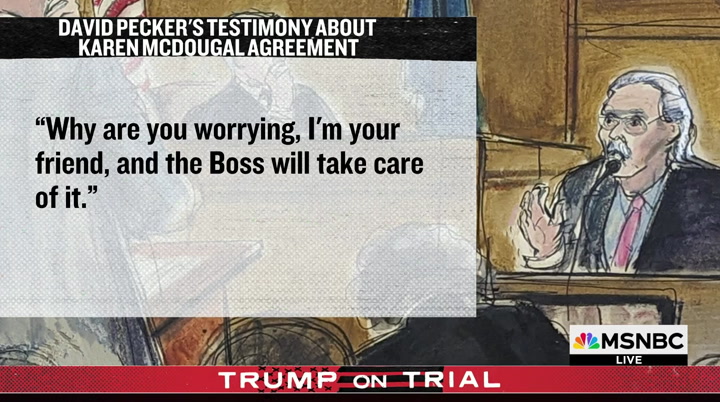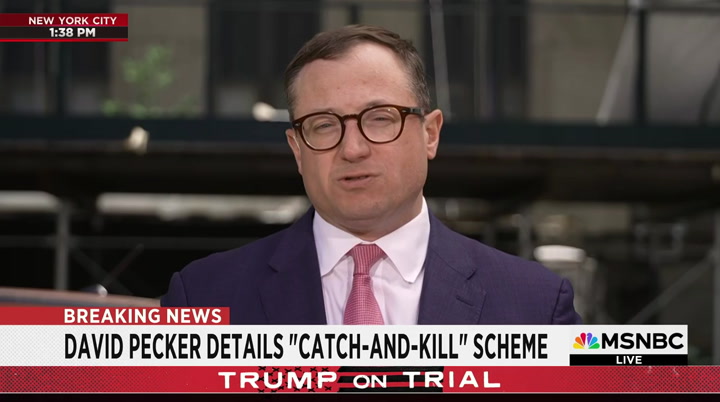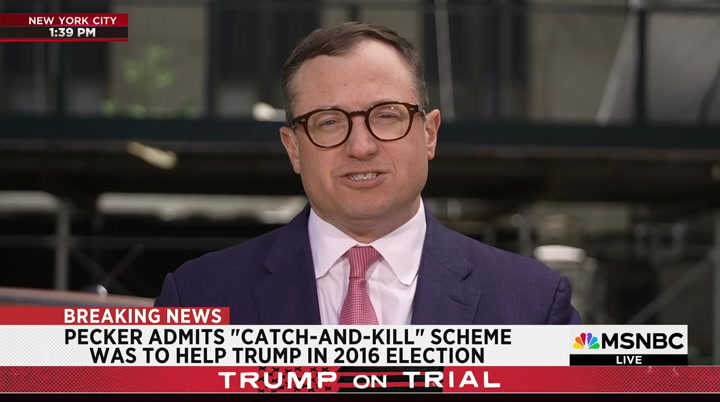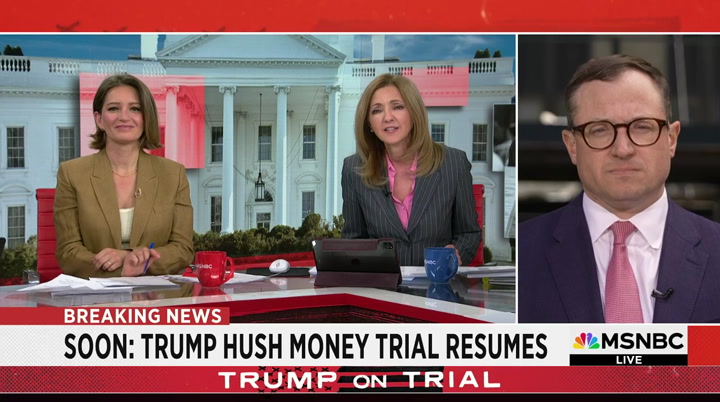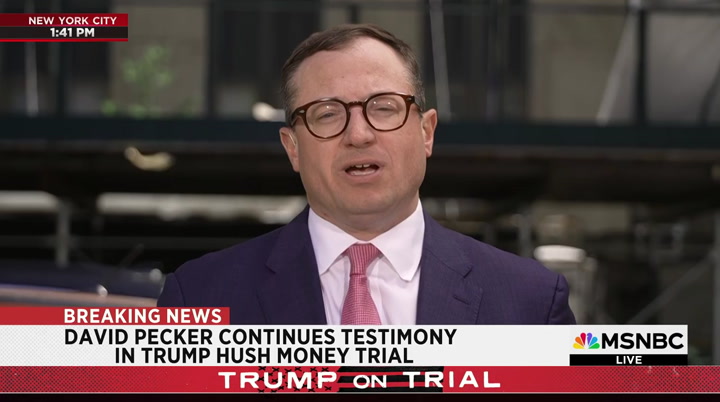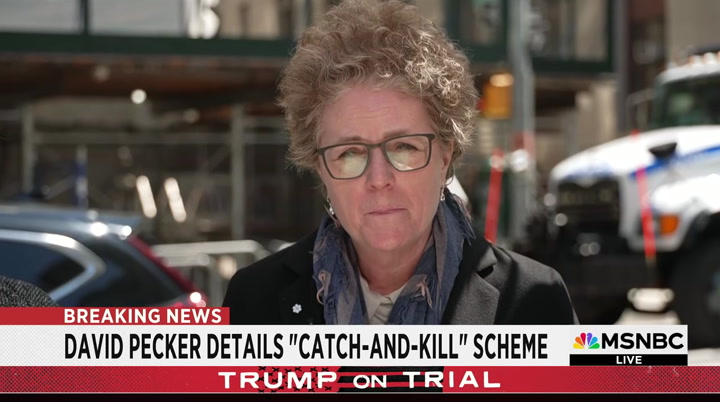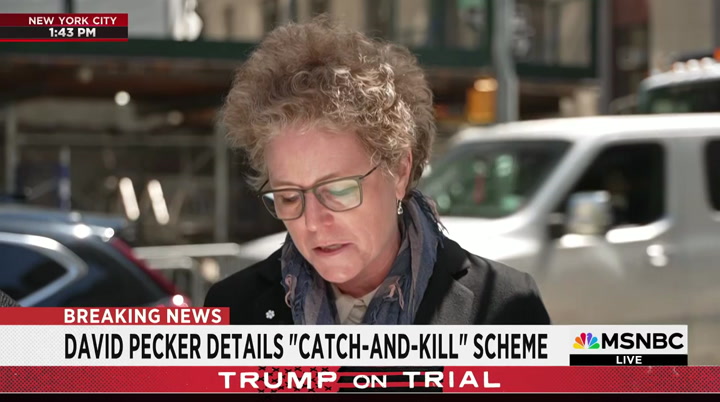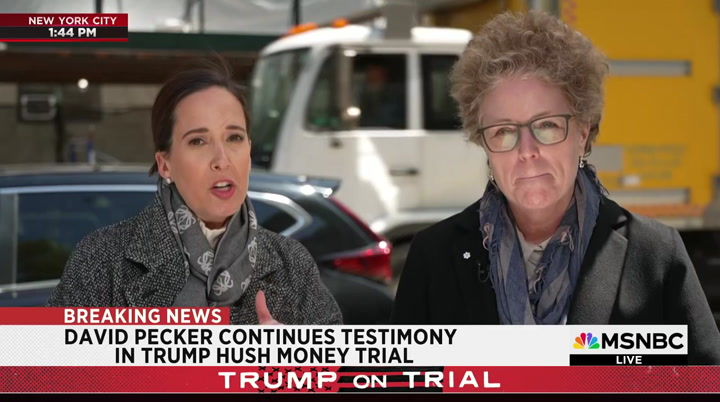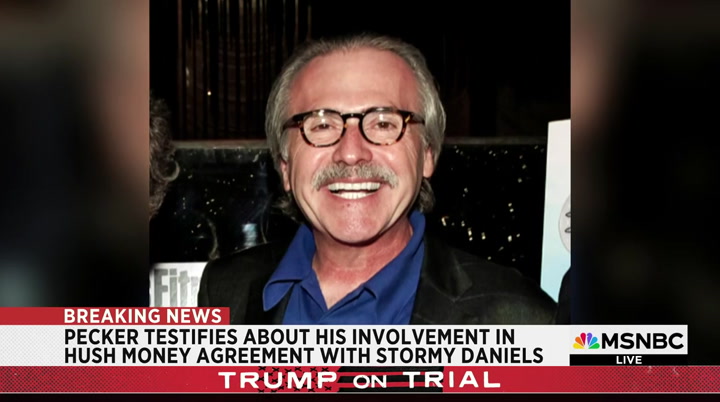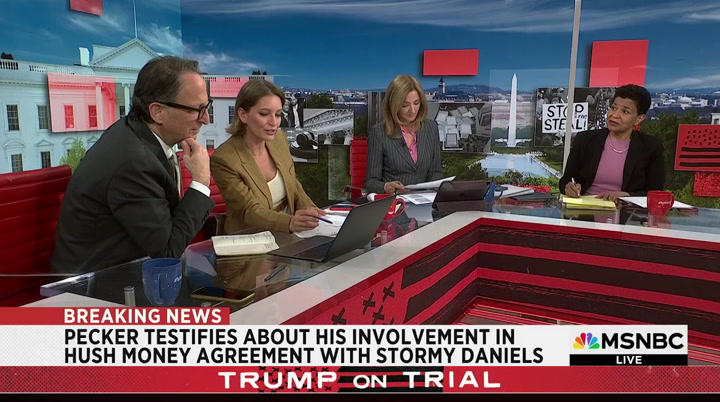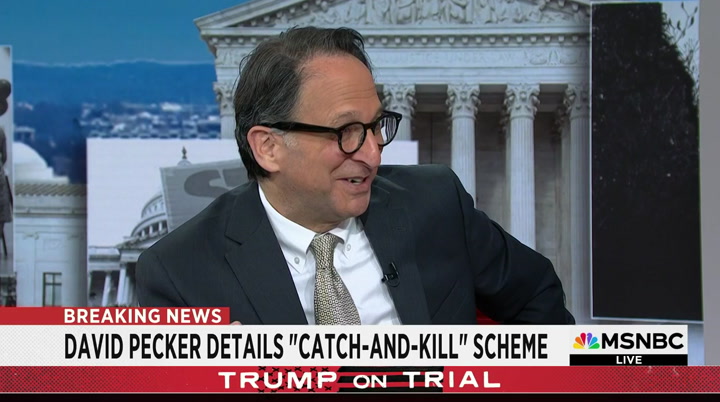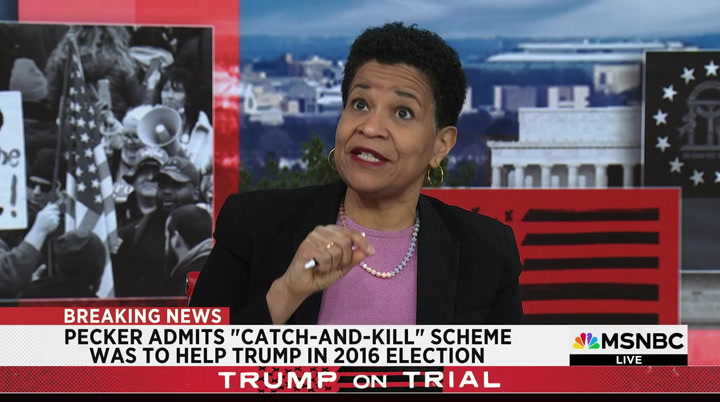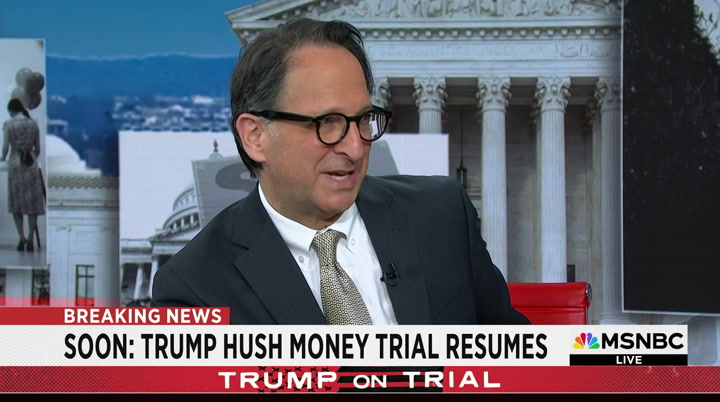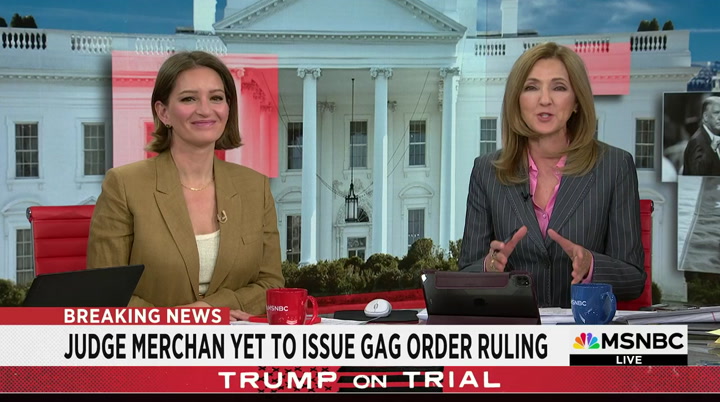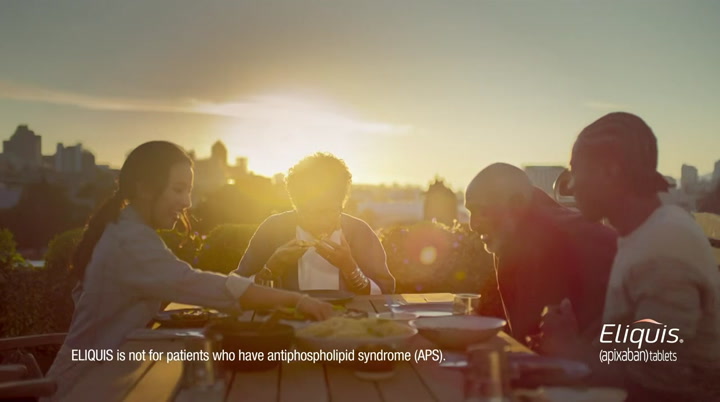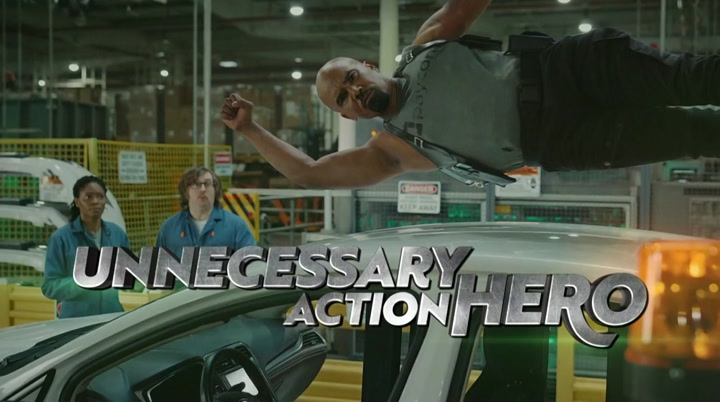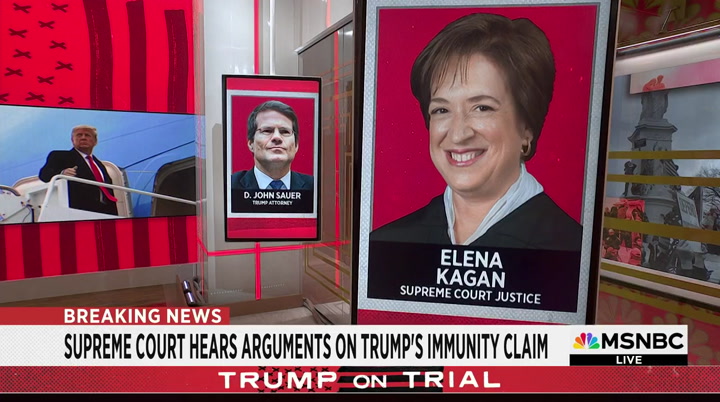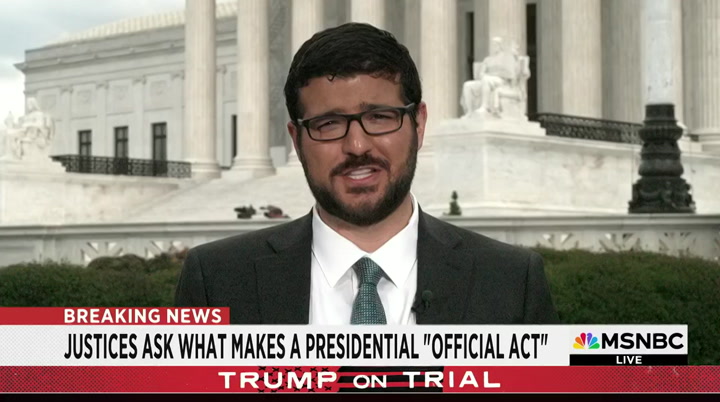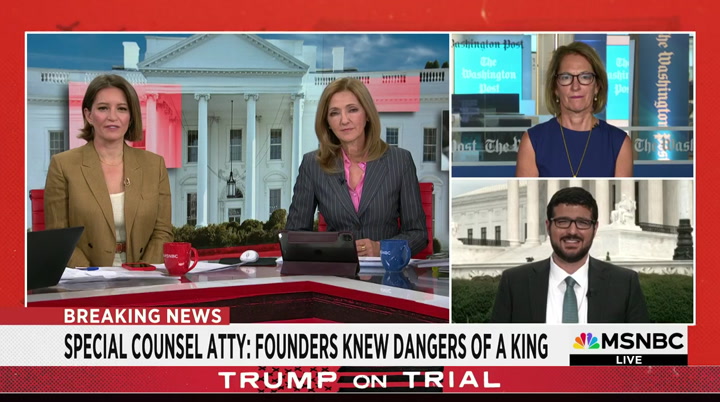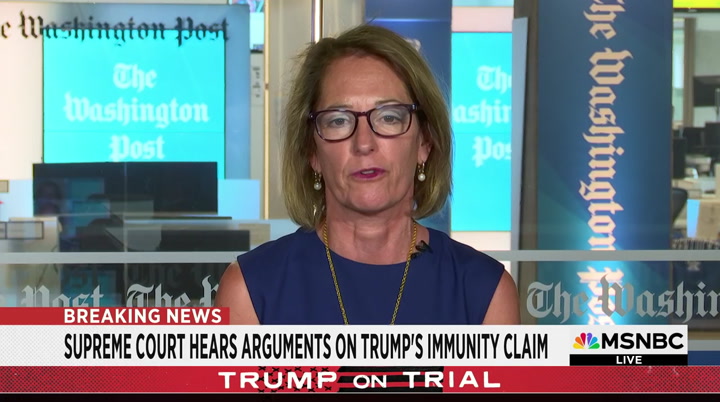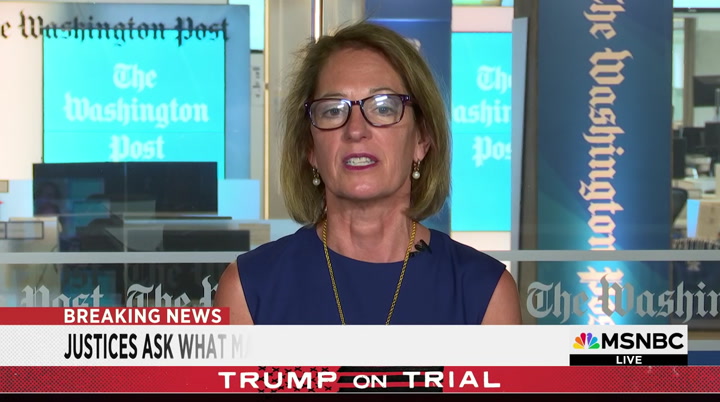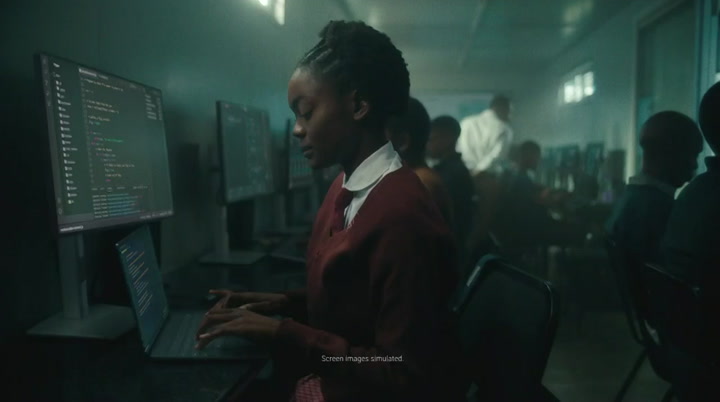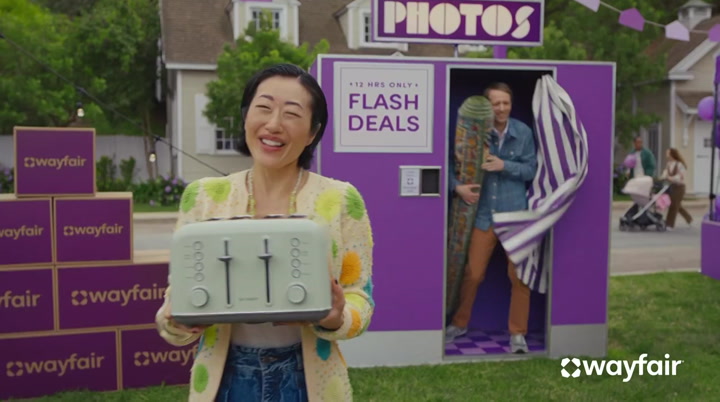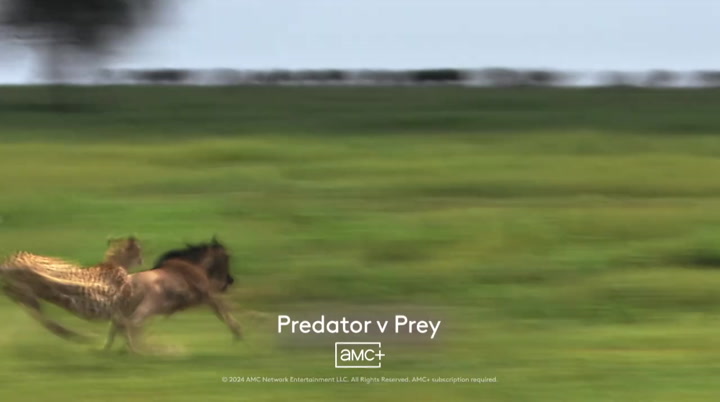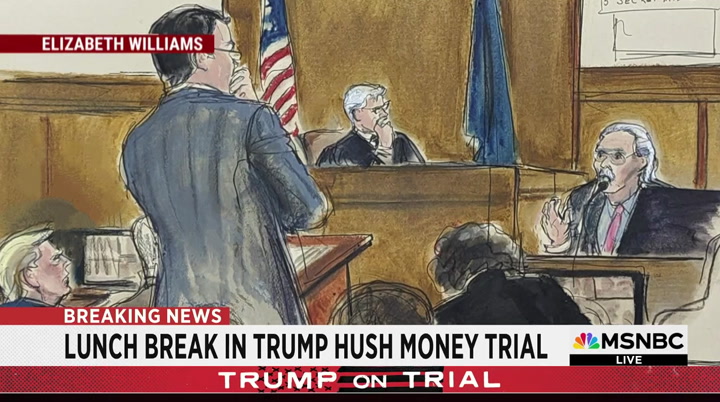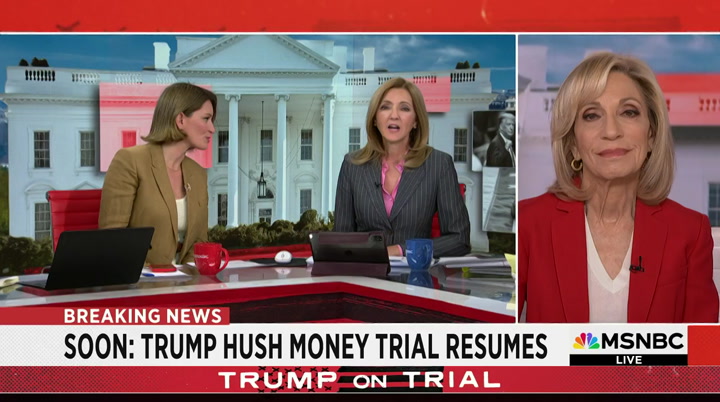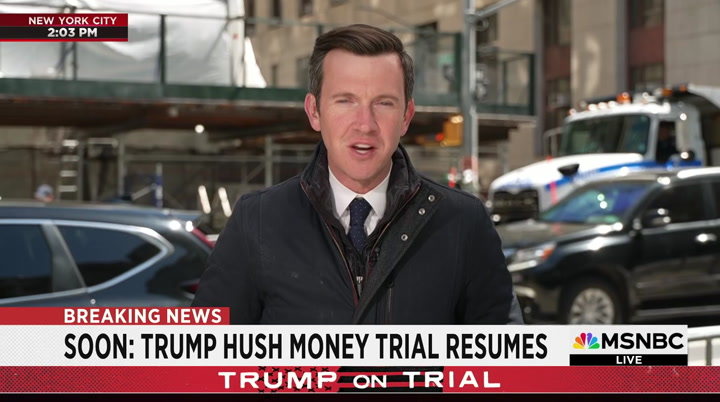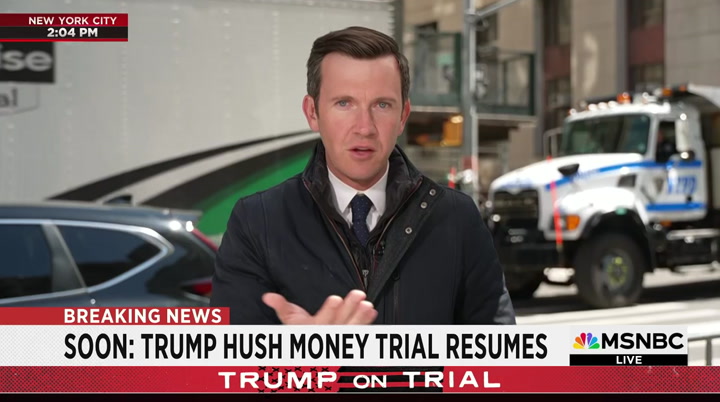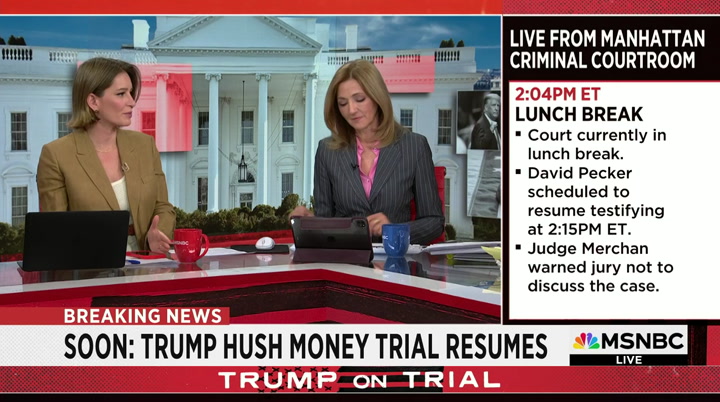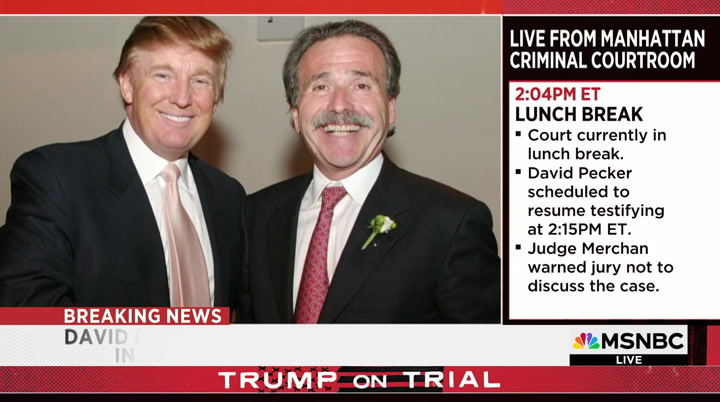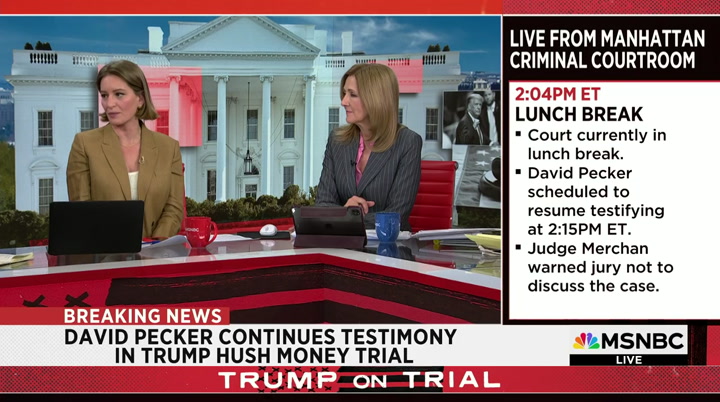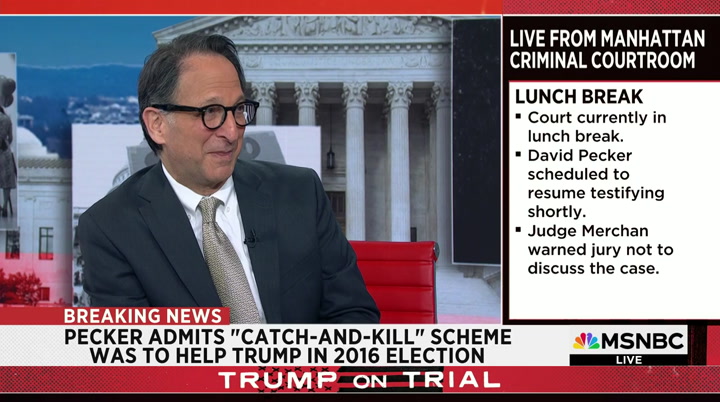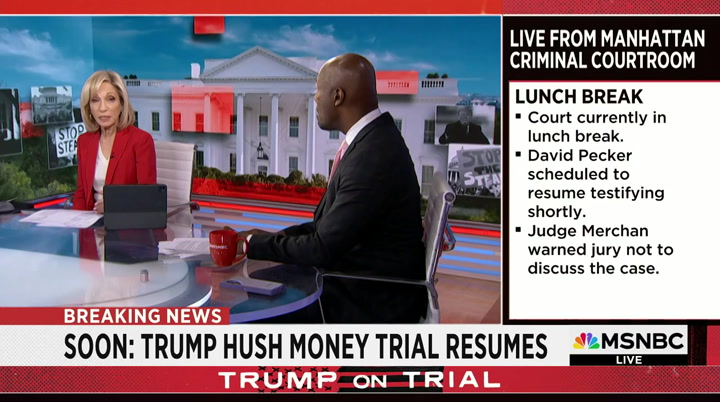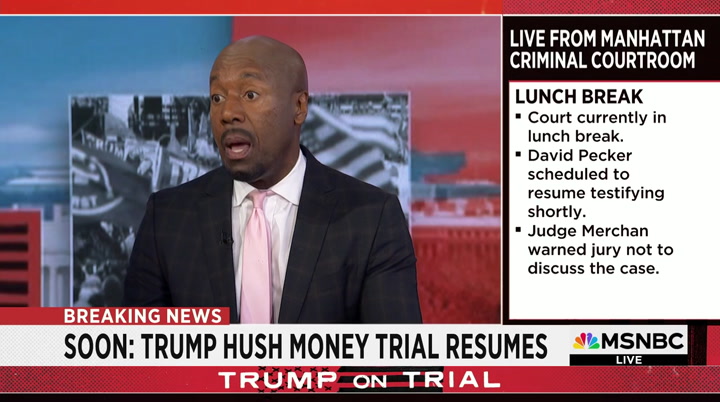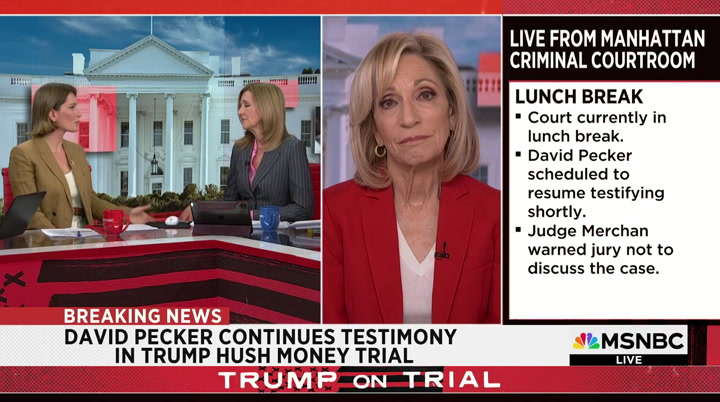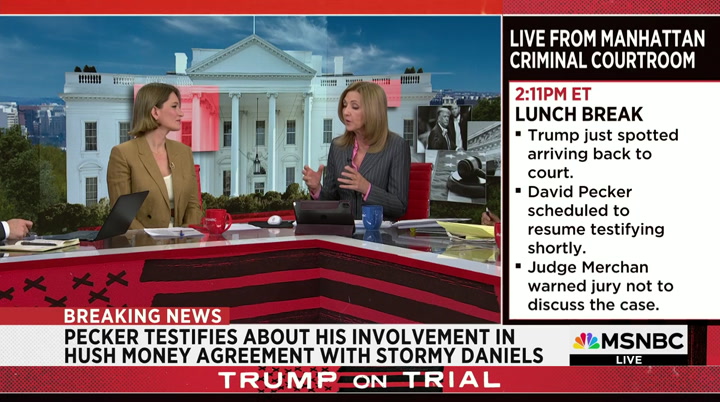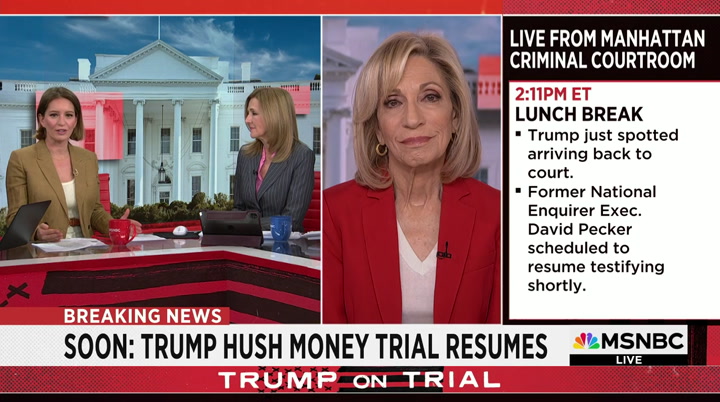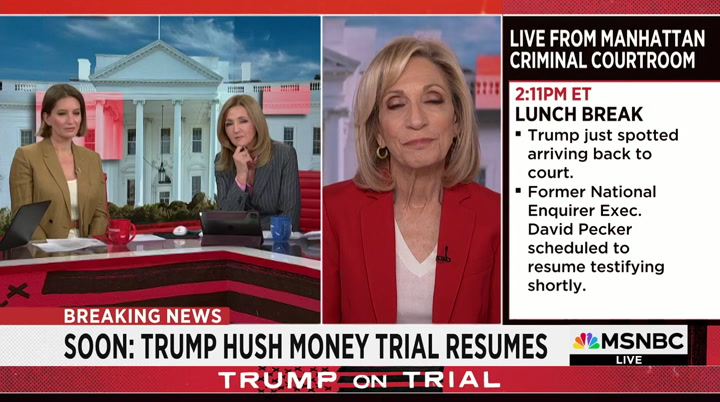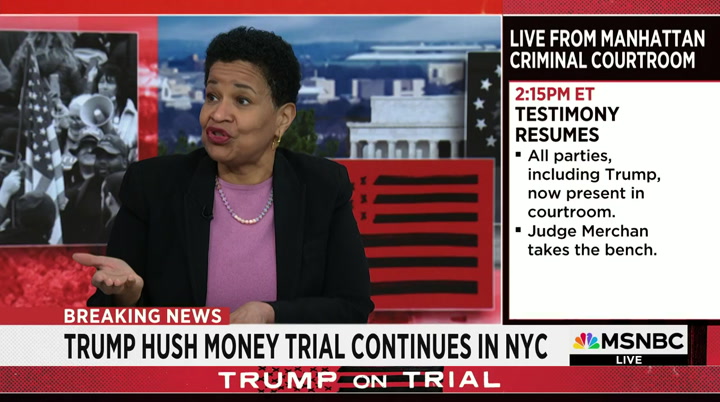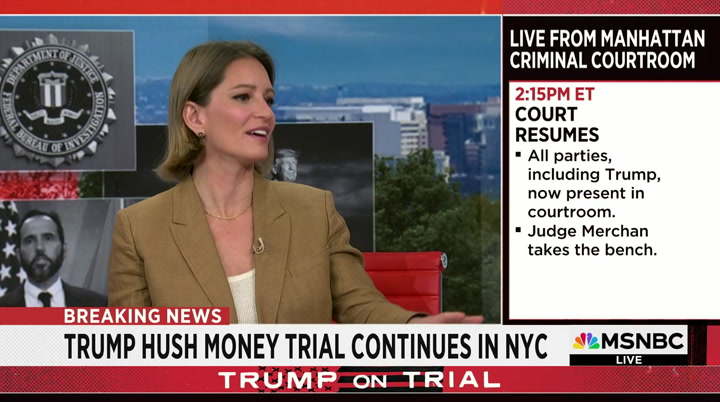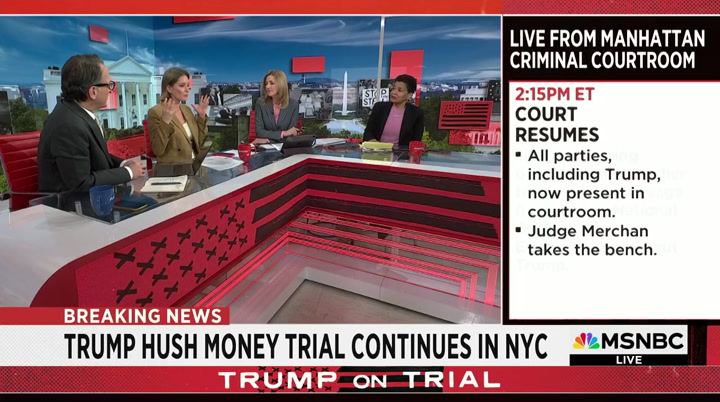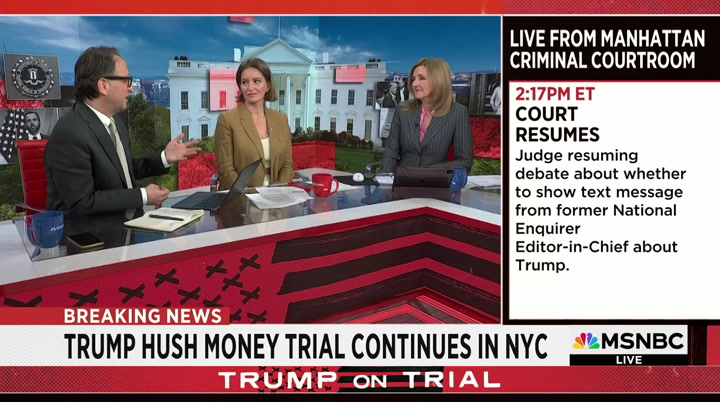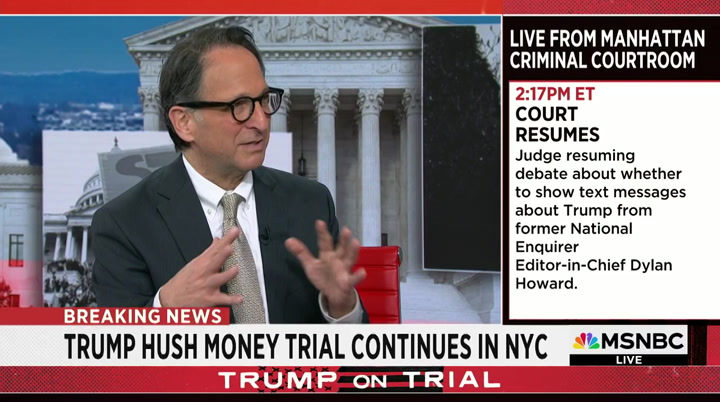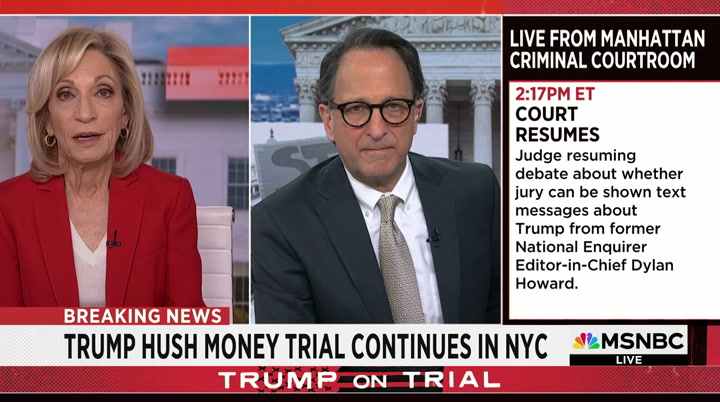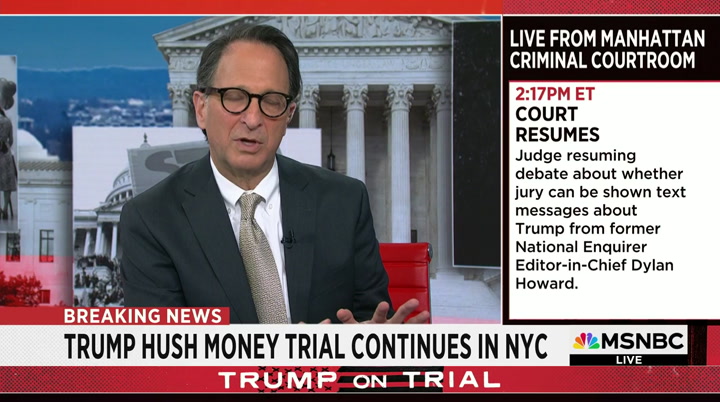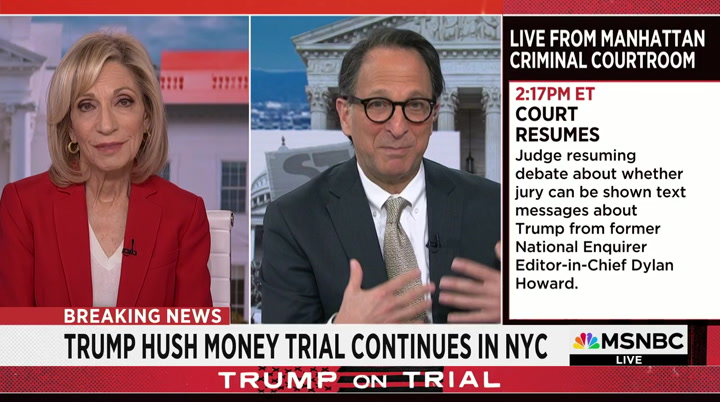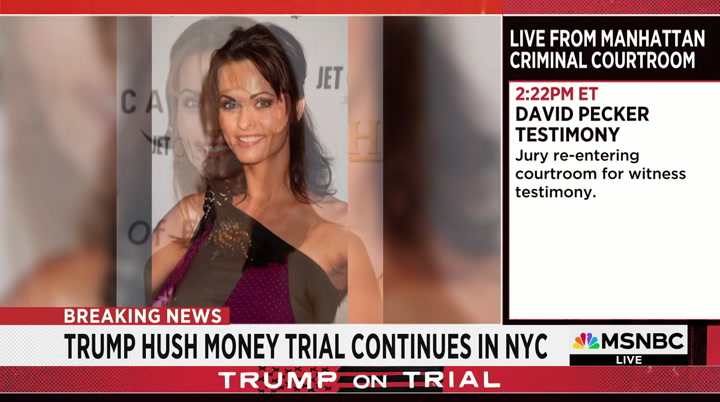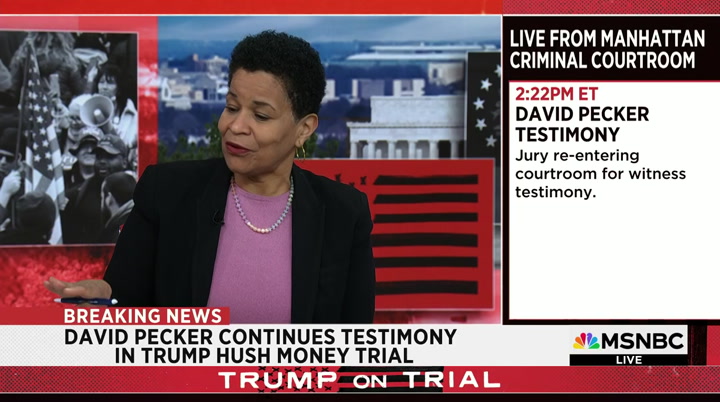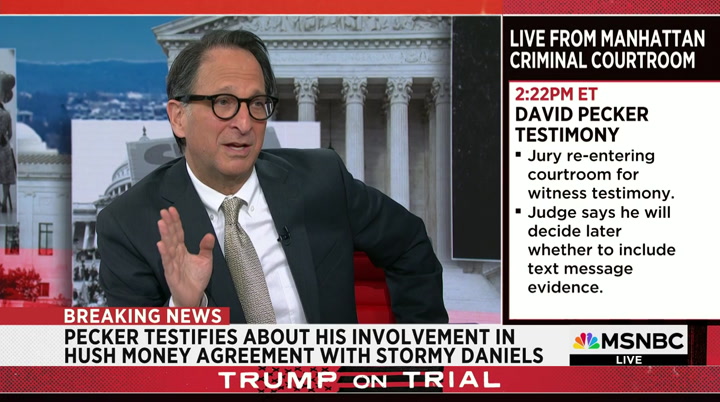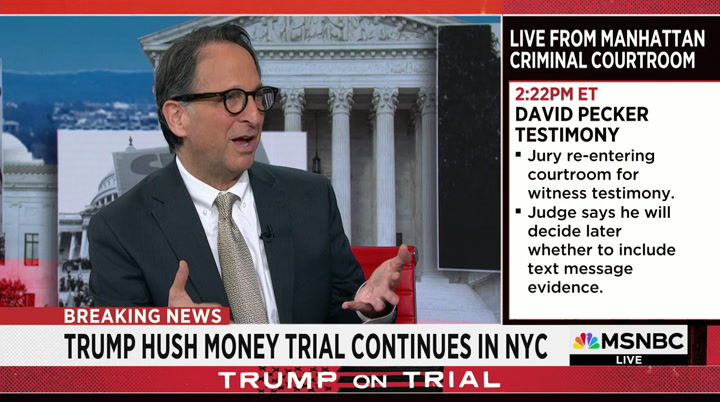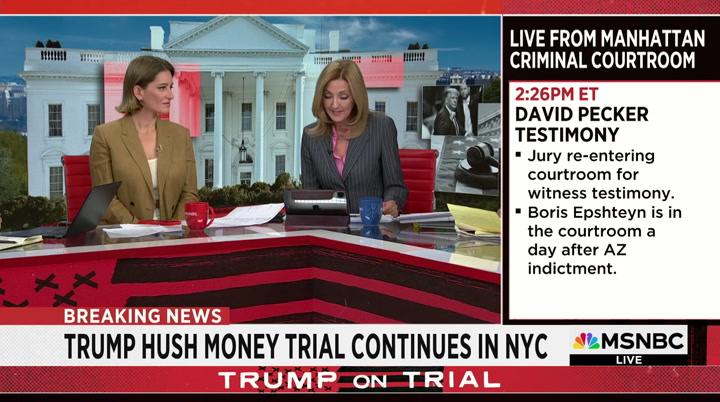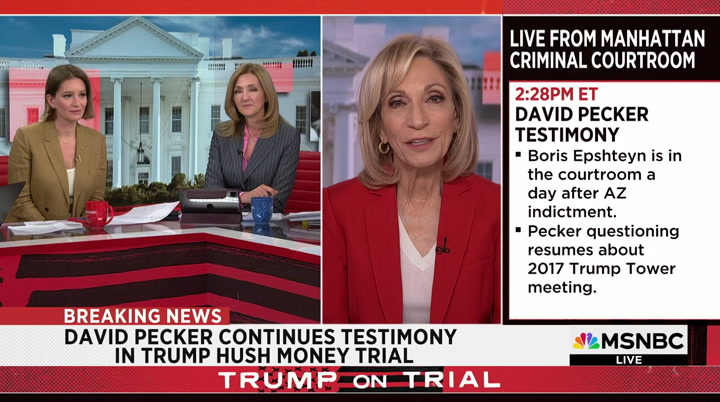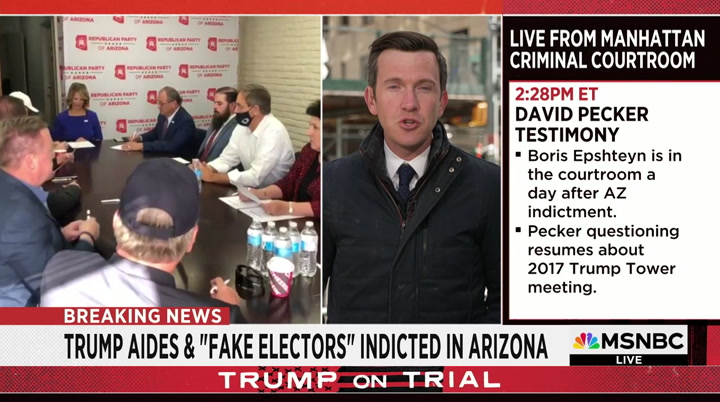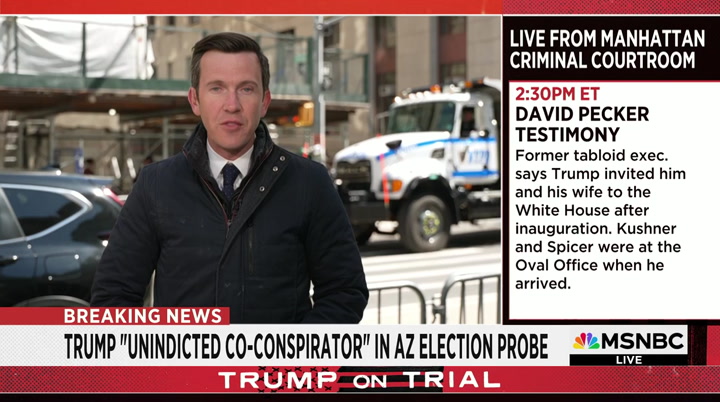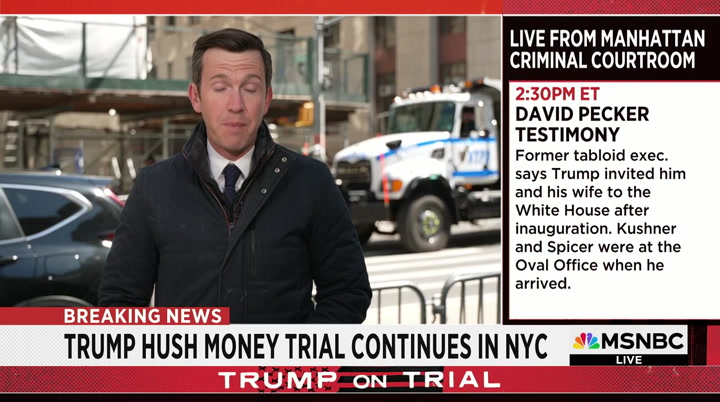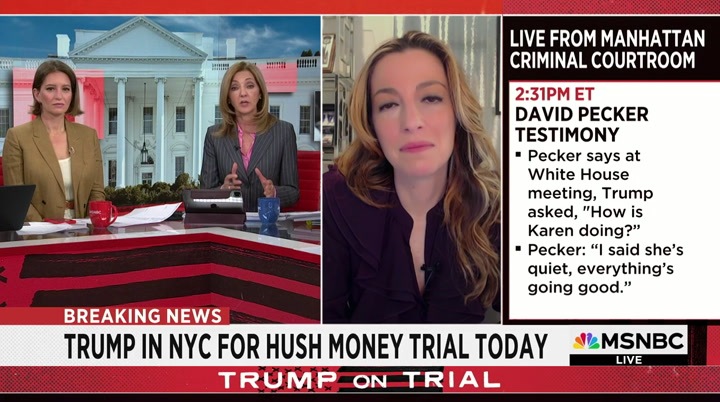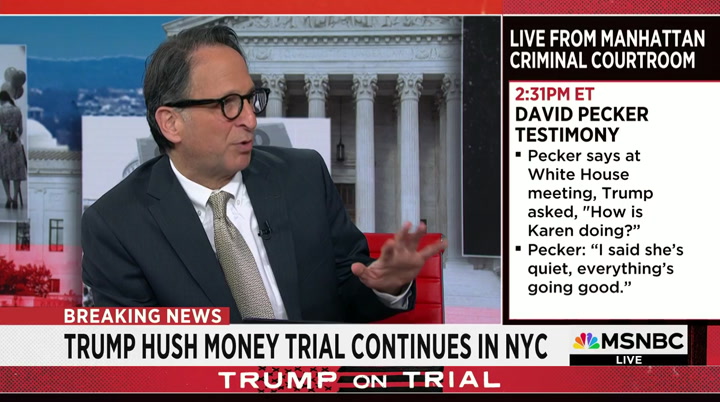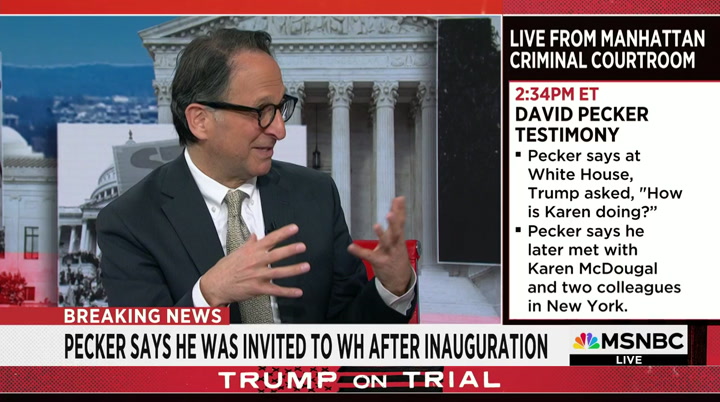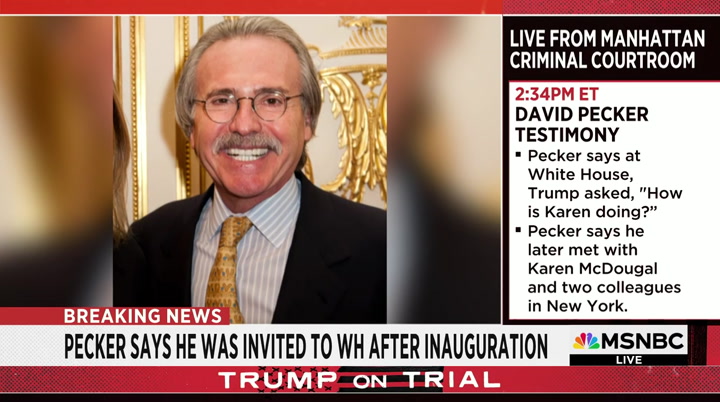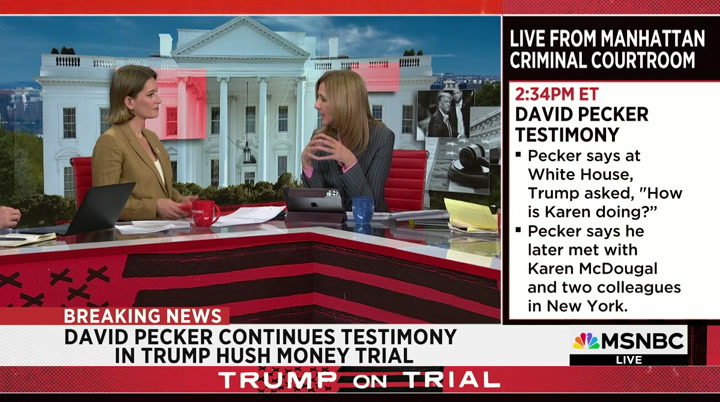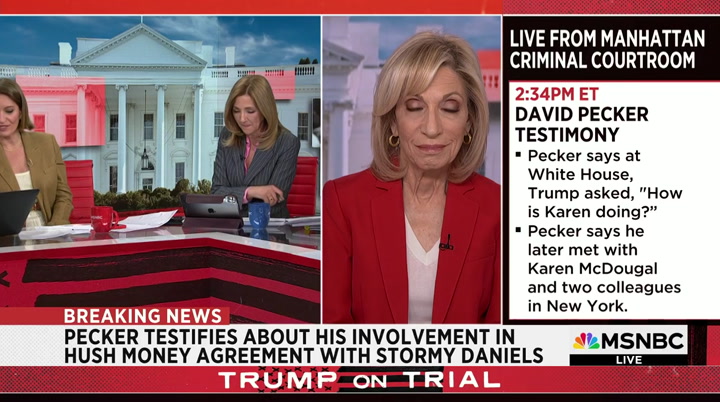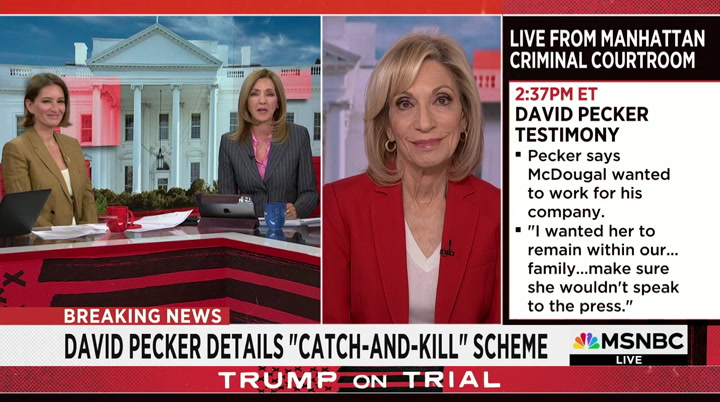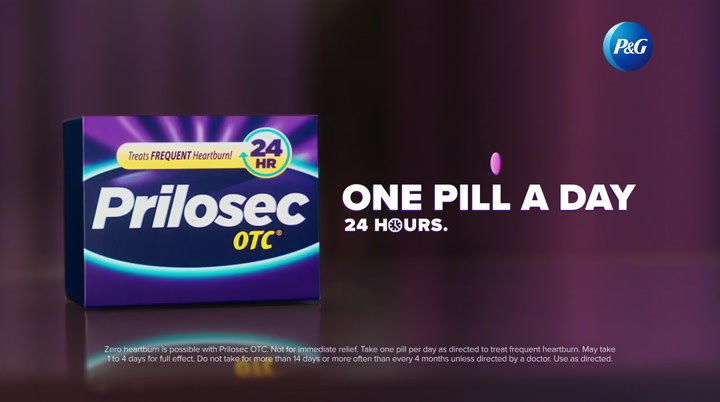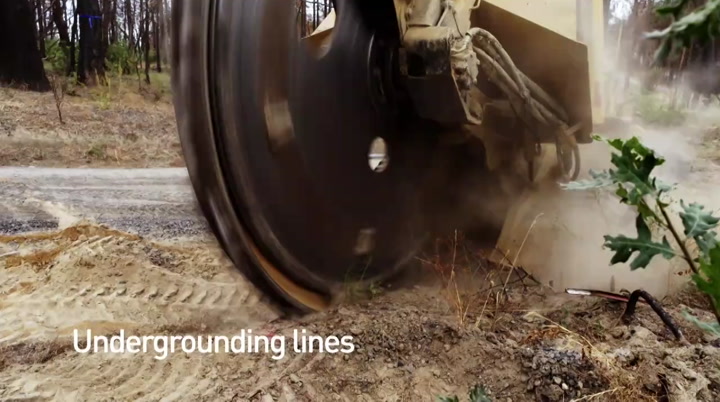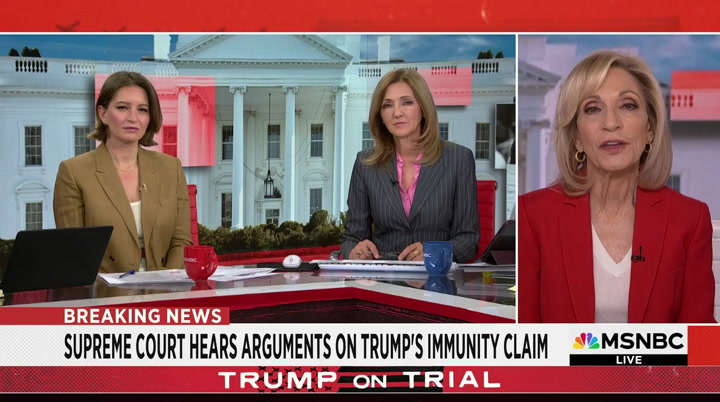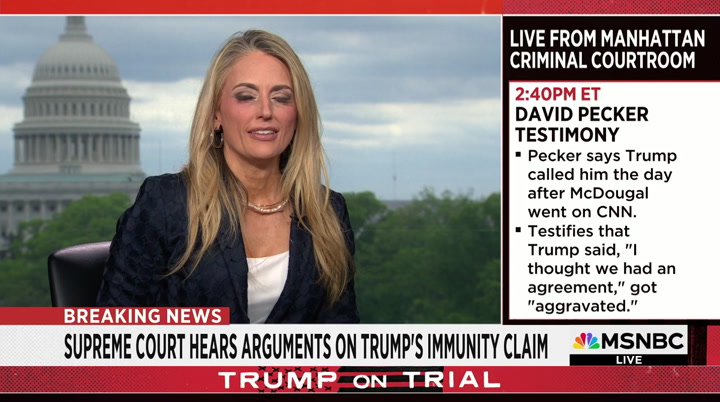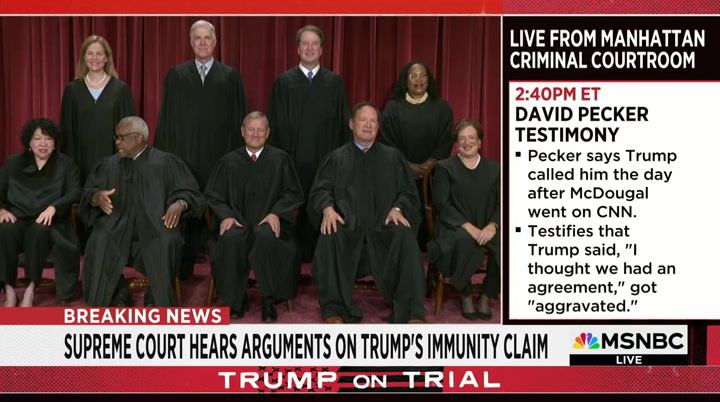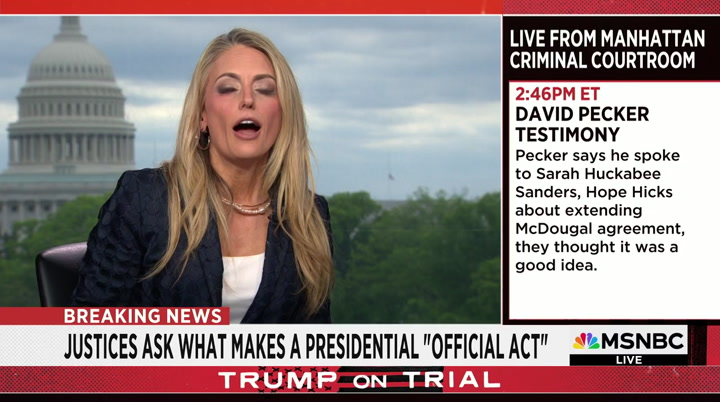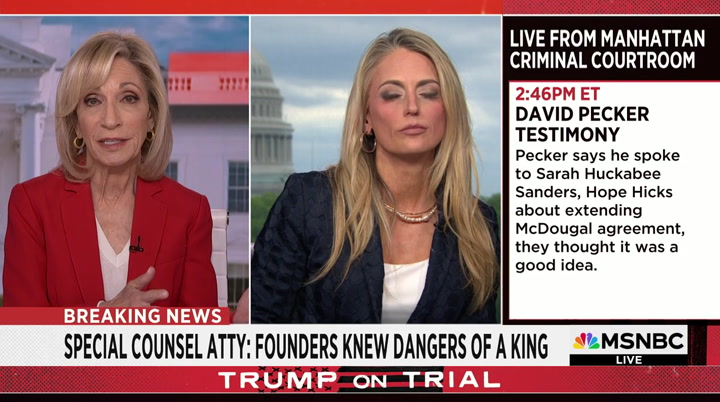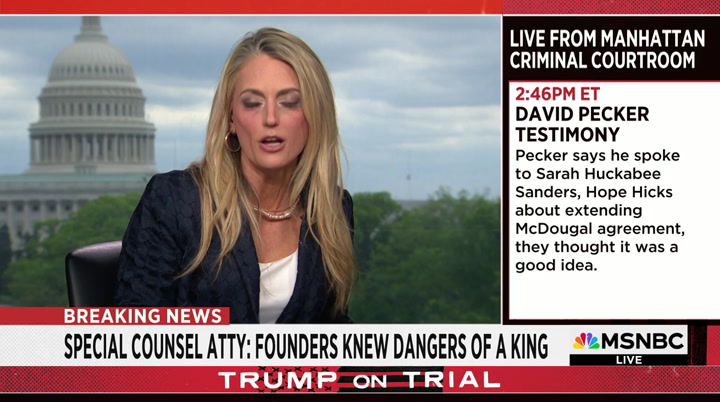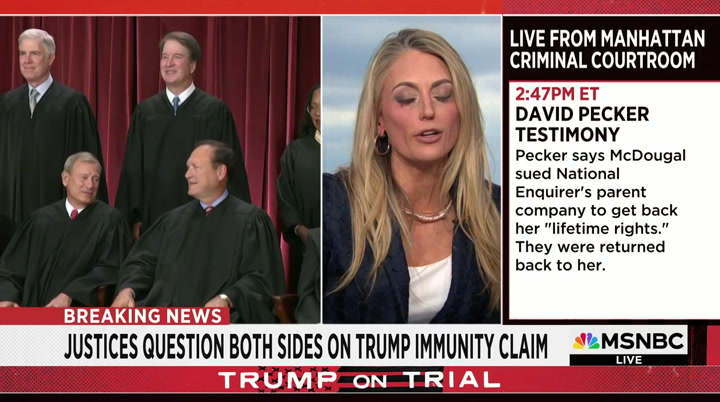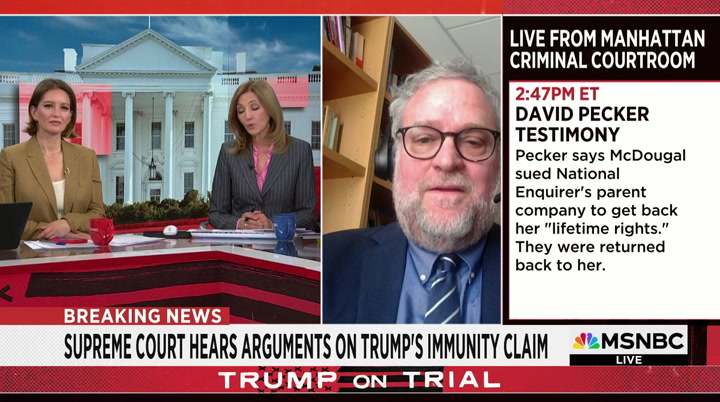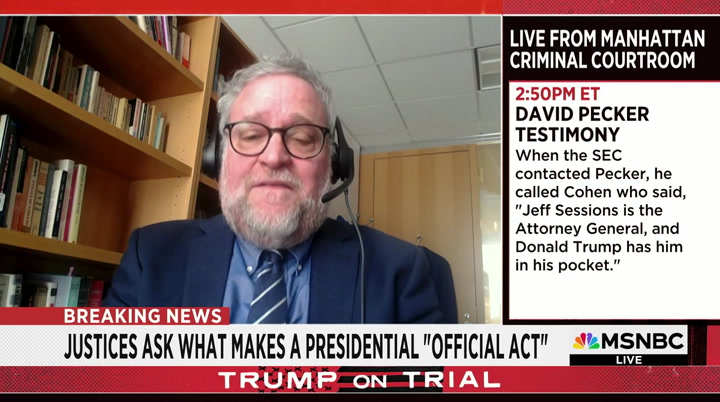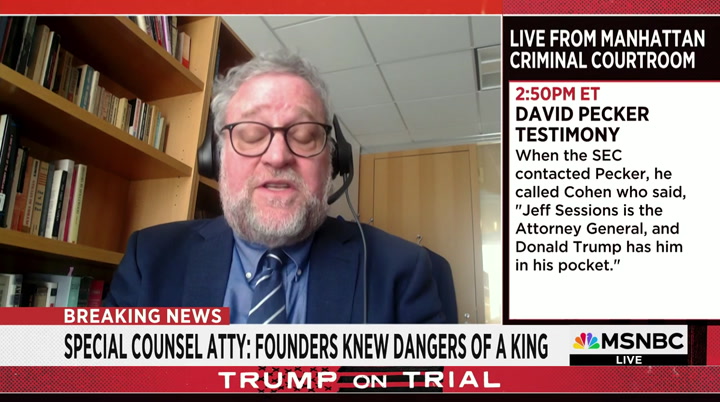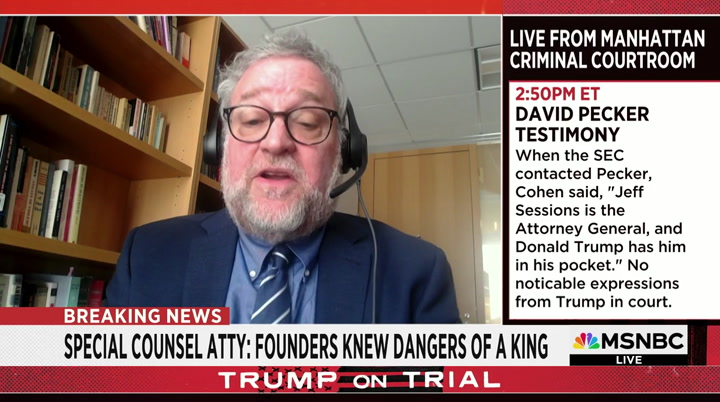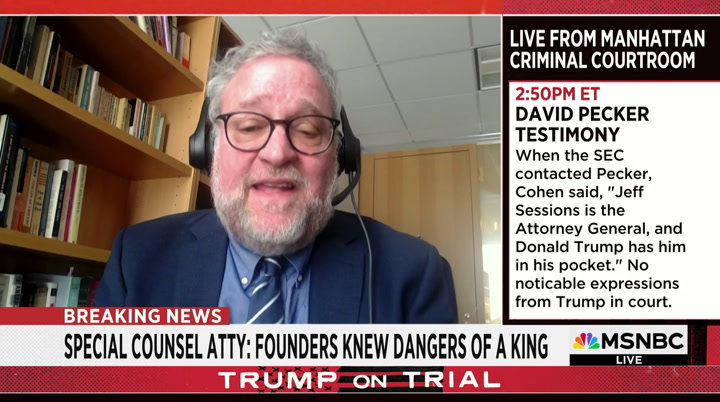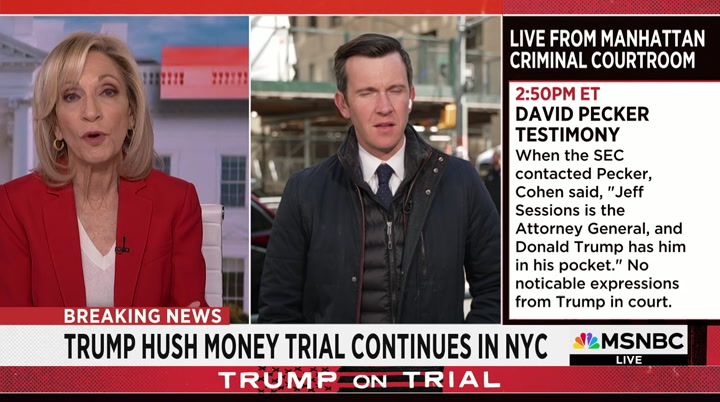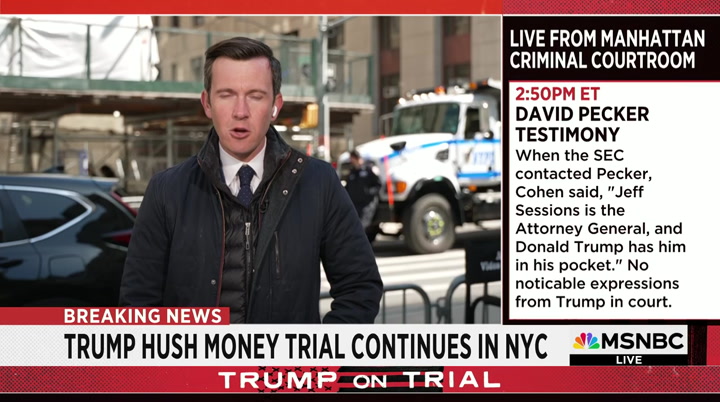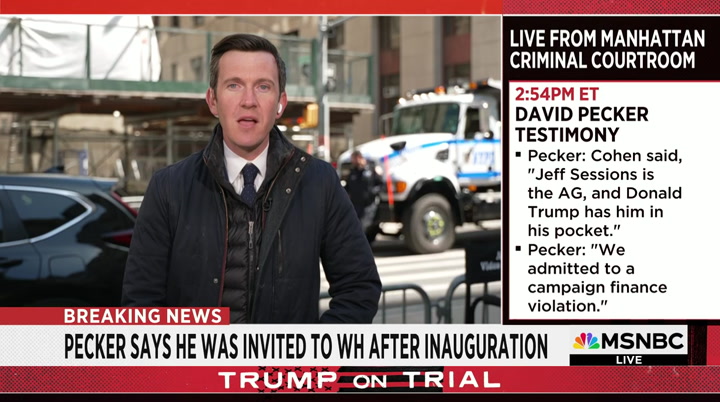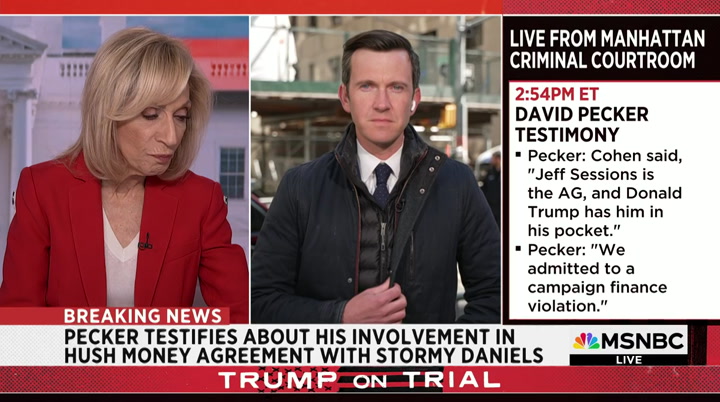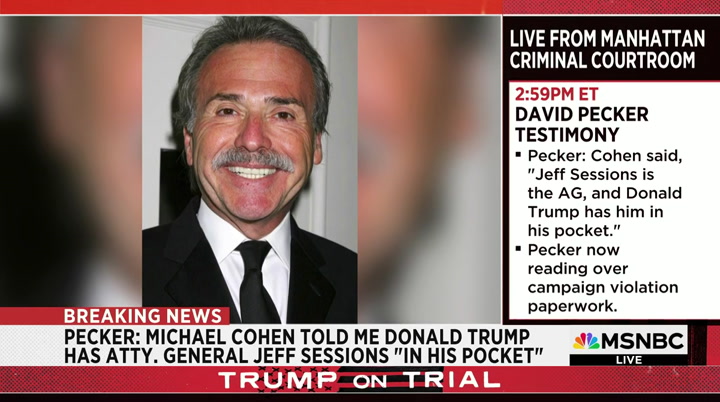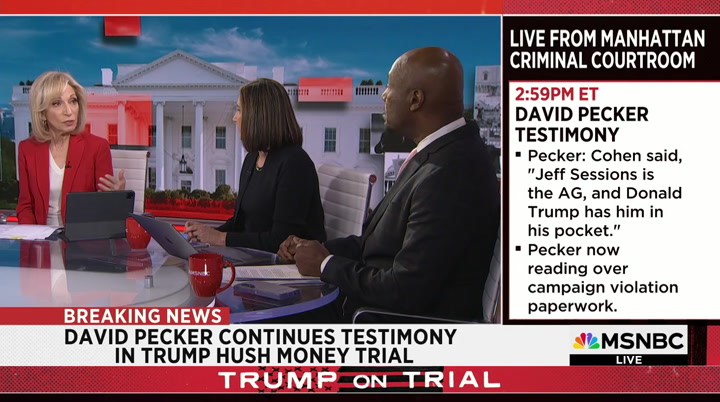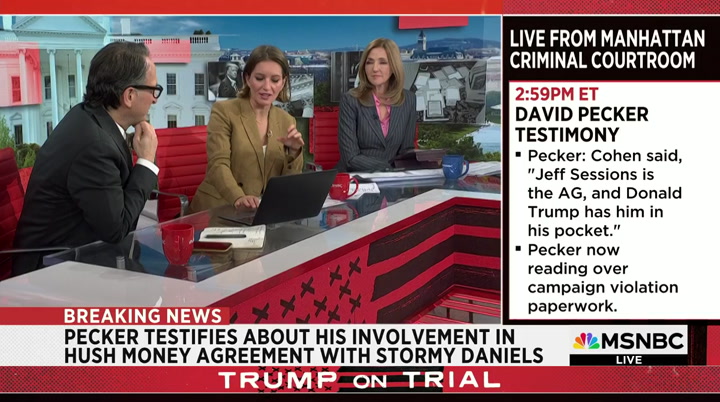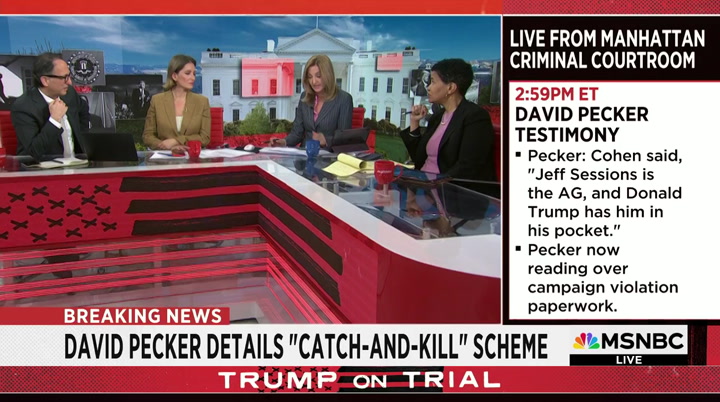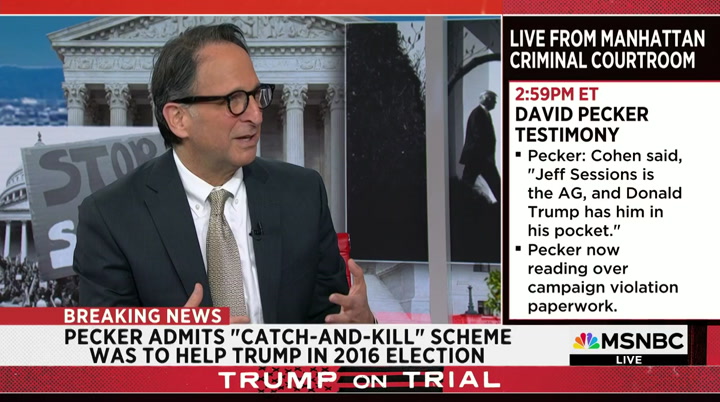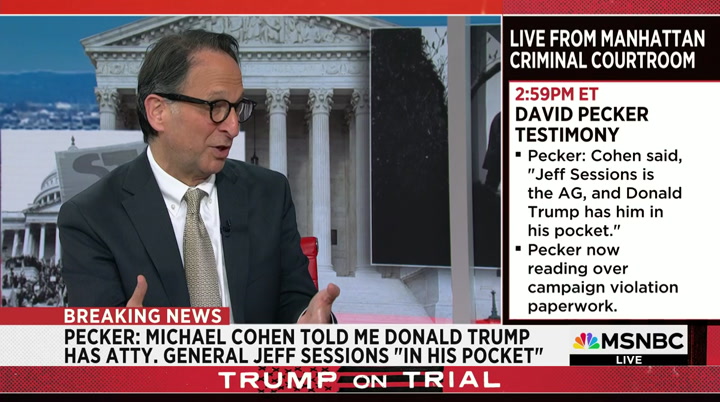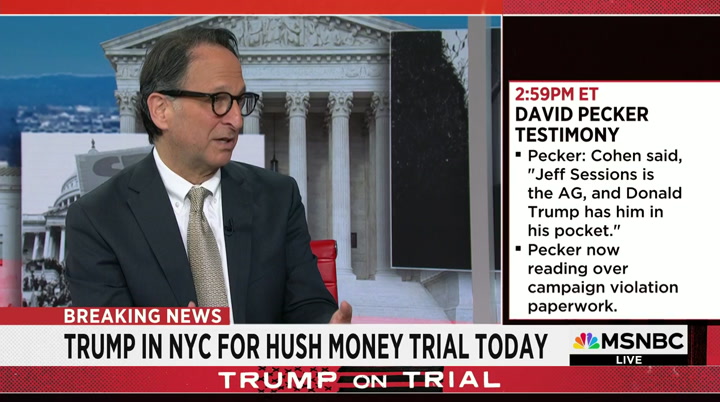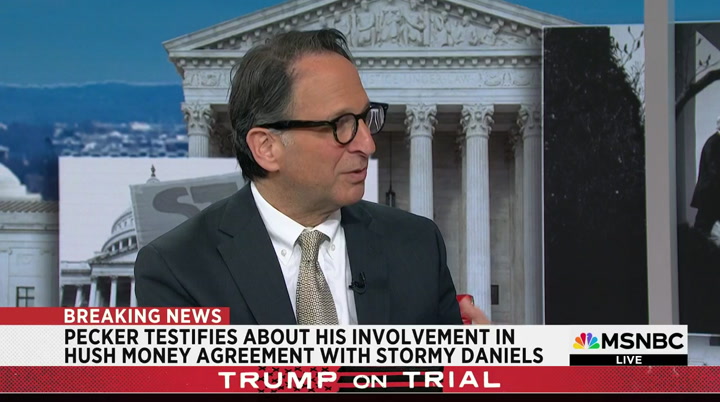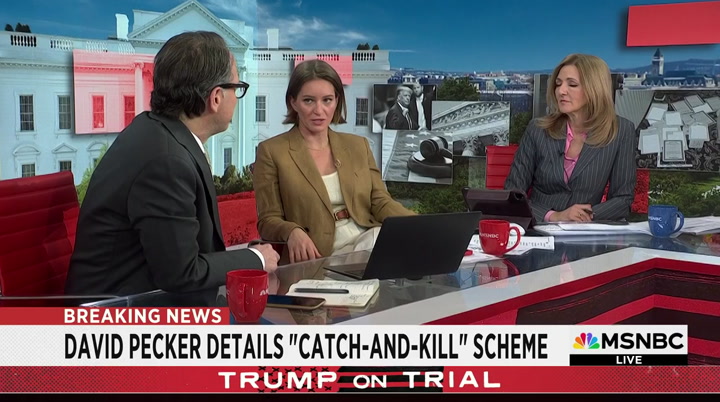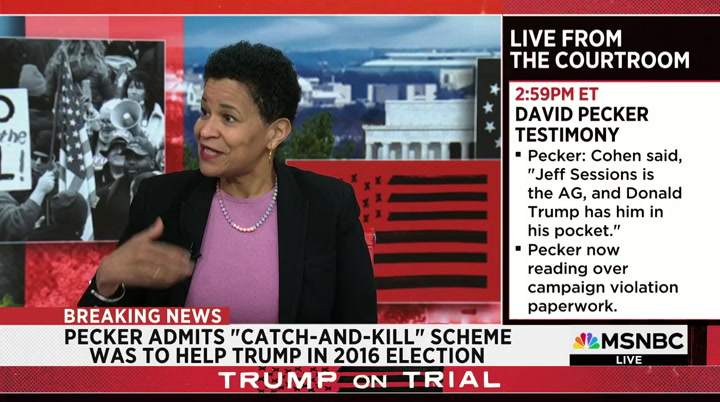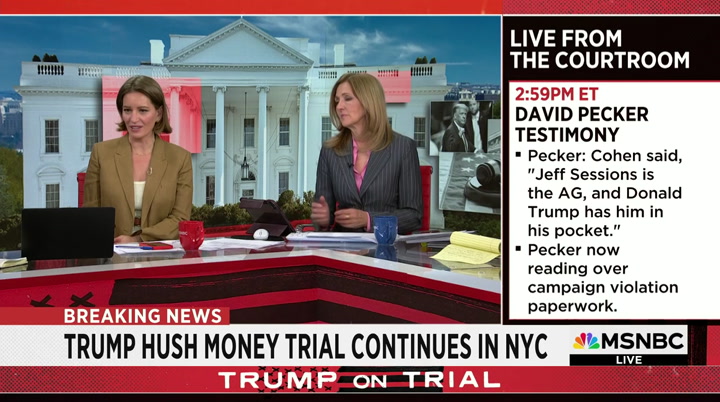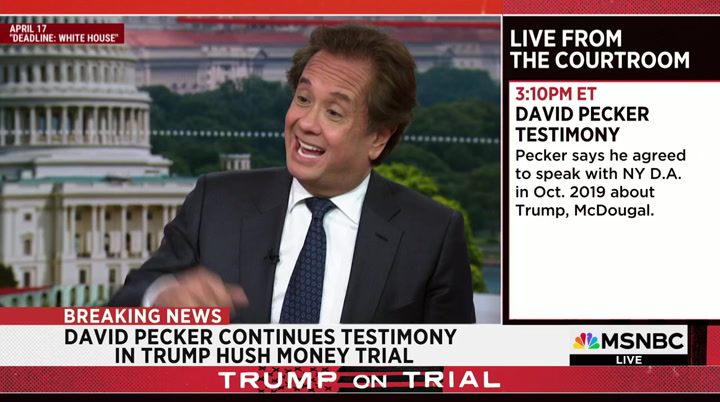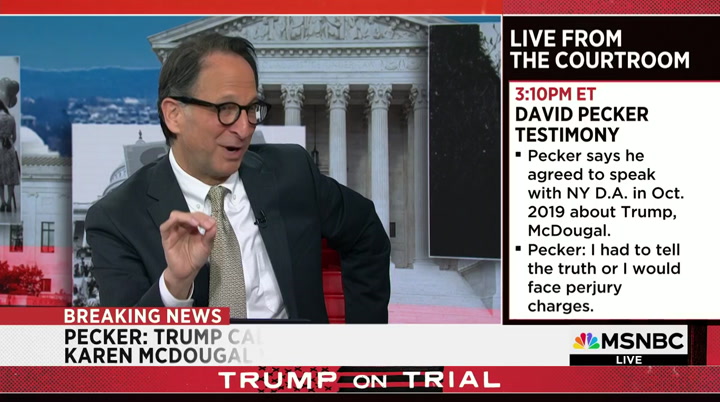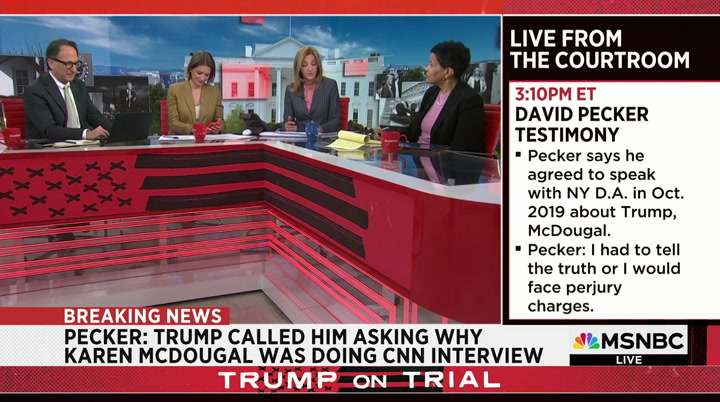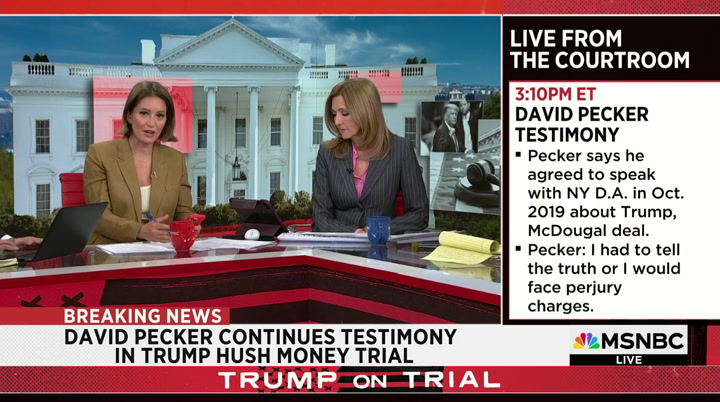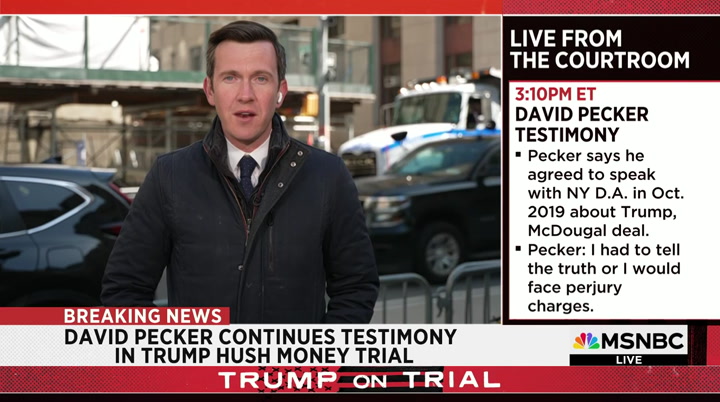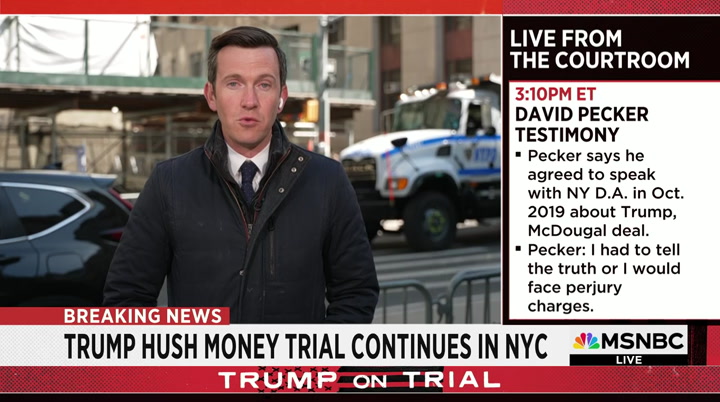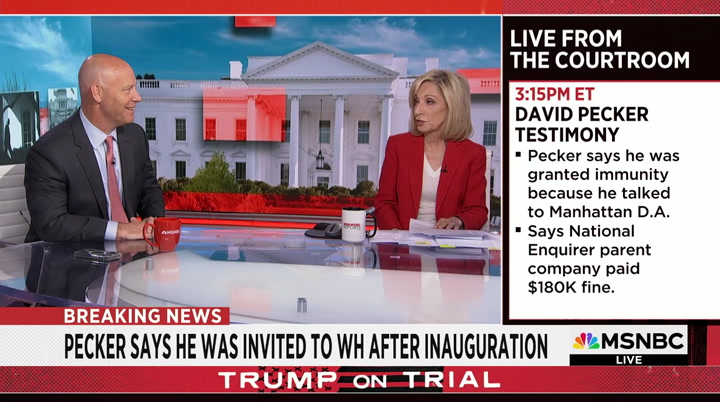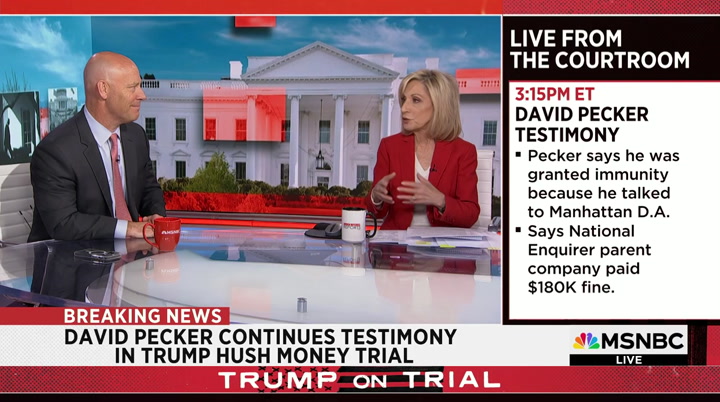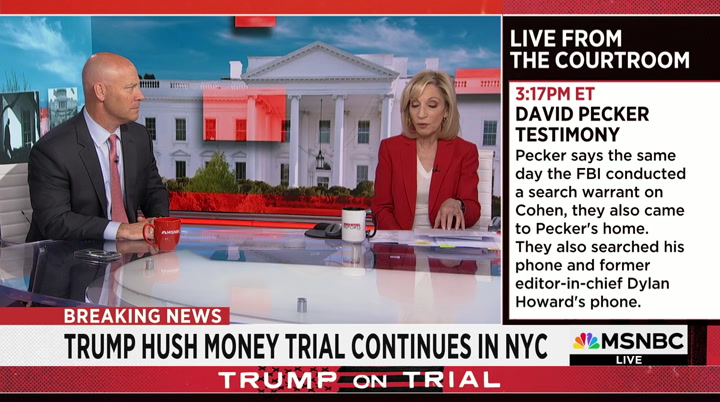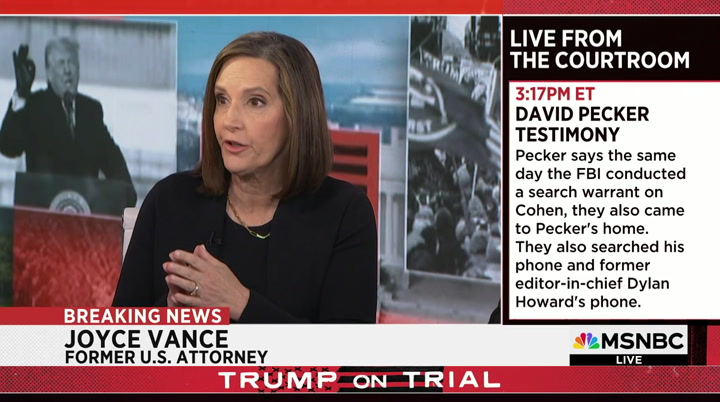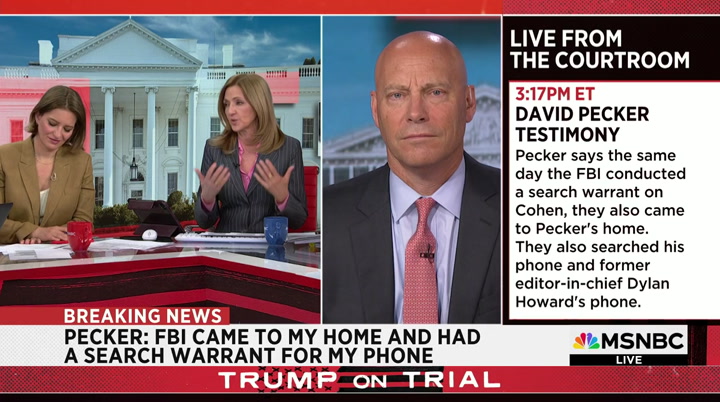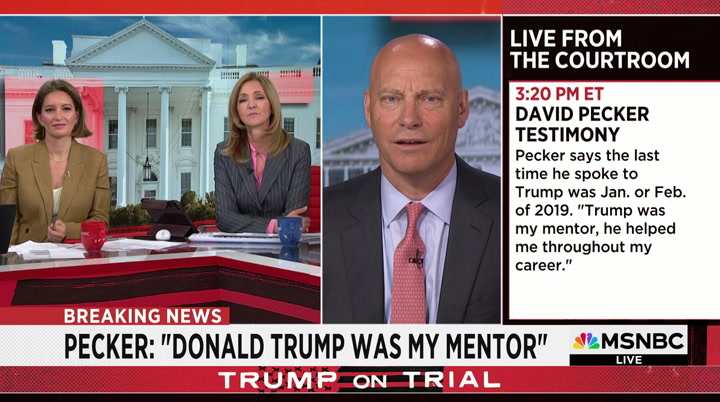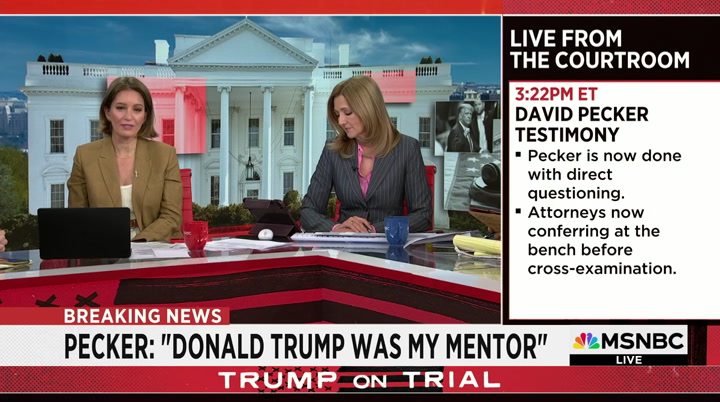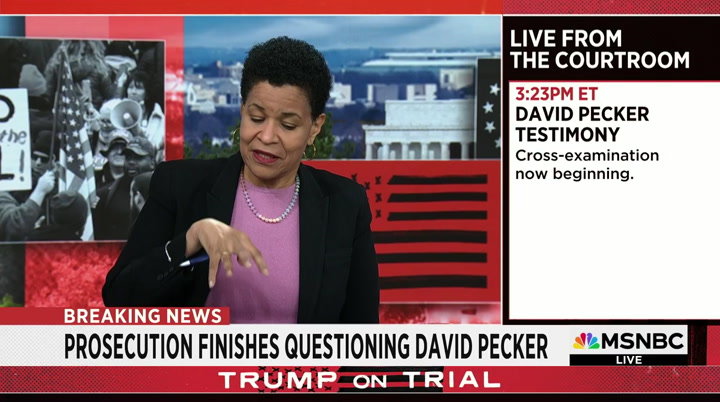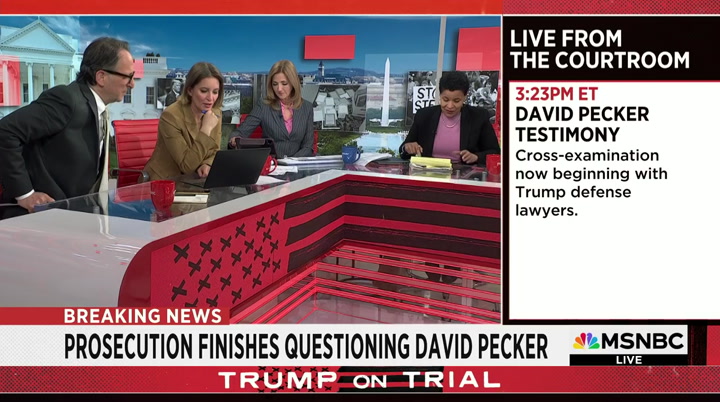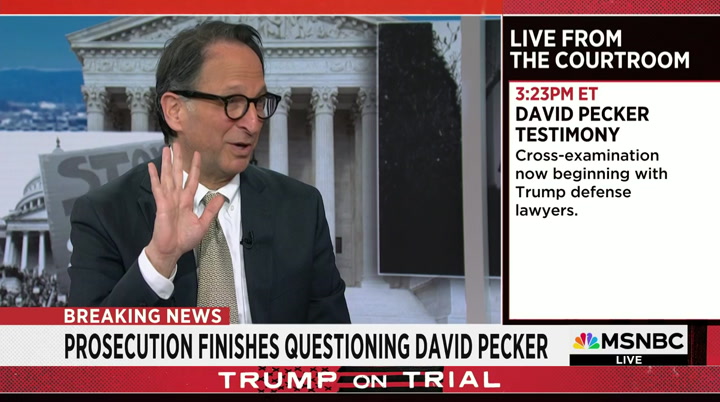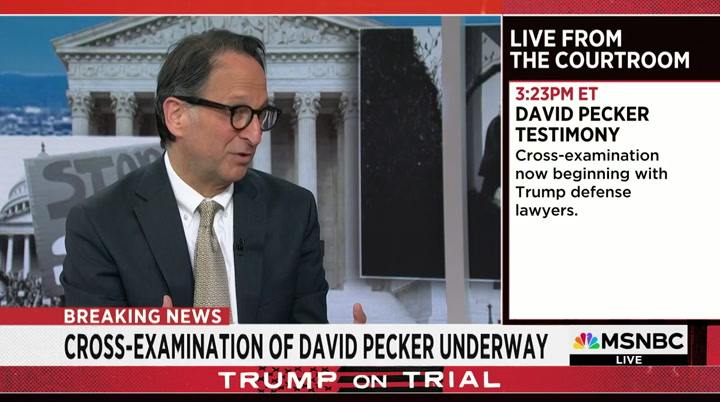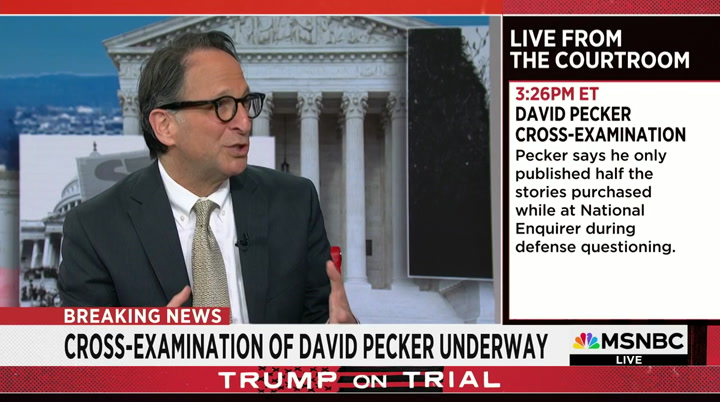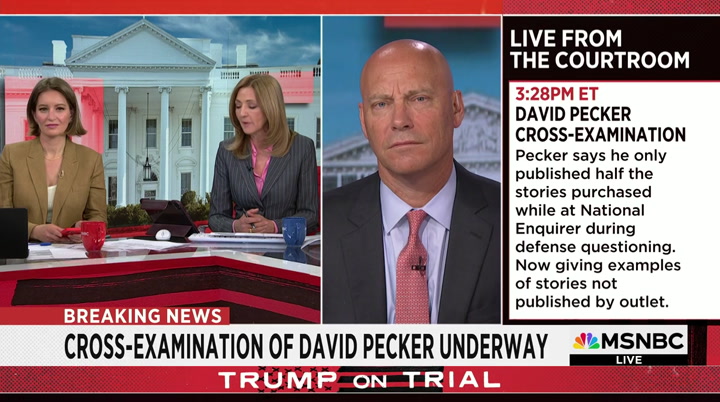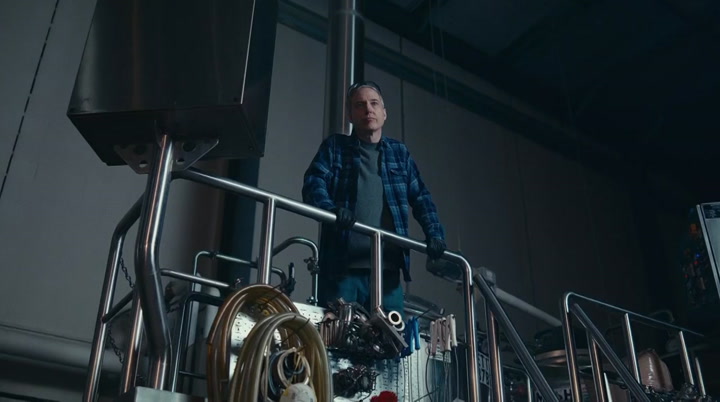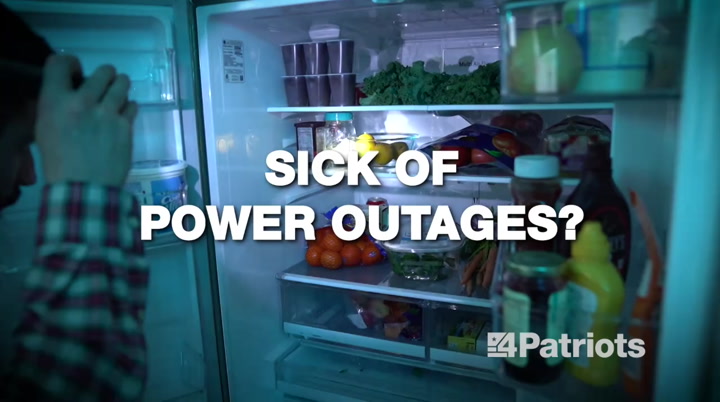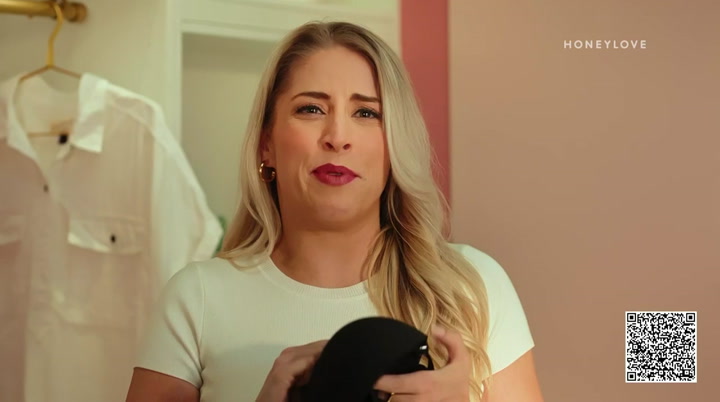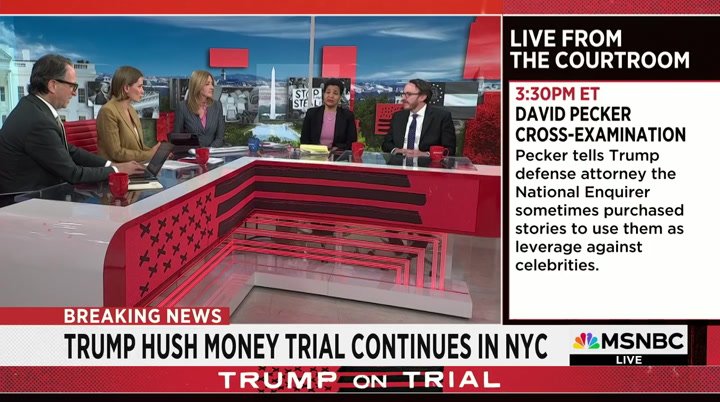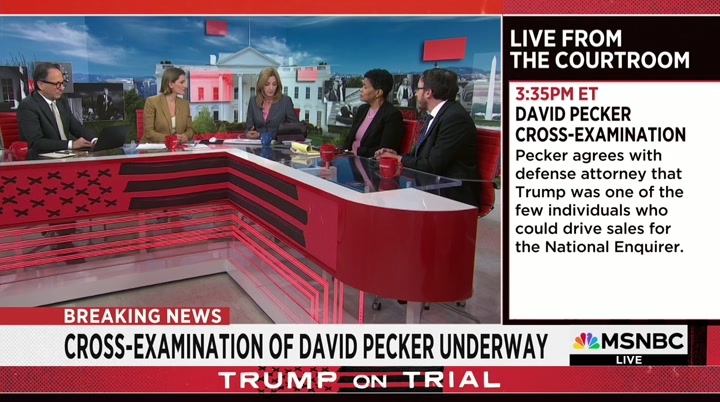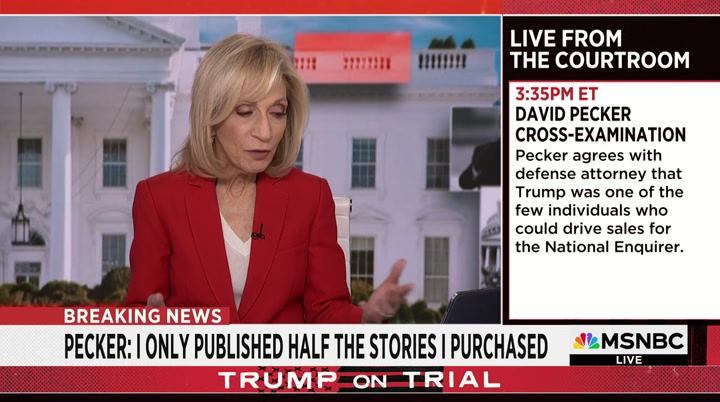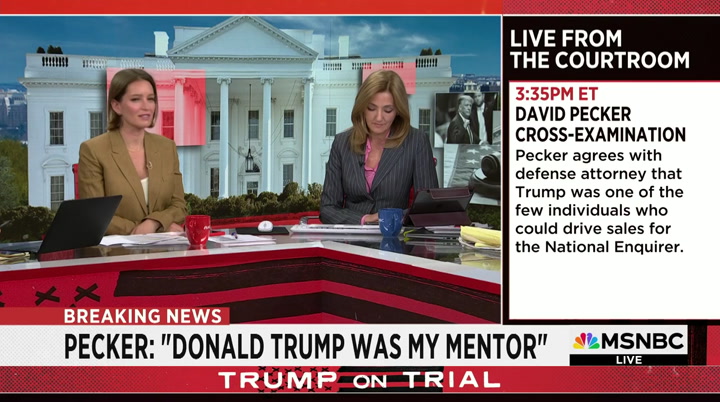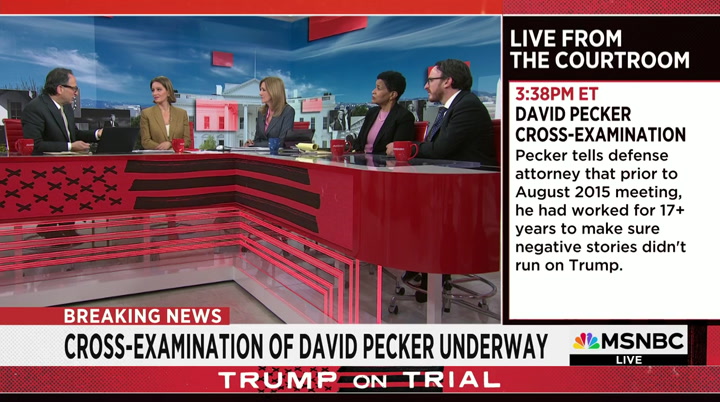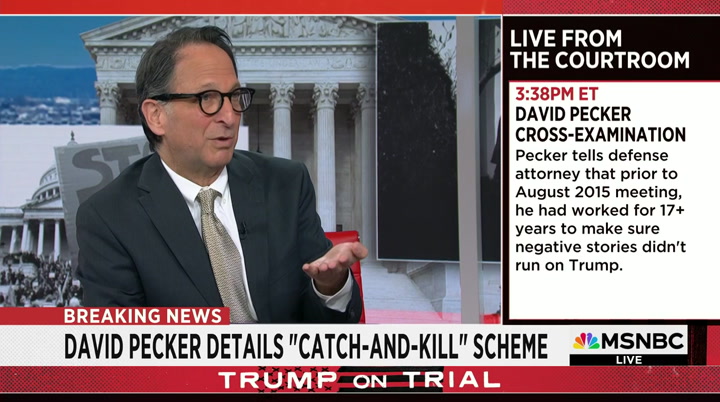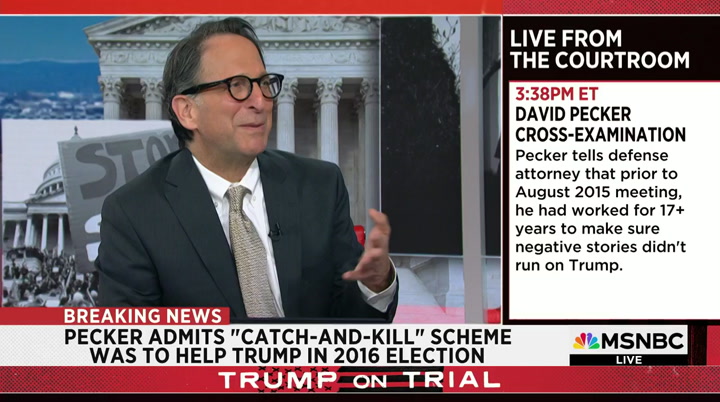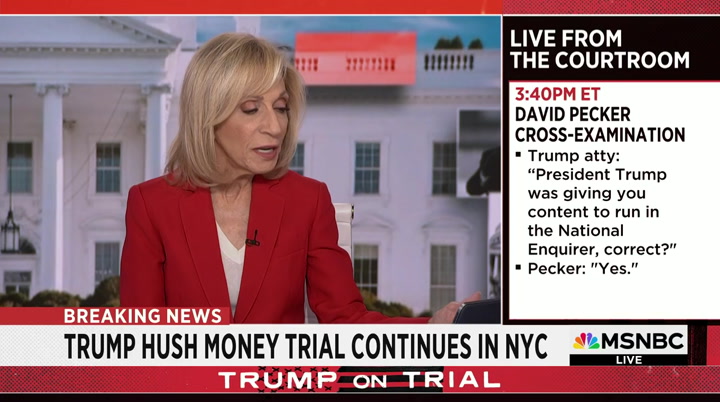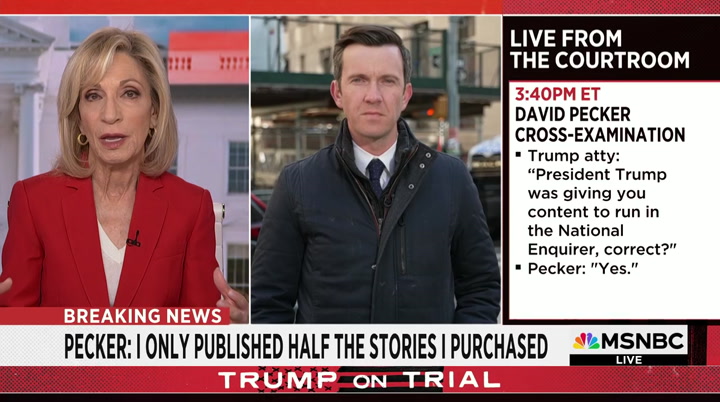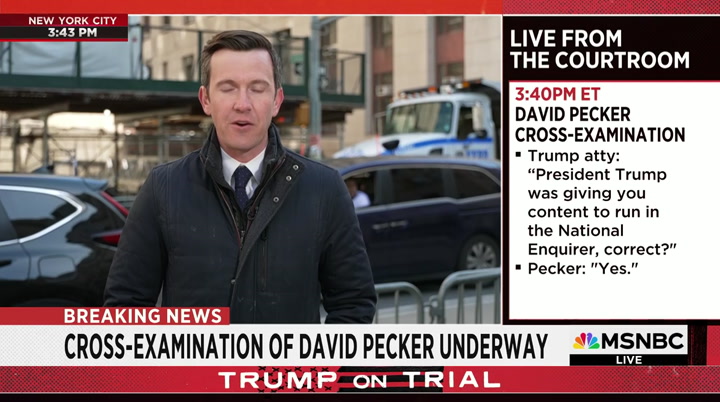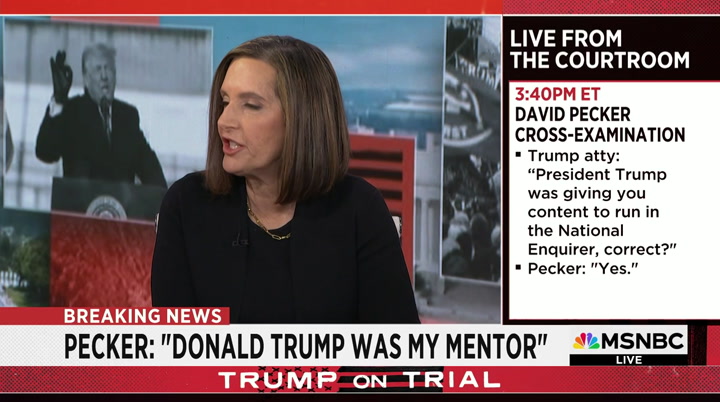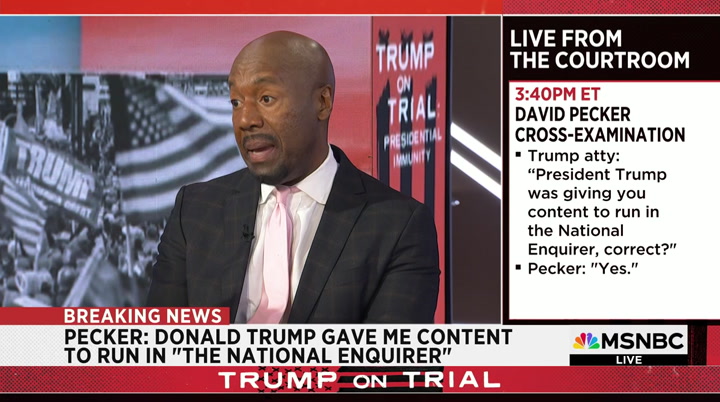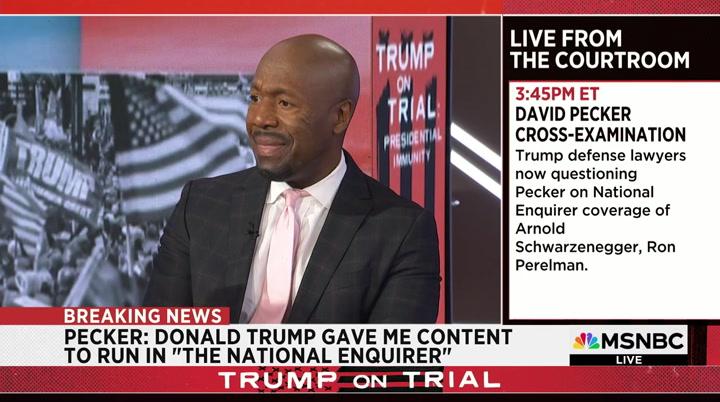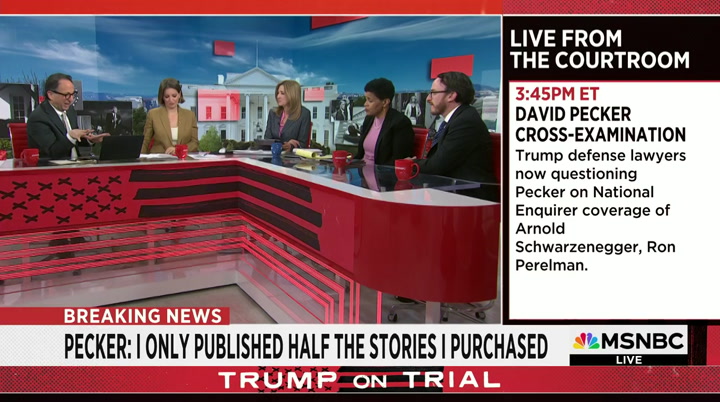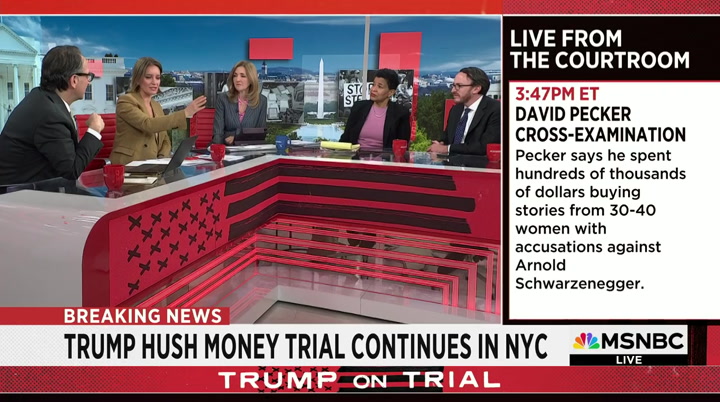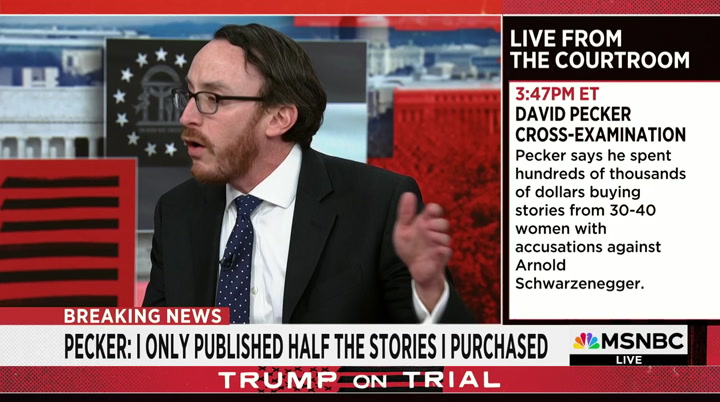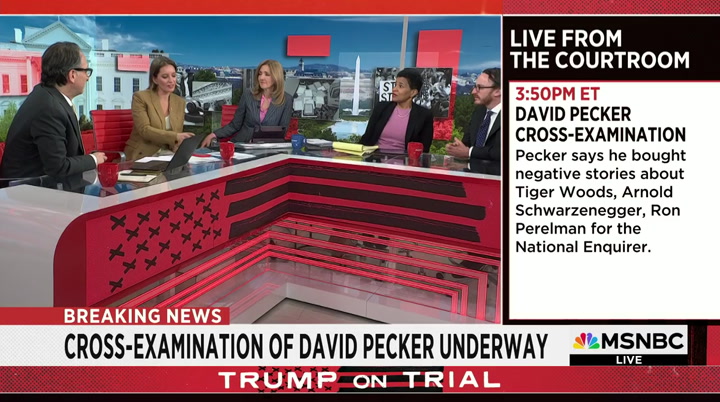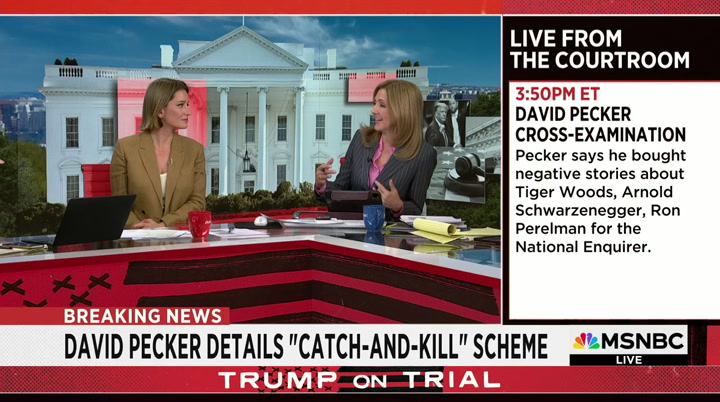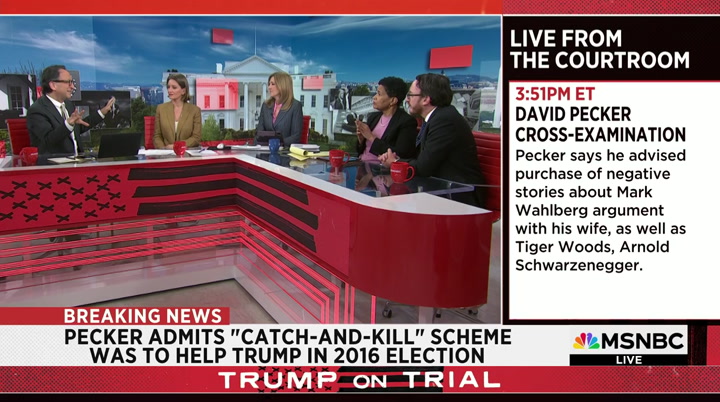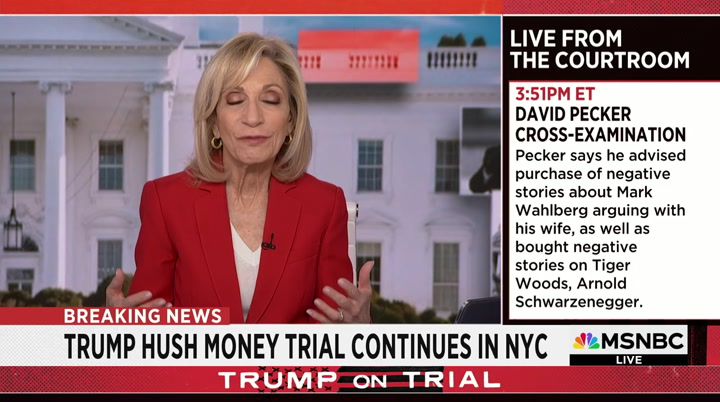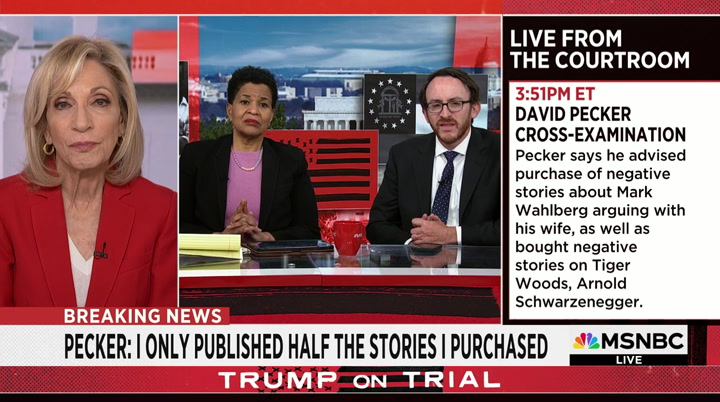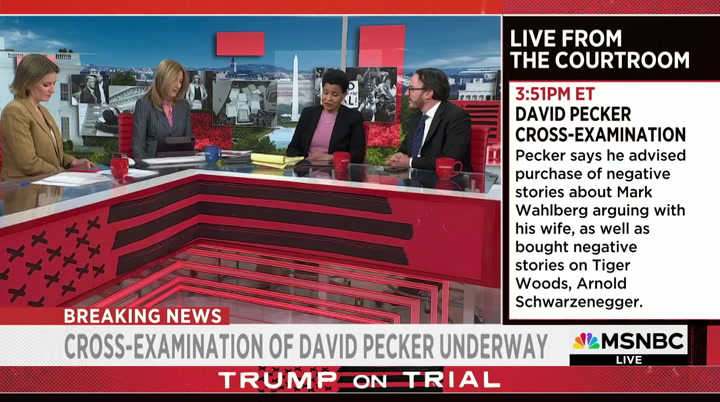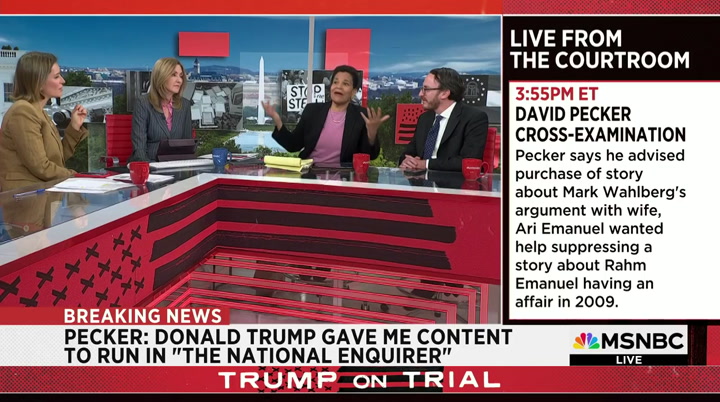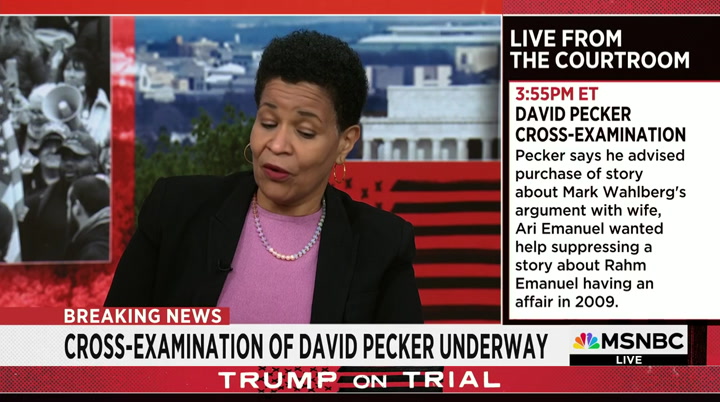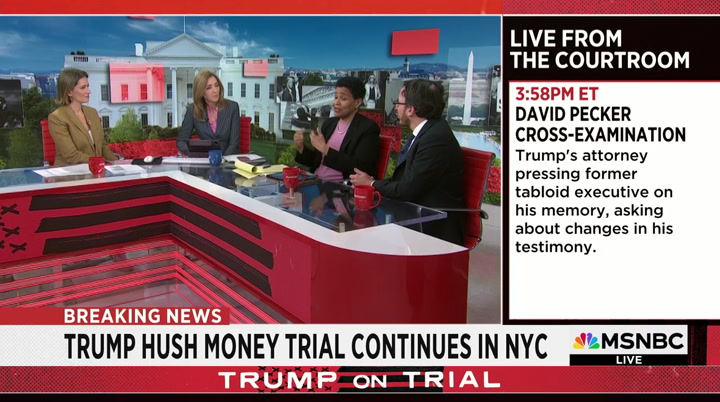tv Trump on Trial Presidential Immunity MSNBC April 25, 2024 10:00am-1:00pm PDT
10:00 am
>> it might. they can make it happen. >> short-term meaning what? how quickly can they do? >> a few weeks. they could do that if they want to, but expect maybe june. i think of bush v. gore, remember how quickly that was decided, and that was clearly a very important decision because it decided who was going to be president. >> all right. i think if there's any indication really quickly as to how soon they want to do it, they did push this argument out for several weeks, which doesn't suggest that they're in any sort of rush to come to a decision. >> catherine christian and charles coleman, eddie glaude, thank you so much for being with us. >> and thank you at home for being with us throughout this historic day. i'm ana cabrera. >> i'm josé diaz-balart. thank you for the privilege of your time. chris jansing, katy tour, andrea mitchell pick up our special coverage next.
10:01 am
good day, i am chris jansing along with my colleague katy tour. this is a historic day for america. a fair and functioning judicial system. today in two courtrooms, two very different cases but with one central character, donald trump and one central question. will there be consequences for his alleged attempts to break the law either now or in the future if he's reelected. >> here in new york city, also even more testimony from david pecker and the hush money trial about the lengths to which he, donald trump and michael cohen, went to protect his image during the 2016 campaign. we're going to tell you exactly what he testified to along with a phone call that david pecker says he received from donald trump three days before the 2016 election. also, how donald trump is reacting and he was reacting. at the same time, in washington, the supreme court spent hours hashing out donald trump's claims of presidential immunity.
10:02 am
the questions of whether a future president is above the law threatening to change the very nature of what it means to be commander in chief. >> joining us now outside the supreme court, nbc's justice and bell correspondent, ken dilanian, along with andrea outside the court is joyce vance, former u.s. attorney. neal katyal, former u.s. solicitor general who has argued before the court many times. also with us, former fbi general counsel and a former member of robert mueller's special counsel team andrew weissmann. joyce, neal and andrew are all msnbc legal analysts. neal, i have to start with you because you were inside there. we could hear it, but you could see it. what is your big takeaway from today? >> well, it was obviously a historic moment. i think that's how people treated it inside the courtroom from the very beginning. you know, president trump's lawyer actually wound up, went
10:03 am
into the courtroom, he sat on the wrong side initially. he wasn't quite as familiar with the court as his adversary, the special counsel's lawyer. it was really two contrasting styles, and i think that's reflected already in some of the earlier reporting making it seem like, well, the strident trump made a lot of points. that lawyer was very strident in contrast to the special counsel who acted almost like a counselor to the court, not as an advocate. went on for hour after hour explaining his position. at the end of the day, i think if i had to count votes and i've seen over 400 oral arguments at the supreme court. it's often hard to predict, and i think this one is a bit hard to predict, but i think some things came out. number one, donald trump's claim that he is absolutely immune from the criminal law i think got pretty much nowhere with the majority of the court. you had justice barrett saying in response to the special counsel's lawyer saying this would put the president above
10:04 am
the la and it would be radical, she said i agree. that was towards the end of the argument. you had the chief justice raising concerns about this as well, along with justice sotomayor who began the argument by saying, look, you've told the lower court if your argument is true, navy s.e.a.l. team six could go out and assassinate the rival of a president under a presidential order and that would be okay. justice sotomayor said are you still sticking with that, and the answer was yes, and justice kagan said, you know, does that mean the president could launch a coup or order the military to launch a coup, the answer was yes. justice ketanji jackson towards the end of the trump lawyer's argument said, wait a minute, you're saying -- i understand your concern about the president being attacked with frivolous prosecutions, but what about the concern on the other side that the president is above the law. so i saw at least five votes for that central proposition that a president is not absolutely
10:05 am
immune from the law. he did get some support from justice kavanaugh who talked about a justice scalia opinion 25 years ago and from justice alito, but i don't think it commanded the majority of the court. here's where i think that the decision is going to go. the trump team had two fallback arguments. one was this idea that every statute has to say, you know, something is a crime, and by the way, the statute applies to the president. that got some purchase, particularly with justice kavanaugh. i don't think it will get a majority of the court, justice barrett pointedly said that's ridiculous. there are only two or three statutes in the entire federal code that mention the presidency. we shouldn't require that. the other thing is this compromise that says, look, there are some acts that are private, not official, and as to those, the president doesn't have immunity. i think the members of the court were somewhat surprised with trump's lawyers' answer to that
10:06 am
in the first part of the argument when he admitted that some of the allegations in the indictment were private acts, not subject to immunity like launching a list of fake electors and the like. several justices raised their eyebrows right when that happened. the special counsel's lawyer michael brie ban picked up on that and really hammered the point home, and i can tell you it took a while, but at 11:55, almost an hour and a half into his argument, he was chilling. he talked about the allegations in the indictment that trump took the justice department, tried to get them to issue false letters to different states about the election problems. those lawyers refused, and that trump then threatened to fire them. at that moment, you could hear a pin drop in the courtroom. it was -- everyone was focused on exactly that. and so if i had to predict where the court's going to go, i think they're going to focus on that and say, look, that's absolutely
10:07 am
not immune. that is what the criminal law is all about. we can't countenance that kind of behavior. now, if you're talking about other things that are within more core presidential duty, then it's a very different matter. the question, the hard question is how long is all of this going to take? the court could issue an opinion as early as tomorrow, frankly, that says that, that says we're not going to go further into all these complicated issues, but just leave it at that and start this trial. or they could take months, write a convoluted opinion that's got to be interpreted by the district court with, you know, more and more proceedings and argument in briefing, and then that could delay the trial past the election. it's all in the court's hands. >> neal, i want to ask you about that and bring joyce in as well. there was the view by several of the justices that it could be remanded to the district court to determine what is an official
10:08 am
act and what is a private act. once they seem to be agreeing that official acts could have immunity and that truly private acts could not, if they had to argue all over again what is official and what is private, that's a district court argument, district court pretrial hearing, then that can be appealed, and then you get all the way back. and i believe neal, you and joyce are the experts on this, that those writing dissents are given as they were in dobbs, are given the time to write their dissents. so this could go to the end of the term, which is the end of june, the beginning of july. neal, then you joyce. >> yeah, i think that's right. so basically i think the way the rules work is they're going to go vote right at lunch and decide the case. the majority opinion will be assigned. if someone's dissenting, the senior justice will -- in the dissent will be able to authorize whoever writes that. and traditionally, the court is given a lot of leeway for the
10:09 am
dissents to take as much time as you want. here i think the chief understands probably the timing here and will try and push for the dissents to be done early. but you know, this could take a while, and that is clearly the trump strategy. i mean, the trump lawyer spent so much time on absolute immunity, but was very clear midway through the argument what he really wanted was this compromise option. he even said send it to the district court not to the court of appeals. that would truncate the proceedings. >> this is a major delay, joyce, just jump in. >> it is a major delay issue, and justice barrett or rather judge chutkan has already told the defendant that there are about 81 days left on the clock. 81 more days for trial preparation even after the case is returned to her. now, that would provide her with time to make decisions, say about the distinction between what acts were official and can't be used and what acts were private and can be used. but beyond that, even if the decision is made -- and i think
10:10 am
neal's assessment is a very good one. if this case goes to trial on a theory that says that only private conduct can be the basis for a prosecution, there are difficult evidentiary issues the justices hinted at, he wants to be able to use evidence of official acts like decisions about who can be the attorney general or the pressure campaign against mike pence as evidence of donald trump's knowledge and intent. all of this involves more delay, more consuming time before trial. >> and katy and chris, you know that we're in such a time of polarization, but this has always happened out here in front of the court and in front of congress, you have protesters and that's what we have here today. >> of course, but you know what i find interesting about that particular sign behind you, andrea, is that it's, you know, directly out of donald trump's mouth. that allegation of fake news, that was coined by donald trump,
10:11 am
and that's what's repeated. which makes it interesting we're talking about election interference and january 6th, it's all about what sort of influence donald trump had. i want to ask you about remanding it back down to judge chutkan. is there a way to have her go through the official acts but then let the private acts as conceded by the trump attorney there just like, you know, the calling of doj to try to get them to send these letters pressuring them or threatening a firing, could that keep going while the rest of it gets sorted out? >> so it's really interesting because amy coney barrett was sort of asking that basically, couldn't you if we just make this distinction between private versus official and we say there's no immunity for private, don't you have enough? couldn't you just streamline the case and go with private? and michael dreeban was like if i have to. you know what you cut out of that, you cut out of that what happened at the department of justice which neal was referring to and sort of how devastating that is.
10:12 am
think about that, that's somebody using his public role to help him in his private game, which is to win the election. that's a more horrible crime than the fake elector scheme. why would you want to cut that out. but yes, there is a way that depending on how the court rules that you could streamline. one thing that i think people should keep an eye out for is if this goes back for the district judge to have a hearing on this issue of what is private and what is official, you may not get a trial before the election. >> because that's going to get appealed, right? >> but wait, yes, it can get appealed. that's what you've been saying. that's what andrea has been saying. if there is not -- if this gets all delayed because an opinion doesn't come out until june, there's -- there definitely is -- and we've all been talking about it's very hard to see how this trial would go. if they send it back for a hearing, the judge can hold a
10:13 am
hearing and it can be a factual hearing and witnesses can be called, and she does not have to wait 81 days. she can say, fine, let's have the hearing, two weeks from now, let's go. >> what does that mean? >> it means that the evidence that donald trump wants to not ever see the light of day can happen in the district court. she could say i want to know more about these allegations. i want to understand the factual record. she can have witnesses testify so it's not a trial, but she can have a hearing to satisfy whatever the standard is about private versus official so that there could be that sort of public hearing and she doesn't -- because it's not a trial where she has said 81 days, but joyce has been referring to, she's not bound by that. >> but is that less likely than you hold hearings and it delays this for months? >> i think the chances of having a trial are slim to none. to use something recent, it's like having an eclipse.
10:14 am
it's very hard to see how that's going to happen. it's possible, but it is not terribly likely. so then you think what are the second best options? you have donald trump's lawyers saying, oh, send it back and make it about this, you know, make a decision about official versus unofficial, and then we can appeal it again. my point is, when it goes back to the district judge, she has leeway to have a factual hearing. and that is exactly what donald trump does not want. >> if donald trump's not elected again, does this trial just go forward as usual unless president biden, if he's reelected pardons him? >> so leaving the pardon aside, this case could go forward under a second term, and the issue is what exactly the court's going to say about immunity. i agree with the point ken dilanian said, which is there are not five justices who say this case is over.
10:15 am
they're not saying that for unofficial private acts that there's going to be presidential immunity. the issue is what is the definition of private versus official, and that's why this -- the argument was somewhat hard to follow because it really got into the weeds about what if you have somebody doing something that seems like it's part of their official acts but their motive or their intent is impure. >> so differentiating private from public acts can get very complicated. >> exactly. and that's why, just to be clear, what michael dreeben was arguing was twofold. he was saying there should not be criminal immunity for official acts except for a very small core function of the presidency. so you don't get to this issue. he said for official acts, there should be no criminal immunity except for things like pardon power, you know, appointment power, sort of very -- things not at issue in this case.
10:16 am
his second argument was that there shouldn't be immunity for unofficial acts and this case only involves unofficial acts. >> and i want to pick up on that point and ask neal another question and joyce here, because neal, one of the examples, the hypotheticals that justice roberts early in the argument against john sauer, the attorney for donald trump, was, well, what if a president appoints an ambassador and then takes a bribe from them, so the appointment of the ambassador is part of a presidential act. taking the bribe is a clearly criminal act. how do you separate those two things? >> yeah, and i think the answer to that really revealed the difference in styles and i think maybe even impact the outcome. so what the trump lawyer said basically was, hey, that's an official act. the president can take a bribe. can't really prosecute him, and the chief and then also other
10:17 am
justices on the court jumped on that, including even justice gorsuch and said that can't really be right that a president can be bribed for the performance of his official duties and get off scot-free. by contrast, michael dreeben, the lawyer for the special counsel took the opposite approach always acknowledging the harm to the other side from his position. at one point, he even said to the court, look, i'm as concerned about executive privilege and undermining the office of the president as anyone. here's why we're striking the balance we've struck. it's the balance that we've had for the last 200 years, and i think that made a lot of headway in the room. so that's why i think the ball game is really whether something that's an official act has to be determined right away or a private act. is that going to be sent back to the district court or will the supreme court give us some clear guidance now as to what's a private act and what's an official act, and how much time are they going to take.
10:18 am
unlike andrew, i think it's possible to have a trial here still, and i'm not giving up on it, but andrew's other point is really smart and worth considering, which is there is a second best solution. if there isn't a trial and trump's lawyer gets what he wants today, which is to send this case back to the district court, judge chutkan can have a hearing with fact witnesses and all of the evidence that liz cheney has been worried about that the special counsel uncovered that she wasn't allowed to uncover as part of the january 6th committee, that can now be presented in a bench hearing before judge chutkan well ahead of the trial. >> i wonder what that evidence is. neal, let me ask you a question about sauer, donald trump's attorney. i noticed that he didn't rebut. he said he had nothing more to add. what was the significance of that? he didn't go for another round. >> yeah, there was an audible gasp in the courtroom because that is like the kind of
10:19 am
theatrics that i guess maybe sometimes play out in a criminal trial in, you know, state court or something. those theatrics do not work in the united states supreme court, and they didn't work in the room. i mean, you know, regardless of whether you think you're right or wrong, michael dreeben made an incredible number of good points. it's actually one of the very best arguments i've ever seen at the supreme court, not because he was, you know, so strident, but actually because he was the reverse. he really just acknowledged the harm from his position, the harm from the other side's position, the long-standing traditions of the justice department and said, look, here's where i think that all comes out. not in some beautiful winston churchillian way, but in an analytic way that really gave the court comfort. so the style contrast was, i mean, immense to say the least, and i do think it will matter in the end because it's not just about style but the substance. trump's lawyer gave nobody any -- no one on the court any
10:20 am
comfort that if -- if they bought what he was selling, the president is going to as justice ketanji jackson said at the end turn the oval office into a crime hub, and that can't possible be what the law is. the criminal laws always protected us from abuse of the highest officials indeed as she and justice kagan said, that's the whole point of the constitution. king george iii did all of these shenanigans, and that's why we have the government we have. >> i mean, justice jackson's point there, joyce, was that if there's no immunity for anything, then people could run for office in order to commit crimes in the oval office. but what did you think of the argument principally from justice alito, and it's understanding where he's coming from and gorsuch as well, that special prosecutors, attorneys general can run amuck, and that people can run for office, leave office and immediately be
10:21 am
penalized by their political enemies. >> this is one of the turning points for this argument. are you more concerned about a president run amuck or are you more concerned about actions that could be taken against former presidents by their successors. he might not be on the same side they're on politically. the answer has to be neither. it can't be an all or nothing answer. it has to be a nuanced balanced answer. that's why having michael dreeben arguing for the special counsel makes a difference. neal is absolutely right. he was the deputy solicitor general on the criminal side of the house if many years. his argument was nuanced. it may not have been flashy or strident, but he is speaking to the justices in the languages that they understand. and this now all comes down to the conference and the interplay between the justices and whether they can fashion a five-justice majority that will, for instance, say when trump was acting as candidate trump, he can be prosecuted maybe less so
10:22 am
when he's acting as president. >> michael dreeben was the deputy solicitor general under justice -- now justice elena kagan. >> i've got a question for andrew weissmann, and this was something that i noticed during the arguments. i believe it was justice gorsuch. he was presenting a hypothetical to dreeben, and he said, what if a president organizes a peaceful sit-in at the capitol and one that disrupts legislation, disrupts the lawful proceeding of votes, would that be criminal? that seemed to be a hypothetical that just sits right next to what happened on january 6th and it felt like dreeben didn't quite have an answer for that. >> so i disagree. >> tell me why. >> exactly. i know that you're asking for that. because i think he did, and a couple of points. one, michael dreeben was asked was he there just in this role as sort of counsel for the
10:23 am
special counsel or were you there speaking for the department of justice as essentially as part of the solicitor general's office and he said i have consulted with the solicitor general and i'm speaking for the department. and it's because he said this -- the case raises issues that go far beyond just a special counsel case. and so that's where his history with the solicitor general's office was so important, and i think that's -- there's something that neal and joyce and i having worked with him know this was a classic masterful dreeben performance. there's no question that it helps with all of the justices in terms of his credibility. i think what he did with justice gorsuch is he brought it back to what that criminal case would look like. at one point, justice gorsuch said, for instance, so you're saying he could be prosecuted for a mistake in terms of doing this, and he said what are you talking about? a mistake doesn't apply to criminal law. there would have to be intent to have obstructed this.
10:24 am
but if he -- and justice gorsuch ultimately had to say, okay, would he be prosecuted if he went to his attorney general and his attorney general said there's no valid basis to hold that meeting. you're doing it to just obstruct congress. i'm telling you that you have the power to do it, but you should not do it because it will interfere with congress, and then the president does it anyway. under that situation, you're then within the criminal law. criminal law is not about a mistake. >> so he went through the layers at the time. >> exactly. think about all of the layers of protection. the president of the united states can consult so many different lawyers, white house counsel, the attorney general, and remember, you have to have the prosecutor staten island e prosecutor staten island decide you have the requirement of the grand jury. you have to prove the case beyond a reasonable doubt in the courts of law and finally michael dreeben said if it's selective prosecution you can
10:25 am
throw it out. there are all sorts of protections for that kind of concern. >> that was an interesting answer because the conservatives said, well, isn't the president in a unique position where he is making or she is making decisions that are uniquely potentially problematic, and you have to make them in the moment and it's a high stakes situation, and that's why presidents need to be immune, and the answer that dreeben had was that, yes, they are in a unique position but also because they have all of this legal advice at their disposal in every moment that they are in office. the best for every decision, yeah. >> and i think the backup to that is one that was somewhat shocking to me because the history is not debatable, and yet you have justice thomas suggesting the opposite. ketanji brown jackson, she was saying and let's look at the history. all of these presidents have managed to make tough calls and not get prosecuted because they're not violating the criminal laws. and when michael dreeben was asked about that, well, what
10:26 am
about this decision, what about that decision, he said, but those are not criminal. there's nothing about even a drone strike that is actually violating the criminal laws, so there they really could look at the history and say, you know what? you don't need this, and nothing about our history suggests that you do need it. the sort of parade of horribles is one that, yes, the first person who's being subjected to this kind of prosecution is raising it, but you don't see a litany of problems here. >> yeah, but kavanaugh was saying it's not about this one, not necessarily about the past ones. he was talking about the future suggesting that we're maybe in a different moment today than we've been in in the past where political prosecutions might become more normal, or the intent to do it. >> including after they leave office and what kind of chilling effect that might have. >> this is the point that joyce is making, which is like, okay, are you more worried about a president doing what donald trump is alleged to have done before, during, and after his
10:27 am
presidency, or do you think you've built enough checks and balances in the system, and certainly based on our history, there's nothing to suggest that presidents need immunity because they've managed to do just fine for over 200 years without it. >> we're all going to stick around. back in washington, neal katyal, thank you so much. andrea and joyce will be back with us in just a few minutes. and while we've been watching this historic day unfold at the supreme court in washington, we're also monitoring history in new york. trump's hush money trial just hit a lunch break after dramatic testimony from former "national enquirer" publisher david pecker. much more on that when our special coverage continues. whenr special coverage continues oks l. "paint the bathroom, give baxter a bath, get life insurance," hm. i have a few minutes. i can do that now. oh, that fast?
10:28 am
remember that colonial penn ad? i called and i got information. they sent the simple form i need to apply. all i do is fill it out and send it back. well, that sounds too easy! (man) give a little information, check a few boxes, sign my name, done. they don't ask about your health? (man) no health questions. -physical exam? -don't need one. it's colonial penn guaranteed acceptance whole life insurance. if you're between the ages of 50 and 85, your acceptance is guaranteed in most states, even if you're not in the best health. options start at $9.95 a month, 35 cents a day. once insured, your rate will never increase. a lifetime rate lock guarantees it. keep in mind, this is lifetime protection. as long as you pay your premiums, it's yours to keep. call for more information and the simple form you need to apply today. there's no obligation, and you'll receive a free beneficiary planner just for calling.
10:29 am
if you have moderate to severe ulcerative colitis or crohn's disease... put it in check with rinvoq... a once—daily pill. when symptoms tried to take control, i got rapid relief... and reduced fatigue with rinvoq. check. when flares kept trying to slow me down... i got lasting steroid—free remission... with rinvoq. check. and when my doctor saw damage,... rinvoq helped visibly reduce damage of the intestinal lining. check. for both uc and crohn's: rapid symptom relief... lasting steroid—free remission... and visibly reduced damage. check. check. and check. rinvoq can lower your ability to fight infections, including tb. serious infections and blood clots, some fatal; cancers, including lymphoma and skin; heart attack, stroke, and gi tears occurred. people 50 and older with a heart disease risk factor have an increased risk of death.
10:30 am
serious allergic reactions can occur. tell your doctor if you are or may become pregnant. put uc and crohn's in check... and keep them there with rinvoq. ask your gastroenterologist about rinvoq and learn how abbvie can help you save. nothing dims my light like a migraine. with nurtec odt, i found relief. the only migraine medication that helps treat and prevent, all in one. to those with migraine, i see you. for the acute treatment of migraine with or without aura and the preventive treatment of episodic migraine in adults. don't take if allergic to nurtec odt. allergic reactions can occur, even days after using. most common side effects were nausea, indigestion, and stomach pain. it's time we all shine. talk to a healthcare provider about nurtec odt from pfizer. when others divide. we unite. with real solutions to help our kids. like community schools. neighborhood hubs that provide everything from mental health services to food pantries. academic tutoring to prom dresses. healthcare to after care. community schools can wrap so much around public schools.
10:31 am
...and through meaningful partnerships with families, they become centers of their communities. real solutions for kids and communities at aft.org norman, bad news... they become centers of their communities. i never graduated from med school. what? but the good news is... xfinity mobile just got even better! now, you can automatically connect to wifi speeds up to a gig on the go. plus, buy one unlimited line and get one free for a year. i gotta get this deal...
10:32 am
that's like $20 a month per unlimited line... i don't want to miss that. that's amazing doc. mobile savings are calling. visit xfinitymobile.com to learn more. doc? . in just the last few minutes, former president donald trump's new york hush money trial started its lunch break. all morning prosecutors have been questioning former "national enquirer" publisher david pecker about the catch and kill scheme to bury stories about negative stuff happening to donald trump including the allegations from karen mcdougal and stormy daniels, who both alleged affairs with donald trump. and for the first time today, our team of reporters who have been inside the court are now with us. joining us now msnbc legal correspondent lisa rubin, "new york times" investigative reporter suzanne craig, nbc
10:33 am
national law enforcement and intelligence correspondent tom winter, lisa and tom were inside the courtroom. sue was in the overflow room set up for reporters to observe the proceedings and joining us here at the table is former manhattan district attorney catherine christian. catherine and sue susan are msnbc contributors. we also have andrew weissmann still with us. lisa, i do want to begin with you and talk to you about what has been happening inside the courtroom today. we've been in supreme court hearings, oral arguments all day, so the attention has not been focused inside this courtroom, but as i understand it, david pecker has been revelatory. it's been a very interesting day for the prosecution, and they just went to break on news that pecker said that he believed what donald trump was trying to do, the stories that he was trying to get buried and not have -- not see the light of day were not for the benefit of protecting his family but as david pecker says for the benefit of protecting his campaign.
10:34 am
>> that's entirely right. katy, i'm going to start with what we ended with, and then go backwards because what we ended with was so impactful. david pecker was talking about a conversation that he had in person with trump at trump tower in january of 2017. he said rhona graff called him and invited him to come to trump tower and meet with the former president. when he got there, trump was receiving a briefing from, among other people, jim comey, mike pompeo and reince priebus. understanding at that point he was the president-elect. he turned to the business at hand and asked david pecker how's our girl, and the girl he was referring to was karen mcdougal. when pecker assured him she was writing her article, she was writing articles for certain of their publications, she was quiet, she was fine, and trump then turned to him and said, i want to thank you for dealing with the mcdougal situation and
10:35 am
the doorman at trump tower who alleged that trump had father's day an illegitimate child. that's a story that even the d.a. today said they don't believe and david pecker didn't believe, but nonetheless, trump was extraordinarily thankful to david pecker for handling those situations. i want to go back a little bit now and tell you a little bit more about what david pecker revealed about himself because we learned today that the catch and kill scheme he was immeshed in with donald trump and michael cohen, that was not his first rodeo. he had done so at least once before with respect to then governor and previously candidate arnold schwarzenegger who had been affiliated with two tiles that pecker bought. schwarzenegger invited him to a meeting and basically said to him i would like to be affiliated with these magazines still. i've been on 70, 80 of its covers. i'd like to be an editor at large for you and in exchange, i'd like you to let me know if any information crosses your desk and help me ensure that it doesn't get published.
10:36 am
well, lo and behold, the "national enquirer" came into possession about schwarzenegger fathering a child outside his marriage, that story turned out to be true. the woman was so dissatisfied that the "enquirer" never published it, she went to the los angeles times. at that point he became embroiled in an investigation about his own payments to arnold schwarzenegger which got him in league hot water and in particular became a campaign finance issue for him. so he knew very well going into this arrangement that he, cohen, and trump set up in august of 2015 that campaign finance and election law was a particular risk for him and one that he did not want to trigger. that's why -- and this goes to the third big thing we learned today -- donald trump didn't cheap out. we've always all assumed that donald trump was supposed to pay david pecker back for the payment ami made to karen mcdougal and because trump is
10:37 am
notoriously frugal, he was the one who backed out of that deal. not so, david pecker told us today he was the one who backed out of a planned assignment of karen mcdougal's life rights to donald trump and a repayment by donald trump using two pass room entities. why did he pass on that? based on a conversation he had with ami, the contents he did not reveal in court, he decided that was not a good idea and that is also why david pecker did not pay off stormy daniels. >> these are the kinds of stories that obviously are riveting for those of us who are just reading all of this in the blog that you all are keeping for us. it also is very important it keeping the attention of jurors. there are not usually trials with this kind of insight into this world that is in and of itself fascinating. tom, what are the other examples that pecker said his company had
10:38 am
disguised the hush money payment to karen mcdougal as a deal for services, right, that she would perform for american media, the parent company. it included ghost writers being hired to write her stories. it guaranteed she would be put on magazine covers. they would publish fitness columns. here's what david pecker said about that, quote, i don't have a problem in doing everything else that was requested, writing for the magazine, cover of the books, the fitness titles, $150,000, who is going to reimburse me for this. and then later when pecker says he approached michael cohen about that reimbursement he was told why are you worrying. i'm your friend and the boss will take care of it. the boss, of course, being donald trump. talk about the significance of this, but i'm also curious how the jurors were reacting to this because at one point you described their reactions like a tennis match. >> reporter: that's exactly right. we saw that a couple of times as the testimony kind of went back
10:39 am
and forth, you'd see the jurors shift their attention to the prosecution, then back to david pecker on the witness stand. i think an important thing to keep in mind here, you mentioned that idea of i'm your friend, the boss will take care of you. that's a line that came up at least four or five times during the course of the testimony this morning, tied to several specific instances where pecker says that michael cohen was kind of like, hey, don't worry about this, you know. i'm your buddy and the boss, donald trump, will take care of you. the boss -- he didn't specifically say donald trump, but the boss he was implying was donald trump. i think when you take a step back from all of this, for the jurors, for those of us that have covered this for the last five, six, years, the over arching scheme of this is not new, that there were payments made to these women, obviously not new, that michael cohen was involved, he pleaded guilty to that in a courthouse a block or so diagonally from me. the details of that have been public for some time, what i think the jurors were able to see today and what we're reporting on today, the back and forth and just how involved the
10:40 am
former president, then candidate, was involved in this and how much access david pecker had to the trump world, how much he was relied upon by trump to be somebody who would look out for him. there were boxes that he says were mostly filled with old magazine clips or old articles but boxes that ami had that pertained to the former president. boxes that michael cohen said to david pecker, hey, we want those things back in case you sell the company or something ever happens to you. that was an interesting note that played out in court. so i think the details of this and the discussions with it, one anecdote of that, folks might remember this, an active shooter and a question as to whether or not it was a terrorist attack in the transition period after trump's election in 2016. james comey's in the office. mike pompeo is in the office. president-elect donald trump is in the office and he brings david pecker in there, and he says to both of them, he probably knows more than all of you know. so that just perhaps illustrates
10:41 am
for the jury, according to his testimony, pecker's testimony, just how involved and just how much of a key he had to the trump orbit and the trump world and how he was out there as a spotter to see if there was going to be any type of stories that might pop up. obviously after the access hollywood tape the revelation that stormy daniels and her story might be out there was of paramount concern. >> wasn't there a point about david pecker describing trump's interest in getting boxes of materials about karen mcdougal. he was worried, he said, about what would happen if pecker got hit by a bus? >> reporter: right, that's exactly right. basically saying if something ever happened to his kind of confidant, david pecker, what would happen to those boxes that ami had. we didn't get into specifics about what was in there. as i mentioned, it was just something he said, well, there was some old magazine clips or old newspaper clips. that's what most of it was. he didn't say that's what all of it was. were there any other stories of
10:42 am
things that cropped up over the years, true or untrue that were in there. at this point in the testimony, we don't know. but of course as we've been reporting and as lisa mentioned, david pecker will be back on the stand when we get done with this lunch break projected for based on what the prosecution was talking about another hour on the stand. what other details out of this, we may not know. one thing the jury did hear is arguments between the parties as to whether or not it could be admitted were apparent text messages that dylan howard, then the chief content officer, kind of the point man as far as is figures out what these women were saying, he apparently texted a relative on election night that it looked like he was going to be elected. he said, oh, good, he can pardon me. that basically he wasn't going to get in trouble for any sort of campaign finance scheme. i think that speaks to a point that lisa was making, at least on our internal notes, the idea
10:43 am
that this is germane to the fact that these individuals knew that there was something here that was potentially illegal and it also speaks to something referenced before, not pecker's first rodeo with this idea of potentially catching and killing stories for a candidate for office, obviously speaking of then california governor arnold schwarzenegger. >> sue, what about donald trump during these moments in the trial during this testimony, what was he like, sue? >> i think he's been -- >> sue, sue. >> he hasn't been much different than other days i have to say. >> what was that? >> i'm just directing the question to you, my friend. >> oh, good, good, sorry, the audio cut out there. he's been like he's been on other days. he's not been animated. he has been paying attention, and i just want to mention another crucial moment that happened this morning. it really, i think, may go to the heart of this, and it's about the -- you know, the campaign finance laws and the violation.
10:44 am
karen mcdougal, when she was dealing with american media, with the "national enquirer," she was paid and she was given a job in quotation marks, but it really wasn't that. it was a payment to silence her, and she had an agreement that she would write articles, but the heart of that payment really was to keep her silence and david pecker in doing that, in giving her sort of a job, he wanted to make sure because he did that to make sure that he had some sort of paper that said -- that the job was there because it could be looked at as a potential violation of campaign finance laws, and he said the company disguised the payment. this is important because they have to show that the conspiracy that they accuse trump of participating in was conducted through unlawful means. so i think that that could become really important in terms of what karen mcdougal, you know, what the arrangement was for and how she was paid. >> chris, could i add something? >> go ahead, yeah. >> i was just going to say, i want to amplify something that
10:45 am
tom said a couple of minutes ago. when we were talking -- i'm sorry, go ahead. >> we're having audio issues, lisa, just tell us what you want to add. >> i was going to say that josh steinglass is a very skilled trial lawyer as catherine and i have discussed off camera a number of times. when we were talking about the fact that david pecker was told by michael cohen, we want to purchase these boxes because if you get hit by a bus we need to know we're going to be safe. he did that because that is a precursor to an audio tape. michael cohen recorded a tape with donald trump when trump is heard saying how much do we have to pay for this, 150k to our friend david, and then he says something like if he gets hit by a bus or something, trump is like pondering in his head, do we make the payment or does he make the payment. the point of the testimony this morning is steinglass is already
10:46 am
foreshadowing that what cohen is having to say in interpreting that tape is credible because david pecker remembers cohen saying the same thing to him in realtime. >> there was another great moment where david pecker is finally -- you can tell he's getting fed up with having to make these payments. he's made the payment to the doorman, he's hired in quotation marks karen mcdougal, and trump and michael cohen comes to him and they want him to cover the stormy daniels payment, and he's just like, i've had enough. he says i'm not a bank, and he also has another concern where he doesn't want to be seen paying a payment to a porn star because his magazine is in walmart. it's in walmarts across the country, and he doesn't want to lose or jeopardize that deal, so he's finally saying enough's enough, and he -- michael cohen actually goes to david pecker, has a discussion about stormy daniels. michael is begging david pecker to pay the money to stormy daniels, and he says no, and then he wants -- he wants david pecker to go and talk to donald
10:47 am
trump about who's going to pay it. >> i think that's interesting about walmart and target notorious for being very selective about what they would put in their stores. they don't want it to offend families and this is where david pecker said there was a line. let me ask you, catherine about direct evidence linking donald trump to this stuff. pecker's testifying about conversations he's had directly with donald trump. he's testifying to what donald trump has told him. there's a moment where a wall street journal article comes out about karen mcdougal, but pecker says donald trump was very upset saying how could this happen? i thought you had this under control. either you or one of your people have leaked this story, and pecker said to trump, i said, donald, there was no way on earth i would leak the story. >> it's very good. it's direct evidence. i was in supreme court land earlier, so i was thinking the defense perspective. i heard that cohen said the boss will take care of it. michael cohen came to pecker, so
10:48 am
this sort of feeds into the defense cohen did it, and so i'm wondering how much testimony pecker has given where it was directly directed to two things by the boss trump as opposed to cohen. but a lot of what he has talked about with his direction with trump i think sort of helps prove beyond a reasonable doubt that trump himself had the intent to commit or conceal that other crime. >> including a phone call between david pecker and donald trump three days before the election. >> exactly. >> absolutely, and afterwards saying thank you for helping me on the election. i mean, so it tie it is to the campaign. >> not melania. >> it shows that he knows what's going on. you don't have him saying, you know, one of the things you do when you're in the prosecution is you ask the jury in closing, imagine that you had an innocent person. ask what they would be saying at this time. they would be saying to mr.
10:49 am
pecker, what are you talking about? what scheme to buy stories. you would be -- if you thought it was only to save from melania, you would be saying, okay, there was a scheme, but obviously we have to keep it up now because i'm concerned about my wife. you say what would you be saying if the defense is right. does the evidence fit with that story? >> how does blanche cross examine pecker? >> he can do the you're a sleaze bag, but basically pecker has admitted to it. he's owned it. i did checkbook journalism. what he's going to try to do is what i said, how much was it him and cohen and cohen directing him as opposed to my innocent client, donald trump. that's his only way of doing that. even that tape which people say is the bombshell, unless we've only heard an excerpt of it, cohen is saying when trump says cash, he says no, no, no, i got it. so that's the defense perspective.
10:50 am
so that's their only chance because they can go and, you know, when you've lied because your whole career is just putting lies, so liar, liar, liar, but it speaks for itself, if you can corroborate what pecker is saying, cohen is saying, and all the other documents. >> you also have any number of people who have been in the courtroom who have described him as credible that people seem to be paying very close attention. >> he's his authentic self. >> it's a very difficult cross and just to build on what catherine said because i think you have to do that, you have to keep sort of putting michael cohen as central as possible, but the other is to do what's called a safe cross, which is just to is to do a safe cross, which is just to point out what he hasn't testified to. so, you know, if he doesn't say anything about the actual 34 false documents that are at the core, just to say you didn't say anything about that, you didn't know when they were created. you didn't see them. you don't know who signed them. you know, just to bring the jury back to that to say, okay, there's this story, but let's just focus on something very
10:51 am
specific, and that's sort of a safe cross, because this is somebody who, you know, you don't know what else he has, and, you know, that's notable, as many people pointed out that donald trump has attacked lots of people, lots of people in the court system, but not this witness. >> still not technically allowed to, even though i know he's violated that or seems to have violated that gag order. >> the old quote from one of his colleagues, which is david pecker knows where the bodies are buried. there's a lot more that could come out. tom winter, sue craig had to run back into court. the lunch break is almost over. we're going to head back to today's historic arguments before the supreme court, and how the justices seemed to receive trump's claims of immunity. one reporter who was inside the courtroom joins us after this. you're watching our special coverage on msnbc. coverage on msnbc. from afib notd by a heart valve problem,... ...we're going for a better treatment than warfarin. eliquis. eliquis reduces stroke risk.
10:52 am
and has less major bleeding. over 97% of eliquis patients did not experience a stroke. don't stop taking eliquis without talking to your doctor as this may increase your risk of stroke. eliquis can cause serious and in rare cases fatal bleeding. don't take eliquis if you have an artificial heart valve or abnormal bleeding. while taking, you may bruise more easily... ...or take longer for bleeding to stop. get help right away for unexpected bleeding or unusual bruising. it may increase your bleeding risk if you take certain medicines. tell your doctor about all planned medical or dental procedures. the number one cardiologist-prescribed blood thinner. ask your doctor about eliquis. oh, yeah, man. take it from your inner child. what you really need in life is some freakin' torque. what? the dodge hornet r/t... the totally torqued-out crossover. try killing bugs the worry-free way. not the other way. zevo traps use light to attract and trap flying insects with no odor and no mess. they work continuously, so you don't have to.
10:53 am
zevo. people-friendly. bug-deadly. (screams) bleeding gums are serious, jamie. dr. garcia? woah. they're a sign of bacterial infection. crest gum detoxify's antibacterial fluoride works below the gumline to help heal gums and stop bleeding. crest saves the day. crest. - i got the cabin for three days. it's gonna be sweet! what? i'm 12 hours short. - have a fun weekend. - ♪ unnecessary action hero! unnecessary. ♪ - was that necessary? - no. neither is a blown weekend. with paycom, employees do their own payroll so you can fix problems before they become problems. - hmm! get paycom and make the unnecessary, unnecessary. - see you down the line. during the supreme court's
10:54 am
historic arguments on donald trump's broad claim of presidential immunity, the former president's attorney argued trump's efforts to overturn the 2024 election were official acts while in office. justice kagan pushed back, askeding hypothetically, what if the president used the military to keep the presidency. >> let's say this president who ordered the military to stage a coup, he's no longer president, he wasn't impeached. he couldn't be impeached but he ordered the military to stage a coup, and you're saying that's an official act. >> i think it would depend -- >> that's immune? >> i think it would depend on the circumstances. if it's an official act, there needs to be impeachment beforehand. >> an official act is an unofficial act? >> on the way you've described that hypothetical, it could well be. >> joining us now, two reporters who covered trump's actions on january 6th. carol leonnig, "washington post"
10:55 am
national investigative reporter, and msnbc contributor, and mark joseph stern, slick senior writer who was at the supreme court for the arguments today. and, mark, because you were in court and because you covered january 6th, where did you see the key confluence there? we've talked a lot about different examples that were given, one of them that we just heard, but i'm very curious given your firsthand experience in both of these historic moments, what your take away is. >> so i think that the five men on the court, the five male conservative justices view january 6th itself as less of a threat to democracy than jack smith's efforts to hold trump accountable for january 6th. i saw the five conservative justices repeatedly minimizing what occurred on january 6th right across the street from me, suggesting that the real threat here was the biden
10:56 am
administration setting this terrible example of prosecuting a former president. brett kavanaugh, sam alito and clarence thomas think it's unconstitutional. brett kavanaugh sounded outraged at its very existence, and that left the four women justices to clean up the mess with the great hypothetical you just played, some really searching questions from justice barrett about the line that trump's attorney was trying to draw here, but they are just four votes and at the end of the day, i think there are clearly at least five votes to prevent this trial from moving forward anytime soon. >> so, carol, part of the arguments today center on what is an official act, what is a not official act, what is core to the presidency, and what is not core to the presidency. in your coverage of january 6th, the lead up to january 6th and the aftermath of it, how did you view those arguments today? how did you hear that questioning? >> well, first i thought it was really interesting the way the very very experienced and perfectionist appellate counsel
10:57 am
for the special counsel, mike breeben presented the way in which these things actually go down in trial. there are officials acts in which the president is interacting with his official government partners, the department of justice, the acting attorney general, the vice president. and that those may, indeed, be in some people's view, those contacts are official acts when he was pressuring pence not to certify the election, when he was trying to get his department of justice to fraudulently claim fraud against all the evidence in georgia, to stop the election from being certified. those may be viewed as official acts, he doesn't necessarily agree with that, but that part of the story has to be told to a jury in a trial to describe all the unofficial and private acts that donald trump clearly was engaged in during this time period as well to try to overturn the election results according to the indictment. those include reaching out to his campaign, having his
10:58 am
campaign sort of advise, rudy giuliani create this fiction about a fraudulent election, and create fake electors who would submit their claims of being electors against the actual facts so that they could challenge and delay the actual certification on january 6th. so with dreeben was saying in essence is, look both of these things are acts the former president took. some you could argue are official, some are unofficial, but to tell the story to the jury we have to explain all of it. maybe he'll only be culpable for those things that are so called unofficial acts. >> carol and mark, thank you both so much. the lunch break is almost over in new york, and so we're going to be returning to donald trump's hush money trial and boy has it been fascinating so far today. you're watching special coverage on msnbc. you're watching special coverage on msnbc that gets you noticed
10:59 am
turns hot lots into homes. ♪♪ fastsigns. make your statement. (screams) bleeding gums are serious, jamie. dr. garcia? woah. they're a sign of bacterial infection. crest gum detoxify's antibacterial fluoride works below the gumline to help heal gums and stop bleeding. crest saves the day. crest. students... students of any age, from anywhere. using our technology to power different ways of learning. so when minds grow, opportunities follow. ♪ nice to meet ya. my name is david. i've been a pharmacist for 44 years. when i have customers come in and ask for something for memory, i recommend prevagen. number one, because it's effective. does not require a prescription. and i've been taking it quite a while myself and i know it works.
11:00 am
and i love it when the customers come back in and tell me, "david, that really works so good for me." makes my day. prevagen. at stores everywhere without a prescription. ♪ ♪ makes my day. [ gasps ] way day's coming! wayfair's biggest sale of the year is back for three days only may 4th through 6th. get excited to get up to 80% off. ooo, yes. plus score free shipping on everything. [ grunting ] [ bell rings ] and surprise flash deals. all way day long! wayday starts may 4th so mark your calendar. and start filling your cart! ♪ wayfair. every style. every home. ♪
11:01 am
11:02 am
colleagues, katy tur, and andrea mitchell who is with us from washington. after a morning in a manhattan courtroom that has been variously described as fascinating, riveting and frankly franchising, donald trump's hush money trial is set to get back from lunch in 15 minutes. david pecker, former publisher of the "national enquirer" will be back on the stand. here's where he left things. he said that trump seemed to be concerned with his campaign, not his family. and prosecution may still have hours to go. >> it's a really interesting exchange on that that we'll get into. before the break, pecker made a huge assertion that everything he did for donald trump was about protecting the campaign, the payments, buried stories, all of it. trump himself is watching all of this unfold inside the courtroom. and he made it clear he'd rather have been in d.c. today. where the supreme court heard
11:03 am
historic oral arguments tied to his claim of presidential immunity. it was a very strange split screen today. as "politico" puts it, trump's ability to command the attention of every branch of the government he once again seeks to lead. let's bring in nbc's vaughn hillyard, former federal prosecutor, and msnbc legal analyst, paul butler, and former manhattan assistant district attorney catherine christian, and andrew weissmann, a former fbi general counsel and former member of robert mueller's special counsel team. both are also msnbc legal analysts. chris, i'll let you ask the first question. >> vaughn, let's go to you. this trial is expected to pick back up any minute now. we have gone over pretty clearly what we saw this morning, and that key point that at least according to david pecker this was about donald trump protecting his campaign, not about him not wanting to be embarrassed, have his wife be embarrassed or a problem with his family. but talk about where you think
11:04 am
we're going next. >> reporter: this is entirely about the narrative that the prosecution is bringing forward to the jury, and that is where the karen mcdougal story this morning was so crucial because david pecker testified to the extent that donald trump was explicitly concerned about his campaign, and that $150,000 payment to karen mcdougal from ami to silence her story, noting that, well, david pecker was talking with michael cohen through all of this, michael cohen would need the permission to have donald trump to ultimately authorize any transaction, any exchange of money noting at one point there that this was a, for him, michael cohen did not have to have authorization to buy or acquire or spend any money, quote, without mr. trump's approval even saying when donald trump, when he would go to lunch with michael cohen, that michael cohen wouldn't pay, david pecker would pay, which hits at the heart of david pecker's testimony, that he got the tacit
11:05 am
acknowledgment. and those two meetings that came after the 2016 election in december and in january of 2016 and '17 respectively, at trump tower between david pecker and donald trump. there was a conversation after david pecker talked with michael cohen, and michael cohen told him he had not been reimbursed for the stormy daniels payment, he asked david pecker to talk on the sidelines with donald trump, and his testimony here just in the last hour to the jury was that he told donald trump, quote, when i went back to mr. trump's office i said to him that michael cohen is very concerned about his bonus this year and i want you to know he's very loyal. he has been working very hard for you. no explicit statement that there was a specific conversation about stormy daniels, apparently, but at least there was a conversation about the
11:06 am
extent to which michael cohen's bonus was a concern and the fact that he had been loyal to him. the question here coming out of the lunch break is does the prosecution hone in on exactly what those conversations between those two actually meant. >> that's what's so interesting. we all know. we have covered this forever now. donald trump doesn't use e-mail. he hasn't used text until relatively recently. there's not a paper trail with donald trump. a lot of this has to be conversations and corroborating conversations, people who tell the jury about the conversations they've had with donald trump. it can't be necessarily a document, here's what donald trump said on the record. it might be a signature on a check or an invoice, but they're not going to see an e-mail exchange with donald trump's handle on it. >> david pecker was the eyes and ears for the campaign. he's the eyes and ears for the jury. he's the one setting the stage for the conspiracy to promote donald trump's election by unlawful means. that's why he's the leadoff
11:07 am
witness, and that's why he's providing all the information. as you said, because there's not going to be an e-mail from donald trump, it's important that he be viewed as credible by jury and be corroborated. >> can i read a portion of the testimony from david pecker because it is really interesting. it's about what donald trump was trying to do and whether it was about his family or about his campaign. pecker says prior to the election if a negative story was coming out with respect to donald trump and spoke about it, he was always concerned about melania trump. he was concerned about ivanka, what the family might feel about it. once the election was over and after the campaign, he was concerned, or during the election, respect to if the story came out, what wasn't true about an illegitimate trial, it was about the impact on the campaign and the election. steinglass of the prosecution asked, did that apply to karen
11:08 am
mcdougal as well. david pecker says yes. steinglass says, did he ever say he was concerned about melania or how ivanka might feel. pecker says no, he invited me to the inauguration and he was going to get a cell phone number. that never transpired. pecker says he did not go to the inauguration and he asked his wife, and she said she didn't want to go either, so they didn't go. this is pecker saying this was -- part of the defense argument has been this is about protecting melania. he didn't want to embarrass me -- melania. and pecker said it was more about the campaign. >> it's on two levels. legally it's important. to have the campaign finance why it's a felony, this is so called john edwards defense, i did this for my family, not the campaign. the principal with the agreement with the other principal, david becker, donald trump.
11:09 am
to have him say this was about the campaign, not his personal family goes directly to the legal theory. on the emotional side, just imagine you're a juror, you're in court, donald trump is sitting there, somebody who he's friendly with is on the stand and is asked, did the defendant ever mention melania, and the answer, like, in the courtroom is no. i mean, just in terms of the jury's assessment of who this person is, that kind of tells you a lot. >> andrea, i think if you want to say if it ever was personal, clearly david pecker has made the point he believed it was all electoral. >> he made that point over and over. and especially right before the lunch break, it was so demonstrably all about politics and the campaign. and there's a reason why he was the first witness, guys. he is a powerful witness for the prosecution. and it seems that, you know,
11:10 am
they're going to go on with him for a while before the cross-examination. paul butler, of course, who has been watching this as well. paul, it's been a real split screen day for us who were out at the supreme court and now back in here. but to see this trial progressing and realize how much information there is to the american public and to voters, and how much information is not being presented by election interference because of the successful delay tactics of, you know, brilliant delay tactics. and the argument today, which, you know, as we know could lead to more delay and more hearings. but here this trial is proceeding, and this trial has powerful, powerful witness. we have yet to see the cross-examination. >> indeed it does. the caution is the government gets to go first because it has the burden of proof.
11:11 am
if it didn't look like the government was winning right now, alvin bragg would be in big trouble. but the evidence that the manhattan d.a. is presenting is really compelling. again, we think of what happened at the supreme court this day as being about the election interference case. alvin bragg insists his case isn't about business records. his case is also about election interference. so he's saying that the reason that all of these payments were made to trump's people who trump had relations with and in some cases, people who made false claims about trump, it wasn't because trump was concerned about melania, which is his defense. he didn't want his family members to be embarrassed, this was all about the campaign. it was about the 2016 campaign. so, again, bragg has a good point when he says this is as much about election interference as what's going on in washington, d.c. >> and it is striking here, katy
11:12 am
and chris, that for whatever reasons, you rarely see a defendant in court without any member of the family, not the sons, not the daughter, either of the daughters. you know, nobody, and clearly not melania. obviously there are a lot of reasons why that would be the choice, but from watching, at least reading this google doc, he is really very much alone there. that's what the jury is saying, right? >> we could end up seeing don jr. ivanka have been trying to rehab her image, trying to separate themselves from donald trump whatever happens next in the campaign or presidency. and don and eric have been a whole lot closer. they were a part of the last judgment against donald trump in the civil case here in new york. but that is a really interesting point, andrea, that he is very
11:13 am
much alone in that courtroom. >> and also whether it was before the presidency or after the presidency, how much he treats someone like the head of the tabloid publication, right, that regularly puts things on the front page. >> ufos spotted. >> but also that donald trump knows to be untrue. things that might have been planted, let's say, about his opponents. you were covering donald trump at the time. i was covering some of the people who were targets of some of that, let's call it misinformation. and the amount of actual detail, i think, we're told donald trump just walked back into court. the amount of detail that david pecker is providing and being very consistent about it. and also his demeanor described on the stand. >> he's got an immunity deal, which i think makes this more interesting and seems to be allowing him to talk more freely, it seems. you know, you're talking about
11:14 am
what was happening on the campaign trail. remember, there was a crazy moment. it was right around the convention, right after the convention, because ted cruz wasn't supporting donald trump, he got up on the convention stage when donald trump was going to be nominated. at the moment, he was worried there would be an uprising in the convention, and they would end up nominating ted cruz and ted cruz gets up to give a speech, and everyone says this is the moment ted cruz is going to endorse donald trump. he doesn't say anything about donald trump during the speech. he notably does not endorse him. doesn't say anything glowing about him. it was the day after that the enquirer came out and said ted cruz's dad was linked to the assassination of jfk, and then donald trump gave this really bizarre news conference in one of the ballrooms in cleveland, at a hotel in cleveland about it, and this was david pecker putting it on the front page, and he's testifying that that
11:15 am
wasn't true, that he put it up there because it was helpful to donald trump to diminish ted cruz, and that michael cohen, him and donald trump all together came up with this, the prosecution is calling it a scheme, to make sure that negative information about donald trump's opponents, andrea, was put front and center, and positive information about donald trump was put front and center to help this campaign. this outsider campaign. >> if you remember at the time, katy and chris, that's when donald trump said, as vaughn has been pointing out, he doesn't believe it, and he doesn't have any idea how that happened. he disavowed knowledge of that enquirer story. and one of the points i was going to make about the expectation of family. i don't think any of us expected the family to show up so much, certainly not melania and ivanka. but i'm questioning the lawyers
11:16 am
at the table, whether the jury is surprised to see him alone. did they have an expectation of seeing somebody with him in court? >> catherine, does that matter? >> it does matter when you have -- unfortunately a lot of defendants are indigent, and they don't have family or they don't have family members who show up. when they do, a defense attorney could make use of that and tell the client, kiss at your mom, something, so the jury are saying, oh, he has a family. granted everyone knows who he is, but it is something about the absence. the daughter tiffany, she's an adult, and i think she's a lawyer and the two sons. and i think the two sons are based here in the northeast that none of them have been there. now, it's still early. we only have one witness in, but i think the jury does notice that. >> we also would recognize these folks, right. in a typical trial they wouldn't know who the wife or husband or brother or sister or friends are of the defendant. in this case, if ivanka trump walked into the trial, even if don jr. or eric walked in, they
11:17 am
would know who they were. whether or not they recognized that they're not there, who knows. but it is interesting when you point out the speech at the convention or right around the convention. in the morning, they brought up the "access hollywood" tape. those were two instances you remember donald trump walked up to what a lot of people thought was the line of doom, right? >> i think people thought he thoroughly crossed it. he dove over it into the deep end. that was a moment in the campaign when they thought they were finished. steve bannon said, no, i've got a plan. everybody else had gone dark. the "access hollywood" tape came out. i saw it as it broke. i watched it in an executive office. my jaw dropped to the ground. i couldn't believe what i was seeing. the tape seems to reinforce at the time a lot of what donald trump was being accused of, being sexist, being abusive towards women, accusations that
11:18 am
he denied. there were, you know, the alicia machado stuff was out there, what he called his miss universe pageant, the way he described her, saying she gained weight, and the tape comes out, and he's talking about, you know, i don't need to grow through it, grab whatever, kiss women, he's going to get tic tacs, et cetera. this was a shocking moment that paul ryan, then speaker of the house says to lawmakers, republican lawmakers, do whatever you got to do, act in your own conscience when it comes to donald trump. i keep saying it, but i just remember vividly, senator mike lee from utah crying in a selfie video that put out there saying that he couldn't possibly, couldn't possibly support donald trump. >> it was over. >> the rnc was say, what are we going to do. let's get someone else in here. it felt like it was over, and it was the next day that michael cohen came to the agreement with stormy daniels. >> they were not allowed to play
11:19 am
the tape. they were able to read the details of that. do we just say, everybody heard that tape? or heard about it. >> two things, remember the republican mantra against democrats was it's about character. that was, you know, when bill clinton was there running against him, they were like this is about character, and this was, you know, the anti-character tape of all times. i actually think that whether the tape is just read by jeff steinglass in opening and whether it's referred to, whether they heard it doesn't matter. yes, does the d.a. prefer to actually play it, everyone knows. >> could they play news reports from the time, not the tape itself. >> they're also getting all the reaction. all of the reaction and what it meant to the campaign, all of that is coming in. you know what, in some ways, reading the cold transcript and having it read in a
11:20 am
dispassionate way can be a bomb shell. courtrooms are serious places. to have something that vulgar said in that setting. >> and they would quote it verdict. >> -- verbatim. >> in the opening they did. >> i used to never, even doing mob cases, even when it was on a tape, just avoided using those words because of the sanctity of the situation you're in and the courtroom, so having that there, i think, is quite shocking. and so i think the tape versus not tape, that won't be a big difference. the defense doesn't handle this right, it could come relevant, remember, the first defense when that tape came out was it's not even my voice. >> just locker room talk. >> if they were to say something like that, that would open the
11:21 am
door. this defense team is not going to make that mistake. i think that's going to be the big issue here. >> in looking through this google doc, i just wanted to ask andrew something. i noticed that the judge, judge merchan ruled that some e-mails, especially from donald howard, dylan howard, get the name right, the "enquirer" editor, were ruled inadmissible, and they were very damaging. these were texts or e-mails about how he expected, well, if he gets elected he can, you know, pardon me for electoral interference or something like that. it was pretty damaging stuch. -- stuff. how does the judge decide? these are really damaging e-mails, and is there any connection between the fact that a very prominent case was overturned on appeal today in the same courtroom involving
11:22 am
harvey weinstein and is it possible that the judge is being even more cautious to keep prior and controversial stuff out because he doesn't want to be overturned? >> certainly a judge is concerned always about making sure there's a record about not getting overturned. first and foremost, you're thinking about does it meet the rules. here, i think there's some very technical rules about hearsay exceptions, and so i think some of that is why the judge is parsing, and then there is -- obviously if you meet those rules, the judge has discretion to keep out information. the unduly prejudiced and pro
11:23 am
probative. yes, i mean t something we all can look at, but for a courtroom where the concern is just because he thought something was illegal, well, he's not the defendant, and he's actually not even sort of in court being able to testify. i could understand why that doesn't come in. just remember what did come in about illegality, which i think we're going to hear more about, and it's really important to sort of everyone's state of mind, is, you know, the reason that david pecker, they lay out all of this money for the doorman. they pay all of this money to karen mcdougal, and they were going to get -- they wanted to get reimbursed, but what happens is he has a conversation with the "national enquirer," ami counsel, and he's not allowed to talk about the substance. but he's like we were going to get reimbursed. i had a conversation with counsel, and we decided we're not going to get reimbursed. >> don't want to violate the fec
11:24 am
again. >> exactly. and this screams a lawyer got involved and said you're doing what. >> do you remember arnold schwarzenegger, what are we doing here. >> that is why after that conversation they don't go forward. ami is not central to the stormy daniels piece is because they just got stiffed essentially on karen mcdougal. not because donald trump didn't want to pay it. they realized they have a legal problem. they say no. and that's why you have michael cohen having to figure out how are we going to come up with this money, and he takes out a home equity line because he no longer had the "national enquirer" bank to go to, so he had to become the bank. >> we should say david pecker is coming back on to the stand. judge merchan has called for jurors to come back in the room. in the meantime on these text messages, catherine, he's going to look at them, listen to them,
11:25 am
and he will make a decision later. is that a problem at all? >> no, that's called being a good judge. >> yes. >> everyday can be relevant, but if it's too prejudice, harvey weinstein's conviction was reversed because the new york court of appeals said that the prosecutor, with the judge's permission put in too much prejudiced evidence. no, you're not going to ask about the verdict about sexually assaulting jean carroll, but you can ask about defamation. in the harvey weinstein case, that judge basically let the prosecutor get whatever they wanted and the court of appeals said no. >> do you think that's weighing on merchan today? >> you know what, he's a good judge, so even if that decision is happening, he would still be taking his time in deciding. i also think he realizes
11:26 am
everyone in new york criminal practice, wow, that was a big case to get reversed and this is a big case. >> not a lot moves our newsroom. we think we have seen and heard it all. someone read out they overturned the harvey weinstein verdict, people stopped, and i'm sure it's the same in the legal profession and at the courthouse in lower manhattan. >> i think it's worth noting because of the harvey weinstein case, because of what we heard today in the supreme court with donald trump that in my many years on the prosecution side and on the defense side, rich white defendants get extra scrutiny. it's not that that scrutiny is bad. everyone should get that. it's just that everyone is entitled to that scrutiny. today, the sort of level of skepticism about white collar crime in the supreme court seemed palpable from conservative justices. extra scrutiny to the harvey weinstein case is going to
11:27 am
happen. extra scrutiny to the donald trump case now if there's a conviction is going to happen. >> what is that scrutiny going to be? >> it means that if it was a -- i used to do mob cases and i still remember going to the court of appeals and there was a real issue about a piece of evidence. and they just seemed very focused on this was a murderer and he had committed a murder. and they just seemed so uninterested on what i thought was an interesting and complicated legal issue. and i think some of it's natural bias. sort of implicit because the judges for a long time, you know, came from the same background and race and class as a rich white defendant, and so they just naturally sort of relate. and that's one of the reasons it's great that you have a much greater diversity of judges on the bench to try and counter
11:28 am
that. and just to be clear, i'm not saying that it's wrong to have that scrutiny. i think that prosecutors should be heavily scrutinized, it's just i don't see it across the board. >> there's a tiny bit of breaking news i think is worth just getting in now, even though it's a little bit of a side bar, but it involves e. jean carroll. just as they were going back into the court, robbie kaplan, the attorney for e. jean carroll, issued a statement, we are pleased but not surprised by the court's decision denying donald trump's motions for a new trial and judgment as a matter of law. as the court explained it was entirely reasonable for the jury to award e. jean carroll $83 million in damages, given donald trump's continued defamation of ms. carroll during the trial itself as well as his conduct in the courtroom where his hatred and disdain were fully on display. let's just say that, if you were donald trump's attorney and you
11:29 am
had that information, would you let him know that right now? >> i'm not sure. i'm not his attorney thankfully. >> he has a phone. someone told him. >> of course epshteyn is in the courtroom. >> indicted in arizona. he was a good friend of don jr., donald trump's son. and has now become a close adviser to donald trump. he's in the courtroom. maybe he'll be the one to whisper to him. >> we have a great asset in vaughn hillyard who covered it all in arizona in realtime in that december, what was it, six years ago, vaughn, correct me, you remember it chapter and verse. all of these characters, and it's not just the fake electors who have been indicted but as we know, boris epshteyn, another key adviser, lawyer for the former president. this brings the whole circle of this arizona case now michigan, georgia, and arizona. fake electors all indicted in
11:30 am
those cases, and it brings it right to the doorstep of donald trump, although he's an unindicted conspirator in the new indictment. tell us about it. >> reporter: right. i think an important part of the indictment from last night from the arizona attorney general is the fact that so many of these individuals from arizona, but also the national figures, from trump's attorneys to campaign officials are still very relevant as it pertains to the 2024 election. if you look at boris epshteyn, he's one of them. he has been serving for the better part of the last year and a half as donald trump's legal adviser from the campaign. he has been working with all of the counsel from the georgia case to the federal election interference case to the classified documents case here in new york, working on ensuring that donald trump has counsel for each of these cases. also look at the fact that christina bobb is another one of those indicted individuals. last month was brought on as
11:31 am
senior counsel for the rnc for election integrity for the 2024 election. she was indicted for her actions around the 2020 effort in arizona. of course rudy giuliani, john eastman. and send trump's slate of electors to be counted and let the courts figure it out from there. it's extensive and hits at the core of major players, including former gop chairwoman kelly ward involved with the party activism, and tyler boyar, and the chief operating officer of the charlie kirk organization, turning point usa. >> and what impact do you think that would have, very quickly, vaughn, on arizona and the republican efforts in arizona, a critical state, a critical swing
11:32 am
state now in 2024? >> reporter: the republican party has struggled to regain its credibility among the electorate. for three election cycles in a row now, arizona voters have voted far democrat for the u.s. senate. they also voted for a democrat for the white house. joe biden in 2020. and in 2022, they won every statewide office except a superintendent of public instruction. that was the democratic party. for this, the republican party, it's just another dagger. another difficult set of headlines, and another expense, frankly, legal expense that the arizona republican party is going to have to deal with at a time that they would like to be focused on winning in november's election six months from now. the trump campaign, the rnc, they have fewer than five individuals on the ground presently right now. no apparent state director in the state of arizona. at a time where they should be focusing on the future, yet again they are tasked in another battleground state with dealing with an indictment and dealing
11:33 am
with serious criminal charges back to the 2020 election from several years ago now. i want to bring in former sdny criminal division deputy chief, former federal prosecutor and msnbc legal analyst, kristy greenberg. we're going to go back to the other developing news of the day. let me ask you about what vaughn was just reporting on. trump and his allies tried to pressure state officials there in arizona to encourage them to overturn the election results. and trump himself wanted to appeal to the arizona governor at the time, doug ducey, to tell him that he should not certify the election results. in this, donald trump is named as an unindicted coconspirator. in a case like this, why not include donald trump. >> i think you don't include
11:34 am
donald trump because of what we saw this morning. the prosecutors are waiting for what the oral argument will look like. it seems from the oral argument, there may be some narrowing of the federal case against donald trump for january 6th than if that is the case, certainly that would affect what happens with any of the state cases as well. they'll be looking closely for guidance as to whether or not they should include donald trump in their cases. >> i think that may be right. i have another another potential reason that's less about the supreme court argument. even there, you could say this is private conduct, not official. you know, if you look at the actual indictment and i'm super nerdy on page 44 and 45, there's almost a reference to a problem. where people in the white house are talking about, what is rudy saying to donald trump. what is eastman saying to donald trump about the fake elector scheme, and remember, what makes it illegal is if you know it's a
11:35 am
fake elector scheme and not a contingent elector scheme. if you're planning on using these no matter what, whether you win a court case or not, that makes it fake. if you're just saying we're there as backup in pennsylvania, they had a label that said, you know, we are only contingent. that's why you're not seeing pennsylvania criminal cases. they have a lack of evidence about what was actually being told by rudy giuliani, by eastman to the president. they may have a good idea. that's not enough in a criminal case. it's proof beyond a reasonable doubt. that may be another reason, as alluded to in the charge, why they think they, unlike other people don't have enough to go forward at this point. >> they're talking about karen mcdougal again in the hush money trial. and david pecker was testifying
11:36 am
to being invited to the white house. earlier he said he and his wife did not go to the inauguration. his wife didn't want to go. he got a phone call inviting him to the white house. he was brought into the oval office. they posed for photos in the oval office, steinglass asks pecker, did the subject of karen mcdougal come up at all. pecker says at the time mr. trump asked me to join him for a walk to the dining area. when we walked out president trump asked me, quote, how is karen doing. and i said she's quiet. everything's going good. pecker says he understood that to mean karen mcdougal. so he's getting a lot more into what donald trump knew about the karen mcdougal hiring by ami.
11:37 am
>> apparently david pecker is walking outside of trump tower. somebody taps him on the shoulder. turns out to be jared kushner who says i will take you. those people are there. they're in the meeting. one of them reportedly was james comey, the fbi director, apart from -- >> at the white house you mean? >> of course. and they went into the oval office. apart from that the idea of this group of people being together in the oval office at the white house having this discussion. >> it's all very strange. you've covered past presidents. the idea that the head of the "national enquirer" would be in the oval office at all, or the head of the "national enquirer" would be in the oval office with james comey, and donald trump would say, this guy knows more than you do. this strange new world that donald trump introduced to washington when he came to office, remember the guy, the former president was never
11:38 am
elected to office. he never served in the military. the first one in our nation's history to neither have participated in either two of those roles. he came from new york city, from real estate, from tabloid life, from reality tv life. the background he brought to the white house was entirely different from the background that past presidents have had, which is why you get into a situation where the head of the "national enquirer," ufos on the cover, ted cruz's dad is linked to the assassination of jfk. this guy is the one in the oval office. andrew weissmann is pointing to something in our google doc. we're getting this information updated in realtime, via a document. that's why sometimes it can seem disjointed. >> your conversation is something that the jurors just heard. the day after the conversation that you're just talking about, dylan howard from "national
11:39 am
enquirer" is texting saying it was surreal yesterday. i mean, which sort of captures this idea. it would be surreal that they were in that position in the, you know, in the white house having these kinds of conversations. >> i will say that in the time that i was covering barack obama in the white house, people, random people were not in the oval office. >> no kanye west in the oval office. >> not to my knowledge. there might have been an nba champion or two for those special events. kristy greenberg, thank you. up next, we're going to get back to the supreme court. donald trump's fight for immunity from federal prosecution. a former law clerk for justices clarence thomas and brett kavanaugh will join us when our special coverage picks up after this. up after this eye disease a long time ago. and year after year, you weathered the storm and just lived with the damage that was left behind.
11:40 am
but even after all this time your thyroid eye disease could still change. restoration is still possible. learn how you could give your eyes a fresh start at tedhelp.com. my frequent heartburn had me taking antacid after antacid all day long but with prilosec otc just one pill a day blocks heartburn for a full 24 hours. for one and done heartburn relief, prilosec otc. one pill a day, 24 hours, zero heartburn.
11:42 am
nothing dims my light like a migraine. with nurtec odt, i found relief. the only migraine medication that helps treat and prevent, all in one. to those with migraine, i see you. for the acute treatment of migraine with or without aura and the preventive treatment of episodic migraine in adults. don't take if allergic to nurtec odt. allergic reactions can occur, even days after using. most common side effects were nausea, indigestion, and stomach pain. it's time we all shine. talk to a healthcare provider about nurtec odt from pfizer.
11:43 am
11:44 am
. in a dramatic and history making 2 1/2 hours on the floor of the supreme court today, the questions justices chose to ask about trump's claim of absolute immunity could give us a look into their thinking. amy coney barrett appeared to express cynicism that a president could not be convicted in criminal court if he was never impeached first. >> you have argued that the impeachment clause suggests or requires impeachment to be a gateway to criminal prosecution, right? >> yes, i think that's the plain
11:45 am
meaning of that second phrase in the clause. >> okay. so there are many other people who are subject to impeachment including the nine sitting on this bench and i don't think anyone has ever suggested that impeachment would have to be the gateway to criminal prosecution for any of the many other officers subject to impeachment. why is the president different when the impeachment clause doesn't say so? what if criminal conduct isn't discovered until after the president is off office? so there was no opportunity for impeachment. >> joining us now is msnbc supreme court contributor, jennifer mascot, assistant law professor at george mason university, and a former law clerk for justice clarence thomas and then justice brett kavanaugh before he joined the high court when he was on the appeals court. jennifer, good to see you again. what do you make of justice amy coney barrett's line of questioning. she seemed rather skeptical of that impeachment first, and conviction on impeachment, i should say, before anyone could
11:46 am
be prosecuted for private acts, let's say, not official acts. >> great to see you, andrea. you're correct, there was an extraordinary set of oral arguments today at the supreme court, and these questions raised by justice barrett and others of criminal prosecution of a former president raised some core questions about the future role of the office of the presidency, and you could tell that a number of justices, some of whom have served previously in the executive branch have questions and concerns that the role of federal prosecution might be used as a weapon against prosecution of former political rivals or here in this case actually president biden's department of justice is prosecuting a current rival. some questions like justice barrett's are going to end up not being central to how the court decides to resolve this case. i would expect that some questions that extend far beyond the scope of the particular facts here might motivate the scope of the decision that the court eventually hands down. >> jennifer, it's chris jansing.
11:47 am
some of the allegations in the indictment were trump acting in a private role, not in an official capacity as president, and we have talked a lot about that distinction. but he claimed that other charges were presidential acts, accusing trump of meeting with justice department officials or lobbying members of congress. i wonder if you read this as a fall back plan in having some but not all of the charges trump is facing as being dismissed in the indictment. >> the justices seem focused on a question of an official act versus an unofficial act. the challenge here is the justices, particularly those who understand how offices like special counsel or independent counsel sometimes have been used broadly in the past, like the case of the impeachment of bill clinton and ken starr, they're going to be worried about too narrowly drawing the line of official act and it's possible they will draw that broadly enough that even if it goes back down to the district court, it
11:48 am
could be very hard to prosecute these particular charges and allegations against president trump without getting into very challenging fact issues and create so much delay that in a sense the prosecution here is really made a lot less effective. and it ends up being a huge victory for the former president. >> jennifer, i want to ask you quickly about justice kavanaugh's comments and certainly justice alito, concern that former presidents could face malicious prosecutors and attorneys general. there was talk about the decades of special counsels and that law ended in 1999, i think, so that's a different case. they were arguing that if a former president can be prosecuted at all, that they could be, you know, penalized in a close election, that their opponents, if they're elected, defeated, could come after them. and it was kind of turning things on its head, but also, as you know, with justice kavanaugh, you clerked for him
11:49 am
when he was a judge, previously worked for ken starr, one of the more controversial of the special counsels. under bill clinton. what do you think of all that. >> you bring up an extraordinarily interesting and fascinating part of the argument. everybody on both sides agrees if it's a private act it's definitely the case, that even former presidents, everybody is subject to the law. the question here is who's in charge of deciding what makes something an official act, and i think the question is when it's the special counsel or you're right, this is a watered down version of the office that ken starr used to have, and you're indeed correct that justice kavanaugh previously worked for ken starr in that clinton prosecution. and i think as are many folks who have served in republican and democratic administrations, investigations when they get started and are not subject to close supervision can with the purest of motives take on a life
11:50 am
of their own, and i think the justices are going to be concerned to reach a decision here that further em boldens this office, and this might turn out to be a case where strategically by bringing this prosecution, jack smith weakens the office of the special counsel for years to come. >> it's katy tur, i'm so happy you're here. i'm curious, you clerked for justice thomas, you clerked for judge kavanaugh, was there anything in their line of questioning today which signalled to you which way they're leaning? >> you know, i think for both of their judicial careers, they have definitely been concerned about, as are most of the justices, all of the justices, really, regardless of their perspective are concerned about figuring out what is the proper role of each of the institutions of government, and i think the justices are going to be really concerned inadvertently reaching a decision or permitting prosecution in the courts that's perceived of weakening the function of the executive branch, and justice kavanaugh in his confirmation hearings talked about morrison versus olson, a
11:51 am
decision that found that the independent counsel, the office ken starr had was constitutional, and justice kavanaugh has since before taking office of the supreme court expressed concerns about that decision, and he mentioned it again today, and i think that will motivate a lot of the justices' thinking in how this case comes down. >> jennifer mascot, thank you very much. also with us now, saul cornell, one of 15 historians who joined an amicus brief opposing donald trump's immunity claims. there were countless historical references to cases this morning. but of course there is no precedent for a former president to be criminally charged, and i wonder if you heard anything to suggest to you that there are five justices who may be ready to make a move that would essentially mean donald trump's trial could go forward before the election? >> well, of course, the history that donald trump's lawyer presented doesn't really match
11:52 am
up with the history that we presented in our amicus brief. i mean, donald trump's lawyers seem to spend a lot of time on this one statement by benjamin franklin that had nothing to do with immunity. it was just a comment made in the context of the impeachment debate. what he didn't acknowledge is that if anyone had made the kind of argument that he made in 1788, we wouldn't have a constitution because the preeminent fear that people had was of an overly strong president. and so what i find astonishing about this, and what most historians find astonishing about the court is the way that it sometimes takes history seriously, except when it decides the history doesn't cut in the ideological direction that they want, and suddenly they hear a lot more about consequences and how it will impact the future of the presidency, if they were true to their originalist credo, they
11:53 am
would have to acknowledge that everyone was worried about a president with too much power. there was hardly any concern that the president would have too little power. so, you know, i think it's very clear that nobody wants to give donald trump everything he wants. there aren't enough votes to give him complete immunity, but i do worry that this is going to get bogged down in details, and they're going to use this opportunity to address issues that are not before the court, and that will involve some canine of remand, and that will involve a lot more time and donald trump will effectively run out the clock, and i think that's what everyone is afraid of. >> bring us back to the time when the constitution was created and the powers were created, the separation. what were the framers worried about? you talk about them being worried that the executive would have too much power. bring us back to that moment as you understand it? >> sure. well, i mean, it would be hard to deny, the people that wrote
11:54 am
our constitution had just fought a revolution against a british monarch who essentially had the powers that donald trump is now claiming here in the presidency, and it's just very clear that when we wrote the constitution, that's not what most americans wanted. they wanted to have a functional executive, but did not want to have an omnipotent president. donald trump's lawyer never talks about the ratification debates because that's where the constitution was sold to the american people, and one of the things the american people were sold is don't worry, the president can be prosecuted for crimes if he steps over the line. so, you know, again, from a manner of originalism, which this court sometimes seems to genuflect towards, but not always, it's pretty much a slam dunk that donald trump doesn't really have a case. i mean, i think, you know, in
11:55 am
some cases, it's probably the right of haiku instead of, you know, 185-page opinion like they want to do recently. and look, we don't have to resolve every issue today but it's clear the president is not immune. the president has almost no role to play in certifying elections. in fact, if you go back to the original constitution, wait we picked a president would have completely isolated the current president from any involvement because it was all about state legislatures and electors. from the point of view of history it's just very very clear that this case really should never have gotten to the court. it's such a clear example of how americans, when they wrote the constitution, thought about the presidency, and the presidency was not above the law, and the president was to be held accountable, and if necessary, accountable for crimes for the
11:56 am
judicial proceeding that would follow when he left office. >> andrea. >> thanks. let's bring in vaughn hillyard outside the manhattan courthouse. catherine christian, andrew weissmann, paul butler are all still here. there's a lot going on about donald trump getting upset that pecker permitted karen mcdougal to do an interview and he thought that the agreement was she still continue do any interviews and he was not happy that pecker thought, in fairness to her that she wanted a chance to do that, but the agreement had expired. >> reporter: right, the top line is the number of details that have come out in the course of the last hour, we in the public and journalists were not aware of. what pecker is testifying to is details of conversations, several with donald trump over the course of nearly two years
11:57 am
that number one, prosecutors had not acknowledged to the public and that we are now just having a better understanding of. one of those conversations goes back to around the time of march 2018, folks will remember that the stormy daniels arrangement with michael cohen, the $130,000 payment did not become public until the "wall street journal" published this initial story in january of 2018. january of 2018 is when folks first became familiar with stormy daniels payment. karen mcdougal did a sit down interview with anderson cooper. after that interview aired, donald trump angrily called up david pecker about how this happened. because he thought that ami had an agreement with karen mcdougal for her not to be able to share her story anywhere outside of the "national enquirer" and its other entities, and that's when
11:58 am
david pecker informed him that, look, a couple of months ago we had conversations about karen mcdougal's contract, that initially it was just six months, and there was talk that included even hope hicks and sarah huckabee sanders, because this was during the white house years about whether to extend karen mcdougal's contract. trump at one point, david pecker reminded him, donald trump according to pecker told him it's your business, and at that point, he lets the contract run out. so what did karen mcdougal do? she went and did a sit-down interview with anderson cooper. at that point in time, that is when stormy daniels came into the picture about the extent to which she may do an interview. donald trump made it clear, again, this is pecker's testimony, march of 2018 that stormy daniels should not be seen on the air waves and that if, because of her contract with michael cohen and donald trump, if she is seen on the air waves, she owes him $1 million for every time she says the word donald trump.
11:59 am
and why is march of 2018 important? well, because in april of 2018, aboard air force one, donald trump when asked about the stormy daniels, michael cohen $130,000 payment denied that he had any awareness of it, david pecker is now testifying to this jury that, in fact, donald trump was aware of the stormy daniels financial arrangement a month before he went in front of the public and to journalists and denied it, andrea. >> and there's another part of his testimony about receiving a criminal record. pecker said he received a record so he called up michael cohen, he said, michael, i just received this letter, what do we do about it, and michael cohen said, quote, jeff sessions is the attorney general, and donald trump has him in his pocket. ics -- i said i am very worried. there's a lot coming out. joyce vance is with us now, as well as paul butler. pretty steamy testimony today
12:00 pm
from david pecker about both karen mcdougal and stormy daniels in these, you know, nondisclosure agreements that of course the allegation is were all arranged through the "enquirer" or through michael cohen to keep everything out of the public, according to pecker, as a matter of the campaign. >> this is exactly what the prosecution was count ongoing when they put pecker up as their first witness, right. prosecutors and paul will back me up on this, we know two things that juries remember, the first thing that they hear and the last thing that they hear. so this first witness, while they're still fresh is very important. not only is david pecker talking about the seedy side of the deals, he's also bringing donald trump directly into the mix throughout much of his testimony. >> and there was an objection at one point, but that was overruled, so this is all being presented to the jury, paul. >> yeah, that's right. so, again, a riveting witness. this has got to be the most interesting false business records case ever, and that's
12:01 pm
intentional on the part of the alvin bragg and his excellent team of prosecutors. they are keeping the jury awake, even if not always donald trump. so what pecker is doing is putting us in the room of what the prosecutor calls the trump tower conspiracy. and what pecker is doing is also putting donald trump and michael cohen at the center of this conspiracy. >> and right now, the judge is reading to the jurors a nonprosecution agreement, npa, and pecker is testifying that he has a non prosecution agreement on campaign finance violations with the prosecutor. and this is, of course, to let the jurors better assess his credibility. >> yeah, and it makes sense for the prosecution to get that out because on defense pecker is going to be hammered on that. the only reason you're here snitching on donald trump is because it's in your best interest because you don't want to get prosecuted.
12:02 pm
so i think alvin bragg has to do a job now of making the case that pecker is compelling, that he's telling the truth. apparently he's coming across well to the jury, as this kind of grandfatherly type, who's, again, got all of these really interesting details about how not just this deal went down, but how tabloid publications work. >> katy. >> let's stick on that, the non prosecution agreement for another moment. you know, if you're a juror sitting there, and you're hearing david pecker read this agreement, read that he has agreed that ami, that the "national enquirer" made a campaign finance violation, we did something wrong. we're going to admit to it. and in return, the d.a. is saying, okay, fine, we accept that. but now you've got to tell us how you got to that point. you've got to give us the whole story, who was involved, all the way up to the top. how does the jury hear that?
12:03 pm
>> in many different ways. the main way is they're thinking, order to have this deal, you have to tell the truth, and the only way that this deal becomes void is if you start lying. this is like a get out of jail free that you got to be clean about what happened. and apparently, you know, that's an assessment the jurors will make based on the assessment of credibility. just hearing him, like corroboration after the whole trial. >> let me just interrupt you for a second. judge merchan said clearly, this is being offered to provide context and help you assess pecker's credibility. this is not evidence of guilt. do jurors listen to those instructions from the judge, generally? >> what judge is saying there is just because david pecker believes he has criminal liability in connection with what was going on, you can't use that to say donald trump thought he had criminal liability. you can't go from one to the other.
12:04 pm
what's in one person's head may not be in the other person's head, but he really had to let this in. there's no way to really assess david pecker as a witness and why he's on the stand, without knowing what his agreement with the southern district of new york is. there's no real choice in terms of this is one where it has to come in. just imagine if you're going to be like what's he doing here. why isn't he here, and why isn't he being prosecuted. jurors are human. even though they won't violate the court's instruction, there's a presumption they won't, i do think they're going to be thinking, wait a second, he's part of the scheme. michael cohen is part of the scheme, but there's a third person, you know, in this scheme, and that is the defendant. >> can i just talk about the sore thumb here, and that's that this is a prosecution that's brought by the d.a. here in new york. this is not a prosecution brought by the sdny. this was a non prosecution agreement that was made by the
12:05 pm
sdny. michael cohen indicted and put in jail by the sdny, why is this not a federal case? why is this not an sdny case on a federal election crime? why is this something that d.a. alvin bragg is doing? >> i feel like i'm talking to nicolle wallace. almost every time i'm on with her, she asks me that question. that is a great question. everything we hear from david pecker is known by federal prosecutors. they granted the non prosecution agreement, said they had this piece at the very least, they probably had a lot more than that. i think there's sort of two answers. one is that we know some information that while this was in the trump administration, essentially they could go to michael cohen and bring that case, but no further. remember, unindicted conspirator one is donald trump in the federal case. >> why not bring it once he's
12:06 pm
out of office. >> and so that's the second part. and the second part is once you have attorney general garland, and i think, you know, there i don't have an answer for you other than tea leaf reading about if you think about the january 6th case. a lot of people, including myself think that the department of justice, which i love, could have acted faster. and that, you know, there could have been more done, not that they didn't do anything. they did do stuff. but they really didn't step on the gas in terms of bringing the case, and we're seeing the consequences of that. there are many sort of, you know, reasons you could think why they would do that because they didn't want to be viewed as political. my view is if you don't do that case, that's actually for political reasons. small p reasons. but that's the time frame that was really lost. and that's the time frame that your former office had to deal with. >> is that a weakness in this case?
12:07 pm
>> i don't think so. >> is it a weakness on appeal, getting to the felony, going from the documents issued to the felony. >> even before you get to appeal, and again, we're jumping ahead to appeal, let me jump ahead to closing arguments. is this whole thing that we're talking about something that is useful for the defense in closing as part of the overall story. >> they can say, you know, it took so long for the case to be brought, and this is a long case, and they sort of resurrected this old case, and there's a time frame, people have to remember many many years later. so it fits in with the sort of, like, you know, are they targeted my client unfairly after so many years. and to your point, there's definitely a concrete harm, which is if the case had been investigated and brought earlier, some of these charges that could have been brought are time barred. there's a statute. you have to bring a certain amount of charges within a certain amount of time.
12:08 pm
the misdemeanor charges are time barred. there's a reason these are being presented as felonies. a lot of times you bring a case that's all felonies. the jurors can be given an option of convicting on the lesser included, downgrading. that's not an option here because those charges are barred from the statute of limitations. >> isn't it novel to jump from a misdemeanor in this documents case here in new york. this is a crime in new york, forging documents or falsifying documents. crime here in new york, it is a misdemeanor. they've got it to a felony saying the underlying crime was he wanted to influence the election, which is an fec violation, that's a felony. jumping from new york to a federal violation, from a state violation to a federal violation. >> they're also using the new york election law which is a crime that says it's a conspiracy to promote an election by unlawful means.
12:09 pm
they're saying that's what donald trump did. they're also saying it's a tax crime with michael cohen and mischaracterizing his income. i'll give the state prosecution due point. i have no loyalty to doj. cy vance said he held off because the southern district is like we're going to handle this. and suddenly, boom, they didn't. and also quite frankly, maybe the southern district had a problem with michael cohen's credibility. that could also be another reason. and they wanted it more wrapped up in a bow. whereas i'm not saying that the d.a.'s office didn't also want it in a bow. >> i think we're having issues with your mic again, catherine. >> we have gremlins in the system today clearly. okay. fine, i guess. >> just to say what alvin bragg would say about this case, it is the case that false business records charges are brought as misdemeanors. they are also brought as felonyings.
12:10 pm
you will find those cases. it's not like you can look and say, oh, you never bring these as felonies, it's simply a felony if you intend to further or conceal some other crime. the biggest difference here is the nature of that other crime. but i'm not sure that really is such a great reason to distinguish this. >> you brought up nicolle wallace. i'm going to go to a moment that she had earlier this week with george conway. >> i was there. >> you were there for this. and this is talking about what donald trump knew about the karen mcdougal agreement with ami and he -- pecker just testified that he called him and said, what is karen mcdougal doing on cnn. every time she mentions my name, she owes me a million dollars. by my count that's $24 million. clearly meaning that he understood what the agreement was about. he also apparently -- >> a year after he got elected president, this is what is
12:11 pm
occupying him. >> he also apparently called ivanka trump and jared kushner while they were at dinner with george conway. he told nicolle wallace about it. let's listen it. >> i'll tell a story i've never told publicly before. but i remember that evening when anderson cooper interviewed mcdougal. i was sitting at dinner with my ex-wife, with jared kushner, and ivanka trump. and the phone rings. and ivanka goes into the kitchen, answers the phone. oh, it's daddy. and what did daddy want to know. whether they were watching karen mcdougal. so he was, you know, he was very very concerned about it. >> so i said a moment ago, and andrew weissmann points this out. the 24 million was regarding stormy daniels, not karen mcdougal, but this was george conway telling, you know, this
12:12 pm
network that he was at a dinner where he heard donald trump talking about this. could he end up testifying? i mean, is this an opening for the d.a. to call george conway? >> you know, i don't think so. what i would say is it's consistent with, you know, that he's reacting to this, but it's not really corroborative of exactly what david pecker is saying because, you know, david pecker has a direct conversation with donald trump, and as vaughn correctly said, it's important for both what it is, and it's also important because as the piece that vaughn has alluded to, which is donald trump then saying he doesn't know anything about it, you can be sure the d.a. is going to play that so that you have that sort of, you know, there's nothing better for mental to prove mens rea, the
12:13 pm
intent, to have the defendant saying something that's a lie. >> i think that's an important point that he makes. we've got your microphone back, i think. >> i hope. >> we can hear you once again. listen, the idea that donald trump comes out and says, you know, he was doing other things, he wasn't pay close attention. he didn't know that all of this was going on. i mean, he was busy building walls. he was busy trying to, you know. >> saving the country. >> getting rid of obamacare and doing all the things that have to be done when you're president of the united states. but then you have all of these people talking about how not just he was paying attention but he was paying attention within seconds in realtime. >> he was, as david pecker said the first day of his testimony, detailed almost like a micro manager, so very very involved. so the defense has a hard time.
12:14 pm
they're going to have to convince the jury or convince one person on the jury about reasonable doubt that david pecker is wrong, that all of these other witnesses are wrong. and donald trump was this aloof person who just let cohen run wild, so david pecker, there's a reason why he's the first witness. he has set forth the whole stage of this alleged criminal experience. >> we have breaking news more on david pecker. we talked about how he had a non prosecution agreement with sdny. he's testifying that he signed a cooperation letter with the manhattan d.a.'s office, the state's side of things. that was not known before today. new information. the agreement, this is key, and we're going to bring vaughn hillyard on this. the agreement was signed well before d.a. alvin bragg's election. the agreement is dated october 25th, 2019. vaughn hillyard. >> reporter: i mean, this is new. i was just having a conversation with lisa and suzanne during the
12:15 pm
lunch break there about some of the details that david pecker has been providing here. almost statements that seemingly didn't need to be provided, right, like the comment about michael cohen, you know, not even paying for his own lunch because he relied on donald trump's authorization for every transaction. almost to the extent that david pecker has been quite a witness over the last three days of his testimony. and now what we are learning here is the fact that the district attorney's office has had an agreement with david pecker dating back to october of 2019 which when an individual goes as a witness before a grand jury, they're offered immunity for what they say inside the grand jury room. this immunity agreement dating back now almost five years has provided the district attorney's office the ability to work with david pecker in a much more detailed way here. and this is also, you could green from the likely extensive
12:16 pm
conversations that pecker has had, ongoing conversations over the last four and a half years because this agreement predates alvin bragg even taking office here, and so for donald trump, you know, just this morning before coming to the courthouse, he referred to david pecker as a nice guy, right? he hasn't gone on the attack against david pecker, clearly hoping that he would, you know, perhaps not reveal all of the information about their conversations but now this agreement, which was not publicly known before could lend some insight into the extent to which he has been a cooperating witness and a key witness to not only inside the courthouse today but their ability to build this case against donald trump in the first place. >> and, in fact, vaughn, it's andrea here, that nice guy reference could become another prosecution argument as an alleged attempt to influence a witness. with pecker still about to come on the stand. it's not just speaking ill of a
12:17 pm
witness, but it's praising a witness just before testimony. i want to bring in former chief of staff to former vice president mike pence, marc short. mark, thanks for being with us. >> andrea, thanks. >> the west wing is a small place. people take visitors are always surprised by the narrow halls, the small rooms. it's 18th century washington. >> it is. were you ever aware of david pecker of the "national enquirer" having meetings like this in the oval office and in the white house, you know, talking to the president about, you know, is karen okay, is she keeping quiet, yeah, she's okay. you know. >> i was certainly not aware of those meetings, but it is a small place, and at the same time, it's a very busy place, and in particular with president trump, there was a lot more traffic, perhaps, than is normal. there were fewer guardrails of what sort of meetings would happen or not happen. to not beware of every meeting is not unusual. >> of course mike pence, the
12:18 pm
former vice president, your boss came up, and january 6th in particular, but it was a continuum of pressure by donald trump, by all accounts, january 6th investigating committee by your own account to pressure him not to go ahead and certify the election, and this came up in the supreme court argument today. in an interesting way. you talked to the lawyers about it, but the issue was was the official -- was the pressure on the vice president an official act or was that a private act which was part of politics? but the lawyers can determine that, and it may now go back to the judge, to judge chutkan to hold hearings on that. but tell me about that continuum, about the pressure on mike pence. >> well, it certainly -- a lot of people focus on the day of january 6th, but this was a week's long effort. i think ever since the electoral college met on december 14th. from that point on, those who were looking to overturn the election results had one last
12:19 pm
chance and that was the events of january 6th. but, you know, i'm not the lawyer. i do think it's somewhat a gray area. the vice president's role is a constitutional role on that day of january 6th, it is official, but i also think at that point, former president trump was not listening to white house counsel. the advice he was getting for those conversations was with campaign counsel, and those that were not official, and so i think it's an interesting gray area for other lawyers to determine. >> and of course the law that we now follow for the vice president to have sole authority over these, you know -- this certification once it's done of the electoral count came up after a previous election in the 19th century was determined by an outside commission, and that's how president hayes became president. >> the electoral count act was a result of the election of 1876 and was statutory. never thought one person could determine the results of an
12:20 pm
election, and that's the way we have been for 250 years. >> that whole issue of what's official and what's not official involving vice president pence, that's a key argument, joyce vance, who is with us also, we were talking about this earlier during the argument. this is a key argument that is going to be pursued by the prosecutor. >> it is. it's very important because when we're talking about the scope of what's in the indictment, what's chargeable conduct, and in essence, we hear michael dreeben talking with the court saying, look, here's the bare minimum i can live with. if this evidence, and he included, by the way, the pressure campaign on the vice president along with efforts to influence the justice department and told the justices at a minimum, if i can't charge this because you deem it's official conduct, i'm still entitled to use it as evidence of donald trump's knowledge and state of mind. >> so its intent. it could still be part of the case. >> the special counsel would
12:21 pm
like to include that as part of the charged conduct. if they can't, i think they have very clearly said in both the briefs and in argument today that they'll use it as evidence. >> chris. >> it was just asked in court of david pecker, do you have any bad feelings or ill will toward the defendant. and pecker says on the contrary, i felt that donald trump was my mentor. he helped me throughout my career. and he actually talked about the information, the front page stories that donald trump and people close to him provided. true or not, they provided him information that sold newspapers whether it was at your grocery checkout or whether it was in your local walmart. i mean, arguably, donald trump was someone who certainly as president put a lot of people in the white house, including your former boss, vice president pence. on the other hand, there are a lot of people who have found a line or maybe at least some people who have found the line. certainly yours found his on
12:22 pm
january 6th. david pecker has found his now with this agreement and his testimony. but is that what is happening here, that donald trump like a lot of people helps folks out because he's in a position of power, whether as, you know, the king of new york as he liked to think of himself or president of the united states or is there something about donald trump and the loyalty that people seem to have for him and show for him that is unique to him? >> you know, chris, i would probably share some of this in the sense that before i was vice president, chief of staff, i was president trump's director of legislative affairs in the white house, and worked more directly for him, and i am proud of the record of the administration, and believe that he was great to me. he was great to my family, to be honest with you, but i think that the events of january 6th were such that he asked the vice president to put loyalty to the president over his loyalty to
12:23 pm
the constitution, and i think that we are rule of laws, not a rule of men, and i think that is foundational to what we are as a republic. so i think that that is a dividing line, perhaps, for me. and -- but at the same time, i don't think it would erode, perhaps, for some republicans and conservatives for what was accomplished during the administration. i think it's foundational. for conservatives, you should put rule of law first. it is 3:22. a little bit more breaking news out of the new york city courtroom. david pecker's last answer was talking about his relationship with donald trump saying that, you know, after 9/11, donald trump was one of the first people to call him after the executive offices received multiple envelopes of anthrax. he talks about his loyalty to donald trump, and ends with even though we haven't spoken, i still consider him a friend. those are the last words out of pecker. steinglass says thank you very much. no more questions. attorneys from both sides are conferring with the judge, the
12:24 pm
bench, and then the cross-examination of david pecker is going to begin. i know we touched on this a little bit earlier, but if you are -- and neil, who's doing the cross, not todd blanche, crossing david pecker, what do you begin with? >> i think he's hoping the judge will say, let's start tomorrow. but he won't. you can't really go after him like they're going to go after michael cohen. i think this is a good way to end this testimony that he's not biassed and hostile, which michael cohen is. he has no interest or vendetta like michael cohen does. what did he not say. this is not about donald trump being a horrible person and porn stars. it's the 34 counts of falsifying business records. so as andrew said earlier, what
12:25 pm
is his knowledge about the checks, nothing, the invoices, nothing, the ledger entries, nothing. he's still going to try, i'm talking about trying to make cohen the center, it was true that cohen who said this about trump. donald trump didn't say that, they're going to have to try everything. because again, that one juror, they're looking for that reasonable doubt. and also remember once cross starts, the prosecution can't talk to mr. pecker. >> cross has now started. and emil bov, i was the chairman and ceo of the "national enquirer." getting into basics about what he did, what his fiduciary obligations were, et cetera. he's getting into the dry stuff first. >> let me tell you how this can
12:26 pm
work. this is a witness who has an agreement with the federal government, and also has an extremely experienced defense counsel. it's unlikely that this witness has met with donald trump's lawyers himself. there's two ways that a defense lawyer can deal with this. one is you can say, you know what, we're not meeting with you at all because you're not going to -- there's nothing in it for us. we are not here to help you. you know, we are going to testify. we're going to meet because we have to with the d.a., we are not having any conversations with you at all. that's one option. i suspect that's not what happened here. there are conversations where the defense says, we have a number of questions, what do you think we would hear if we ask a,
12:27 pm
b, c and d and the defense lawyer will say, let me get back to you. they have no obligation to answer that. i don't think they're going to -- if that's what's happening, the defense lawyer is not going in blind to what is happening. and so they can do what catherine has pointed out, in terms of trying to make the michael cohen the fall guy, and to point out the limits of what he has to say. it will be interesting to see whether there's any sort of bomb shell here. it's kind of hard to see. but you never know. >> he's talking about what do you do at the "national enquirer," is part of it checkbook journalism, and he says yes, and the model was to purchase stories. david pecker says yes. bove says under your watch, you publish about half the stories you purchase, is that right. david pecker says that's about right. you're making a face, tell me. >> the reason i'm making a face. let's remember, stepping back,
12:28 pm
david pecker on direct has said we engaged, this is just what he says, we engaged in intentional defamation. that is a news outlet. you might say it's not the most reputable. >> you can put that in quote, news outlet. >> but they have had factual stories. they won the pulitzer for the john edwards story. >> right. so let's say they are a media outlet. sometimes they have news, but doesn't matter. he has said what we were doing here was intentional defamation to help the defendant. that's his story. so, you know, it's going to be interesting to see, and you don't have -- he has direct conversations with the defendant about that. and you don't have any sort of pushback on that. and so it will be interesting to see, are they going to sort of
12:29 pm
take that on. but that is the leadoff witness here saying our scheme was not just catch and kill, keeping that information, but actually defaming people. >> marc short, let me ask you finally, as you listen to this, as someone who knows donald trump, and this is certainly salacious, some people would say sorted. it's not fun. we have said this many times for any defendant to have to sit in a court of law and listen to all the things that are said about him, and all the bad accusations that have been made against him. how do you imagine donald trump is handling all of this? >> i think that his emotions are pretty transparent, when he comes out of the courtroom and the way he is expressing it. the reality is much of this benefitted him during the primary, politically. republicans did use this as a political prosecution. and they wanted to rally around
12:30 pm
him. i think it's different now. there's so few undecided voters. he looks rather constrained, he looked fairly diminished because he's not in control of the setting anymore. i think that the political dynamics he knows are not as beneficial at this point, i think that's frustrating to him. >> marc short, it's always good to have you here. thank you so much, we're going to take a quick break as the cross-examination of david pecker continues. andrea and katy and i will be right back. right back we love being outside, but the sun makes our deck and patio too hot to enjoy.
12:31 pm
now thanks to our new sunsetter retractable awning, we can select full sun or instant shade in just 60 seconds. it's 20 degrees cooler under the sunsetter and we get instant protection from harmful uv rays and sun glare. for pricing starting at less than $1,000, transform your outdoor living space into a shaded retreat your family will love! when you call, we'll rush you a special $200 discount certificate with your free awning idea kit! you'll get your sunsetter for as little as $799. but, this is a limited time offer! for over 20 years, sunsetter has been the bestselling retractable awning in america! call now for this free awning idea kit packed with great awning solutions that will let you enjoy your deck or patio much more often. plus, get this $200 discount certificate that will bring you your sunsetter for as little as $799. but this is a limited time offer. call now! sunsetters are backed with up to a 10-year limited warranty!
12:32 pm
more than 1 million families in america own and love their sunsetter. now, you too can discover why “life is better under a sunsetter...” it's like putting an extension on your home. and talk about options: choose motorized or manual and for just a little extra, add led lighting for evening enjoyment. there are so many incredible styles to choose from in our free awning idea kit. get a custom-built awning, without the custom-built price! call now to get the whole sunsetter story. you'll get this free awning idea kit. plus, a $200 discount certificate and there's no obligation. with sunsetter, you'll create the ultimate outdoor living space. perfect for entertaining friends. call now for your free awning idea kit, with local dealer info and $200 discount certificate. “life is better under a sunsetter!”act now and save! feeling sluggish or weighed down? with local dealer info and $200 discount certificate. could be a sign that your digestive system isn't at its best.
12:33 pm
12:35 pm
hush money trial, and mea culpa, "national enquirer" did not win a pulitzer, they were eligible for a pulitzer in 2010 for their coverage of john edwards. i'm back with chris jansing, andrea mitchell, and let's bring in adam pollock, welcome to the table. we have been watching this hush money trial unfold, and david pecker has been extremely forthcoming about what he used to do for donald trump, what he says he did during the 2015 and 2016 campaign to make donald trump look good, to make his opponents look bad. he is on cross right now with emil bove, and it looks like bove is trying to get him to say what he was doing was good for the "national enquirer's" business, to try to say that this was not necessarily about helping donald trump but helping out the "national enquirer." >> i think it can be two things at one time, right, there can be
12:36 pm
a motive for the campaign, for the electoral motive. it might have also helped the "national enquirer," but those two things can both be true, but and. >> how do you read today's testimony? do you think it's devastating for donald trump or do you think there are openings for the defense. >> i think it's not going well for donald trump. i think it's going quickly. this trial is moving along at a brisk pace, more quickly than anybody expected and this is a key part, the key part is why did you make these payments. one of really two or three key parts, and that's it. >> one of the things that we're just, again, getting from him is they asked about sales, and sales on news stands accounted for 70% of their profits. 70% of the money that came into the "national enquirer" was because people picking up the magazine checking out at the grocery store. very few people were guaranteed to sell the "national enquirer." donald trump, he says, was one of them. the question from both, president trump was one of the few individuals that could drive
12:37 pm
sales, and pecker says, correct. why is that important? >> i think they're trying to establish, we were doing this for this commercial reason. we were doing this to help "national enquirer." but that could have been true. they could have run a million stories about donald trump that would have sold that, would have been picked up at the supermarket. this was a particular story they weren't running a particular story they were trying to kill, and i think that's a very important distinction. >> and, adam, talk to us about sort of the impact of these stories. right now they're talking about a marla maples story and that donald trump was upset about a story in 1989. it was the first time he gave them a negative story about marla maples, of course a former wife. how important was david pecker in this relationship, and what do you think about the way the prosecution closed establishing that david pecker still thinks kindly, thinks of him as a friend, donald trump, does not have any animus against him?
12:38 pm
>> i thought it was a very interesting set of testimony, the whole day. that pecker was invited shortly after the election to trump tower for a meeting. that he was invited to the white house. they're making him out to be almost an objective witness. we are friends. we have this good relationship. and yes, we did some things that may have been above the law. >> it's interesting that when we're listening to pecker, he's talking about how the "national enquirer" worked. he's talking about using stories as leverage against celebrities. he's talking about printing things that he knew were not true. damaging stuff for people. ted cruz is an example we keep coming back to. are you struck by how candid he is? >> i'm not struck by how candid he is. remember, he just testified about his agreement, the jury has seen it, about it requires him, in order to be immune, to not be criminally prosecuted, he
12:39 pm
has to tell the truth, and it's spelled out. like you can't make up stories. you can't implicate people who were not implicated. but the thing i am struck by is a complete lack of remorse. i mean, i'm not in the courtroom, but just all reports are, this is what i did. >> does it open him up to more lawsuits, the "national enquirer"? >> you have to have a victim who's willing to sue. but he -- his testimony is this is what we were doing. you have the head of it saying that we were doing this, and it was intentional, and it was intentional, and it was for at least the main purpose was for a political candidate. so i don't understand why people wouldn't be thinking that. he on cross is talking about what they did in order to sort of -- he doesn't use the word extort, but it sort of sounds like what we did to try and get
12:40 pm
celebrities to cooperate with him. it just seems to me that you can be sure that a lot of people, i mean, this is not going under the radar screen, and there are a lot of lawyers out there, so i could imagine people are going to be looking at this. and if you were harmed, i mean, this is like we just had marc short on to talk about you had the vice president of the united states, where his line was, when you're actively not opposing and encouraging people to hang me, i'm done. here, you know, ted cruz apparently doesn't have a line yet, which is you have testimony -- >> he also went after his wife. >> exactly. his wife and his father. i mean, you have someone now saying you know it was intentional. in other words, you think you should have known or you may have had a source saying this, but you have someone saying that we did this intentionally. that is what lawsuits are made out of. >> besides lawsuits, is it also for the jury to kind of taint a
12:41 pm
witness who by most estimates seemed pretty likable and honest on the stand, that the jurors, at least to the extent that they can be seen, are responding to him, that he is being very forthcoming. to be able to stop for a minute, as donald trump's lawyer, and say just a minute here, this is not a good guy. this is a guy who bought stories that were lies to use against people or bought stories that maybe were true that suddenly this isn't all black or white. there's a lot of gray here that you should be looking at. >> for people who are trial lawyers, i think jurors are very good at separating out, oh, he's believable from, like, he's likable, and i want to have a drink with him. >> he has a lot of good stories to tell. >> in costumes so he doesn't know who i am. >> you could imagine a juror thinking this is a disgrace, and, you know, this is really awful, and might even be angry
12:42 pm
for why he got a nonprosecution agreement, but that's not what they're there for. they're not there to decide who they like or dislike somebody. no one's saying this should be a friend of yours, it is all about are they credible. >> his lack of remorse makes him credible. he is who he is, so he would be a phony if he said, i'm so sorry what i did to ted cruz. he is credible because he's his authentic self. >> andrea. >> and back in the courtroom just now, the defense lawyer has actually scored a point, you know, this is going to be a long cross-examination perhaps, but pointing out that he and donald trump knew each other and had a mutually beneficial relationship for 17 years as the defense lawyer points out, long before 2015, trying to take it away from the campaign finance alleged violations and make it more about just who donald trump and david pecker were. so president trump was giving you content to run in the "national enquirer," correct, long before 2015, yes, said pecker. a mutually beneficial
12:43 pm
relationship, including helping you with info on the apprentice, access to participants, that helped you. yes. before the investigation started you had not heard catch and kill, yes. and the first time you heard that was from the prosecution. and he is pointing out many politicians work with the media to promote their positions calling the "national enquirer" media is a stretch. i want to bring in vaughn hillyard because you have covered donald trump for so long as has katy. you have seen these relationships, but it's being exposed in a different way. your take away from what we have heard so far? >> reporter: it was an extension of the celebrity, real estate life he lived, taking it into politics. looking at the questioning, they have to sort of mutual understanding between each side. donald trump would give the "national enquirer" information.
12:44 pm
he was their top celebrity in terms of being able to get views, and compare that to in turn donald trump would have negative stories about him relaying back to him, and effectively squashed. and when donald trump announced his run for the presidency, that trump tower meeting was in the words of donald trump's attorney, or not exactly in the words, but as sort of an agreement that this is just a continuation, but as a politician, and for donald trump and the relationships that he has had, he has built a sense of loyalty around him here, and of course we see that to this very day, that he continues to instill those who remain close to him are those who don't cross him. but are those that do essentially whatever it takes to be on his side, apologies here as we have a new individual who just got out here, guys, beating pans. i'll throw it back to you. >> new york city. >> welcome to new york. >> i was in front of the supreme court all morning, and let me tell you, there were a few of
12:45 pm
those there too. we're used to that. joyce vance, adam pollock was just saying this case is moving fast. you were nodding. you and paul butler here were nodding in agreement. judge merchan probably very well aware that these jurors are committing six to eight weeks is estimated of their lives. they have had a lot of delays in pretrial arguments and side bars along the way and the gag order argument, and all of that. so he's trying to move it quickly. >> he is. judges are always so solicitous of the jury. that's something anyone who has engage instead jury service has probably experienced because they haven't been working full days early on because of the jewish holidays, you know, these aren't full trial days. i'm thinking that this is a witness who has moved quickly, i'm thinking that really we're just on day three of testimony. we're on cross-examination. that will take some time. but prosecutors had originally said six weeks for their case
12:46 pm
before they got to donald trump's case if he puts one on. i think we're a little bit ahead of that schedule. >> and, paul, talk to us about just the way this is going, and also we still haven't heard that gag order decision. >> it's weird that it's taking so long because it does seem to be an obvious conclusion under new york law. every violation can result in a thousand dollar fine and 30 days in jail. the judge is not going to send donald trump to jail at this point. but who knows if trump keeps it up. which also has to do with probably why the judge is rushing this along because at some point, something could happen that might make him start thinking about sequestration, that is the jury would have to not go home at 5:00 every day but until go to a hotel room and not be allowed to watch any media. judges do that if there's a lot of adverse publicity or publicity about the case that they're concerned the jury might
12:47 pm
find. overall, in terms of how this is going, the cross-examination is going to be interesting. as chris said, they're going to try to dirty up peck e the -- up pecker the defense is. they're going to talk about his immunity arrangement and say basically, mr. pecker, you would say anything that alvin bragg wants you to say because you don't want to go to jail, isn't that right, and he did, pecker gave the trump team a little bit on direct. what he said about michael cohen was that he wanted his nose in everything. that michael cohen was not the campaign lawyer, but he was acting like the campaign lwyer, so that will be consistent with donald trump's claim that michael cohen was this rogue actor, trump didn't know what he was doing. >> i want to read a little bit, if i can, andrew, about what lisa rubin is observing about the cross-examination. it's coming very fast and furious, a bunch of questions, like one after the other after the other.
12:48 pm
pecker's partnership with trump, ami source agreements with the nda's totally typical. ami chooses not to run stories even though it bought them. pecker's relationship with trump was not unusual. why is he doing this? >> on cross-examination you're allowed to what's called lead the witness. you kind of just want to get a yes or no answer and not get an explanation because you can get hurt by an explanation, so you're trying to keep it very tight on cross-examination. on the substance. we're just at the beginning of cross. we have to wait to see what the full scope is. you know, comparing what happened here, like what happened in his relationship with donald trump to other context may be fraught. first of all, it's not something the prosecution is going to have anticipated. and the reason it could be fraught is to the extent that they were doing the same, you
12:49 pm
know, alleged criminal scheme but with other people, okay, that's not a defense. that's, like, okay, we actually did the same horrible things but with other people as well. that's not -- you know, the most that brings up is, well, why didn't you prosecute them. but that's not really before them. >> isn't that what donald trump wants, though, he wants to say this is selective prosecution. he wants to say this is the d.a. coming after me for political purposes. a d.a. who ran oncoming after me. he's a democrat, you know, letitia james ran on it, and the democrats are doing this in this court, that court, this court, and arnold schwarzenegger had bad stories, the "national enquirer" paid for those, tiger woods they mentioned as well. can that help him help donald trump in a jury? assuming maybe baseline assuming that the jury has heard the basic allegation, the basic complaint from trump that this is all a political witch hunt? >> i think at the end of the day, it's not going to help.
12:50 pm
i think that the jury -- juries take their instructions very seriously, and the jury will be instructed here to decide guilt or acquittal based on were the records falsified and why were they falsified and the jury is now hearing testimony, the beginning of that story of the why, why were these records falsified and next they're going to hear how they were falsified and whether donald trump knew about it, and the jury will go off to deliberate and decide based on only that and the instructions. whether the d.a.'s office or pee deliberations. >> standard practice. this is how it works. >> they only need one juror yeah. >> i always think they are going to do their job. only one juror for schwarzenegger and that, why him? they're supposed to ignore that, follow the law, and look at the evidence. they just need one juror. >> to see who -- where that might be landing?
12:51 pm
>> i always say, you look at a juror, i was always convinced someone hated me, look how she's looking at me and then you get as a prosecutor got the conviction. i'm not one for they're shaking their heads so they disagree. >> the defense may very well have jury consultants. i would be surprised if they didn't. >> one or two they think are the ones that could be holdouts. >> they will have identified who they think are their best jurors. >> tailor their argument on juror number 9 is feeling something when you said this, made a movement, maybe you should hit this point a little harder. >> i'm not sure. that's possible. it is also possible that before the trial started, they worked through with jury consultants and others sort of what would play, what would be most receptive. they can look and hear how things are going, and they can
12:52 pm
give their own impressions. then they could look at the jurors. it may be -- that may be tea leave reading. >> it's going to start embarrass something people. tiger woods mentioned, r.a. emanuel, mentioned, mark wahlberg mentioned. saying they've worked with r.a. emanuel to suppress negative stories about celebrities and mark wahlberg. a lot of names will come out of this might not have much bearing on how the jury feels about donald trump, maybe, but -- >> i was thinking also -- >> create other headlines. >> naming those folks gets attention. starting to wane at the end of the day that brings their focus back. >> the reason this sort of second part of this let's say you did something criminal with somebody else is not a real defense, but let's just focus on the second part and assume they did the same thing for a celebrity, i will -- i'll appear in your magazine a number of times, and i will give you sort of the first interview, my next
12:53 pm
movie, whatever it is, and i would like it if you don't run negative stories about me. whatever the deal is. you have to remember, the prosecutor is going to get up and say and what crime is that? you're not running for office. here the only reason we're focusing on this is because of the election campaign that -- >> arnold schwarzenegger was running for office. >> you committed this offense with somebody else and the other you may think it's sleazy, but had nothing to do with this case because it's not a crime. >> i think the difference here they're not in charge of hush money but the crime was you paid hush money. they've charged a falsified records case, records were falsified. arnold schwarzenegger maybe he kept detailed logs.
12:54 pm
the crime here that will go to the jury is, were records falsified? were business records falsified? that's it. >> in this case actually according to david pecker he spent hundreds of thousands of dollars on the women who came forward to accuse arnold schwarzenegger and schwarzenegger never paid him back. andrea mitchell over to you. >> adam pollack, can't there be people on the jury, all you need is one, to say this is all about, you know, sex and stories and embarrassments and hush money. but doesn't feel like a federal crime, like a big case? >> i think the jurors every day in new york are looking at cases that may be small cases, big case, very big cases, that's not the responsibility to evaluate how big the case is. the responsibility only to evaluate whether the prosecution has proven beyond a reasonable
12:55 pm
doubt whether the -- whether the facts prove up the case, prove up the charges, and so i think they'll take that responsibility and take that seriously. >> just to play devil's advocate, do they have to establish that it's a seriousness enough issue to be charged? because they're going to hear a closing argument from the defense and a lot of their defense witnesses, saying that this is routine, this was done all the time, this was just the media, as you heard during the cross, and they're going to hear this is a prosecution -- rather persecution not a prosecution, the victim card? just playing devil's advocate here. >> they may hear that. what they will hear from the prosecution is a summation of the evidence and the prosecution's going to -- presumably, we have yet to see the witnesses, presumably going to say that records were falsified and here's the reason
12:56 pm
they were falsified and there was a motive, an electoral motive for doing that, and that's all the jury needs to look at. doesn't matter who the victim is, who is being prosecuted here. no man is above the law. that's what they, the prosecution will presumably say in the closing argument. >> katherine, we know if you say a phrase over and over again, it embeds in people's minds. advertising executives know that. donald trump has arguably raised it to an art form. bove right now keeps using one phrase over and over again as we look through the document, standard operating procedure. why does he want to, i'm assuming, embed that in the minds of these jurors? >> he wants those jurors, that one juror, here i go again, oh, this is just, you know, b.s. but -- adam's right. what the prosecution has to do is bring it back. the danger of all the seediness that came out, they took the
12:57 pm
focus away from 34 counts of falsifying business records and it's one by one, the checks, ledgers, invoices, intent to commit a crime and that's what the prosecution, whoever is going to give the summation, has to bring them back. doesn't matter about arnold schwarzenegger or any other people. you swore to take an oath to follow the evidence and the law and only that. >> you're talking about finding one juror. aren't it there two lawyers on this jury? >> yeah. >> are they going to play a role in deliberations? >> they may or may not. they're lawyers but not trial lawyers. i don't know -- >> lawyers not usually on juries? >> particularly in manhattan, you know -- >> they're everywhere. >> if you have five people and three are not good, then the other two are lawyers you're going to pick the two lawyers. i always didn't like lawyers because they think too much. but thinking, you know, they could have the same thing, you know, this really isn't -- >> adam, what do you think? >> i think it doesn't affect it.
12:58 pm
at the end of the day, they need to think about how they apply the jury instructions to these facts and i think anybody else on the jury will be equally sophisticated, lawyer or not lawyer. they're looking at a pretty straightforward case. >> how much longer do you think pecker is going to be on the stand? >> maybe all day tomorrow. >> really? cross and then redirect. >> at least through the lunch hour. >> and then redistrict. -- redistrict. >> the prosecutor can't talk to him. don't say that. i can't talk to you. it should be all day tomorrow. seems he's just going through operating procedure. i don't think that the defense wants to start going back to back, like ignore the facts, jury. stick on the things i want you to see. >> looking at our document, it does seem to our folks like bove is trying to prove pecker isn't great at remembering things, even though, obviously, in his initial testimony, he seemed to remember things very, very well. they're asking him in particular
12:59 pm
about something that happened in the first week of august in 2023. i'm always curious about that because i think most people, maybe i'm just around a lot of type a personalities that have 45 things going on in any given day, but would it be unusual for someone not to remember with great specificity something, the date of something happening, even if you know maybe there was a meeting? >> well, if it's involving a president of the united states or someone who is running for president, my argument as a prosecutor, of course he remembers everything that happened with donald trump and involving this. that would be my argument. >> for him to try to what seems to be show that maybe his memory isn't as good as you think it is, smart move on the part of the defense? >> smart on the defense easily rebutted by the prosecution. maybe it was august 10th and not august 15th, but he's going to remember the big details. >> there was a moment the prosecution or the defense gets him to admit he didn't remember starting a magazine with donald
1:00 pm
trump called "style" or something with donald trump around the time that the magazine came out. the prosecution trying to say the memory issues are there. an amazing day, incredible day. talked about the hush money trial. the david pecker testimony. andrea and chris, revelatory and salacious. we'll be following the cross-examination today, the rest of today, probably to much of tomorrow if not all of the day. we also have those oral arguments this morning at the supreme court discussing whether donald trump has presidential immunity. and it was striking what we heard from the justices and not at all clear where they're going. we have to wait for that judgment, that decision. andrea mitchell, chris jansing, thank you so much. always a pleasure. to our guests thank you as well. that will do it for us on this historic day. "deadline: white house" starts right now.
36 Views
1 Favorite
IN COLLECTIONS
MSNBC West Television Archive
Television Archive  Television Archive News Search Service
Television Archive News Search Service 
Uploaded by TV Archive on

 Live Music Archive
Live Music Archive Librivox Free Audio
Librivox Free Audio Metropolitan Museum
Metropolitan Museum Cleveland Museum of Art
Cleveland Museum of Art Internet Arcade
Internet Arcade Console Living Room
Console Living Room Books to Borrow
Books to Borrow Open Library
Open Library TV News
TV News Understanding 9/11
Understanding 9/11